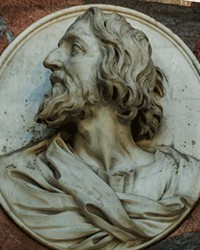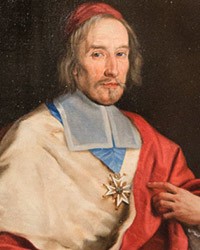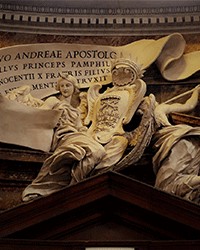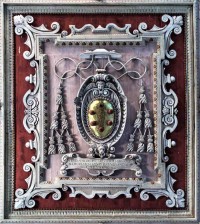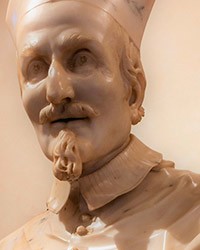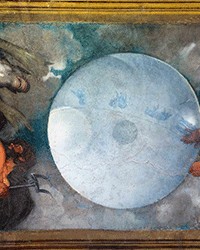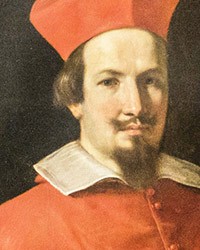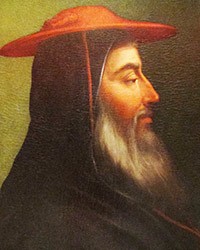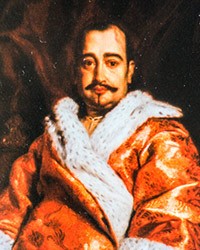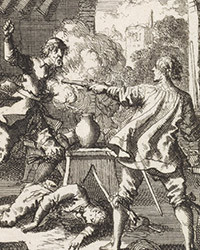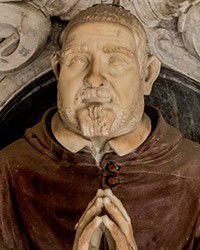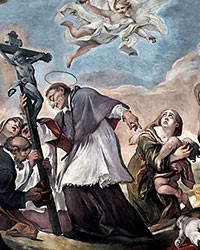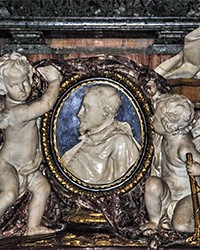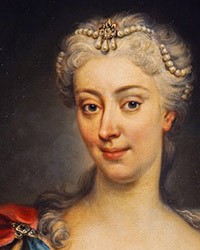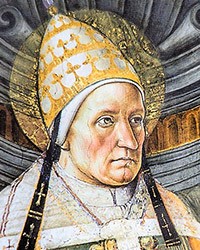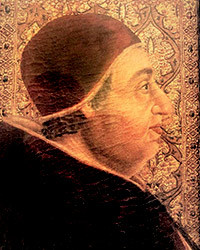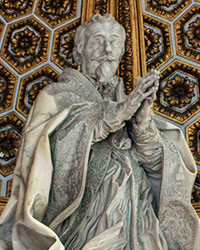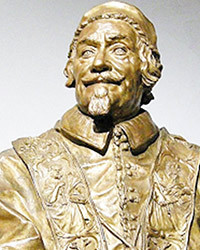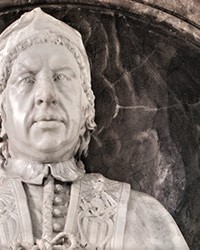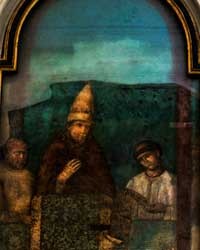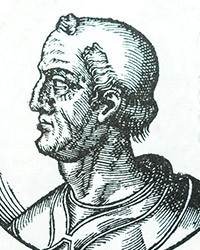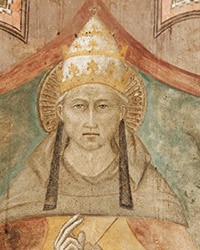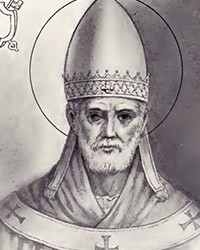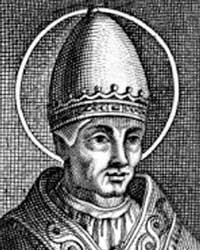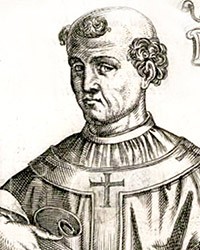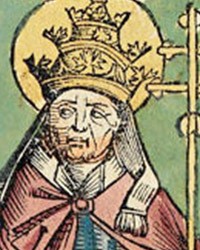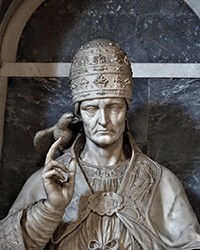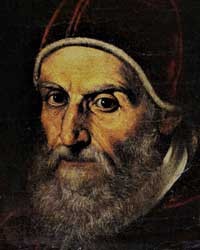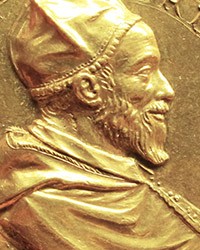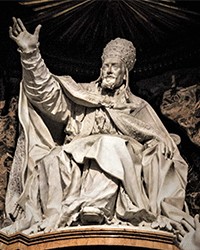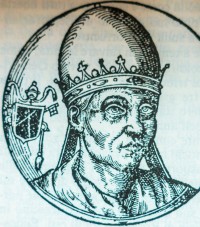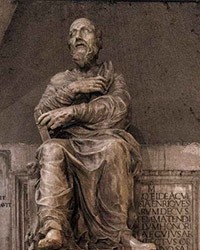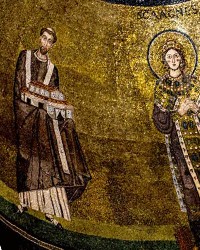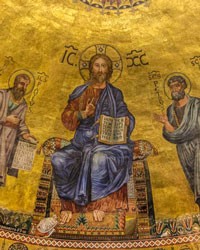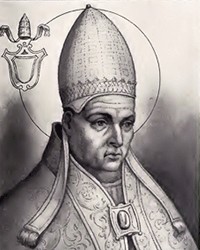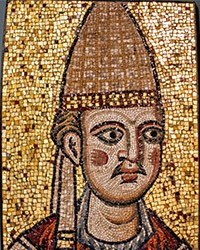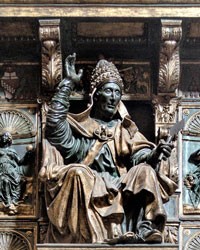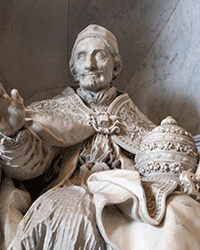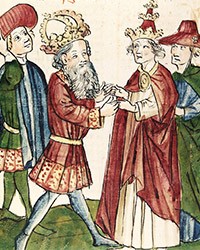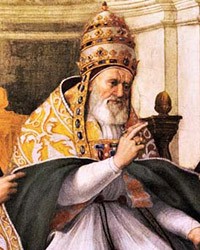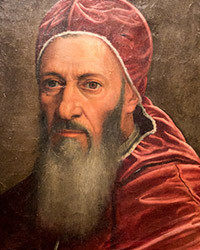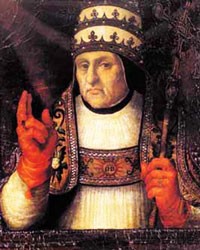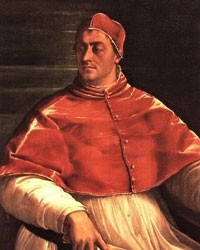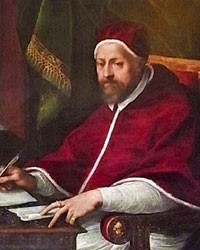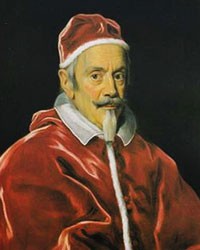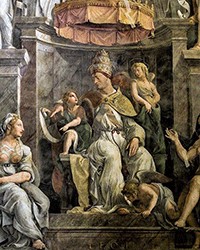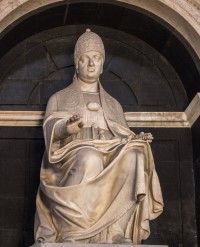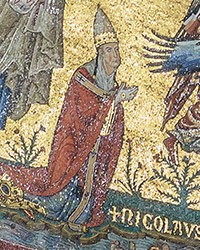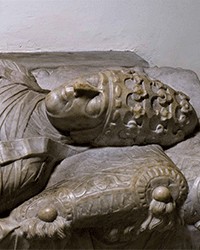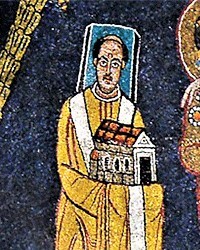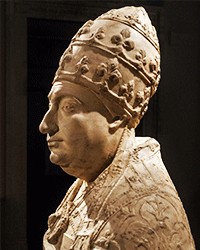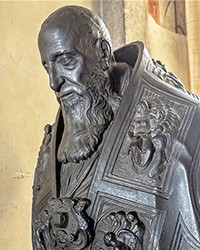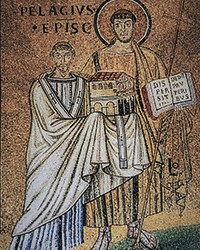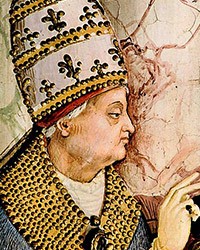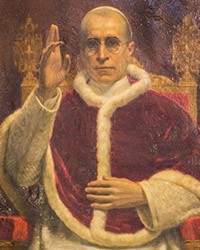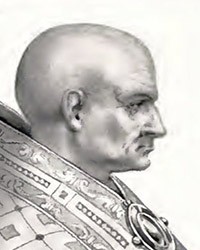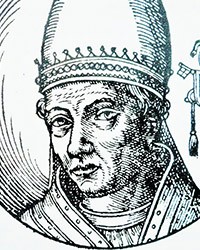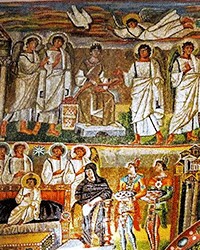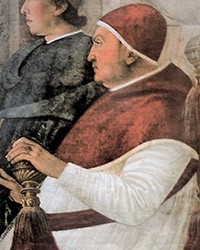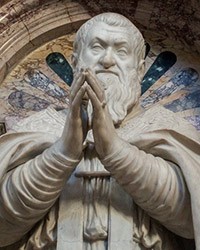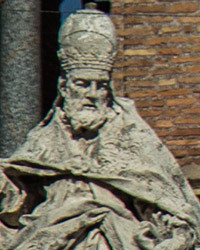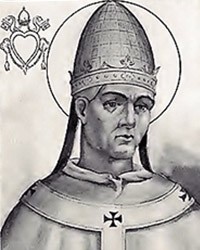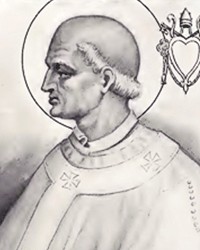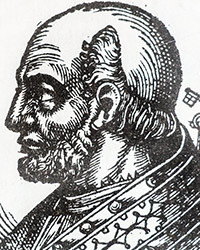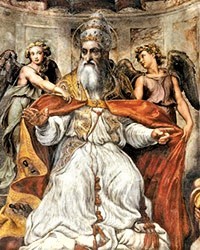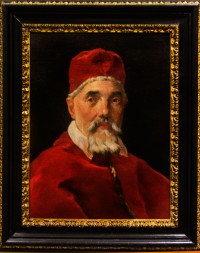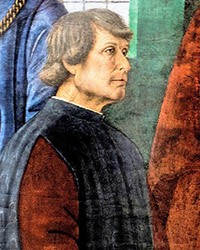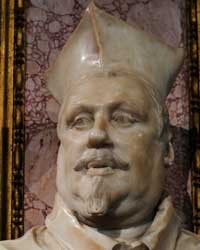
POSTACIE Popes and their associates

POSTACIE Popes and their associates
Popes and their associates
Agostino Chigi (1466–1520) – a financial genius, an enthusiast of lavish lifestyle and art
Antonio Barberini (1607–1671) – one of the three “musketeers” of Urban VIII
Camillo Francesco Maria Pamphilj (1622–1666) – an arthritis-filled expiation of the papal nephew
Ferdinando I de’ Medici (1549–1609) – a lover of antiquity, who avoided papal disfavor
Francesco Barberini (1597–1679) – papal nepot, admirer of books and art, defender of Galileo
Francesco Maria del Monte (1549–1626) – a cardinal full of passion for alchemy, music and painting
Cardinal Bernardino Spada (1594–1661) – a dream about the grandeur of his own family
Cardinal Bessarion (1403?–1473) – the one who wanted to save Constantinople
Cardinal Innocenzo Ciocchi del Monte (1532–1577) – the pope’s favorite with criminal inclinations
Charles Borromeo (1538–1584) – an extraordinary nepot, critic and saint of the Church
Ludovico Ludovisi (1595–1632) – lover of Antiquity and an extremely bright papal nepot
Olimpia Maidalchini (1591–1657) – a very entrepreneurial papal sister-in-law
Pope Alexander VI (1431–1503) – an ambitious strategist with a great heart for women
Pope Alexander VII (1599–1667) – a great constructor with a lead coffin in his bedroom
Pope Alexander VIII (1610–1691), Pietro Vito Ottoboni – a profligate enthusiast of old books
Pope Benedict XIV (1675–1758) – modernizer, reformer, a fierce enemy of Jews and Freemasons
Pope Boniface VIII (1235?–1303), Benedetto Caetani – pope from the eighth circle of hell
Pope Celestine I (?–432) – philosopher striving for the divinity of the mother of Jesus
Pope Damasus I (approx. 305–384) – the one who changed the face of the Roman Church forever
Pope Felix III (Felix II) (?–492) – a saintly, uncompromising and strict pope
Pope Gregory I the Great (approx. 540–604) – a monk by conviction, who changed the face of the Church for centuries
Pope Gregory XIII (1502–1585) – a tireless counter-reformer and an efficient reformer of the calendar
Pope Gregory XV (1554–1623) – a sickly and phlegmatic protector of the Jesuits
Pope Honorius I (?–638), a fallible pontifex maximus, in addition to being a heretic
Pope Honorius III (1150–1227) – a significant Church strategist and an uncompromising ruler
Pope Innocent I (? – 417) – a charismatic leader of the Church in times of chaos and uncertainty
Pope Innocent VIII (1432–1492) – sickly, yet resourceful protector of his own children
Pope Innocent XI (1611–1689) – a strict reformer, moralist and subduer of art
Pope Innocent XII (1615–1700) – an exemplary shepherd and a protector of castrates
Pope John XII (?937–964) – meaning the one who was mortally wounded by the devil in the bed of a married woman
Pope Julius II (1443–1513) – a valiant ruler, courageous politician and a great protector of art
Pope Callixtus III (1378–1458) – a disliked aesthetic from the Pyrenean Peninsula
Pope Clement VII (1478–1534) – a powerless politician and a firm protector of artists
Pope Clement VIII (1536–1605) – an enemy of nudity, a pious and kind despot
Pope Leo I the Great (400?–461) – defender of Rome and the man behind the power of the Church
Pope Leo X (1475–1521) – a generous patron of art and an enthusiast of parties and feasts
Pope Nicholas V (1397–1455) – the one, who made art into a foundation of faith
Pope Paul III (1468–1549) – an uncompromising patron of artists and his own family
Pope Paul V (1552–1621) – a generous funder and a foresighted city manager
Pope Pelagius II (?–590) – a protector of the needy and of Gregory the Great
Pope Stephen VI (? – 897) – a story of the battle between the pope and a cadaver
Pope Sixtus IV (1414–1484) – a man of Renaissance and the creator of a new Rome
Pope Urban I (? – 230) – the beginning of the historical policy of the Church
Zgodnie z art. 13 ust. 1 i ust. 2 rozporządzenia Parlamentu Europejskiego i Rady (UE) 2016/679 z 27 kwietnia 2016 r. w sprawie ochrony osób fizycznych w związku z przetwarzaniem danych osobowych i w sprawie swobodnego przepływu takich danych oraz uchylenia dyrektywy 95/46/WE (RODO), informujemy, że Administratorem Pani/Pana danych osobowych jest firma: Econ-sk GmbH, Billbrookdeich 103, 22113 Hamburg, Niemcy
Przetwarzanie Pani/Pana danych osobowych będzie się odbywać na podstawie art. 6 RODO i w celu marketingowym Administrator powołuje się na prawnie uzasadniony interes, którym jest zbieranie danych statystycznych i analizowanie ruchu na stronie internetowej. Podanie danych osobowych na stronie internetowej http://roma-nonpertutti.com/ jest dobrowolne.
| Params | |
|---|---|
| 0 | |
| 1 | |
| 2 | |
| 3 | |
| 4 | |
| 5 | |
| 6 | |
| 7 | |
| 8 | |
| 9 | |
| Params | |
|---|---|
| 0 | |
| 1 | |
| 2 | |
| 3 | |
| 4 | |
| 5 | |
| 6 | |
| 7 | |
| 8 | |
| 9 | |
| 10 | |
| 11 | |
| 12 | |
| 13 | |
| 14 | |
| 15 | |
| 16 | |
| Params | |
|---|---|
| 0 | |
| 1 | |
| 2 | |
| 3 | |
| 4 | |
| 5 | |
| 6 | |
| 7 | |
| 8 | |
| 9 | |
| 10 | |
| 11 | |
| 12 | |
| 13 | |
| 14 | |
| 15 | |
| 16 | |
| Params | |
|---|---|
| 0 | |
| Params | |
|---|---|
| 0 | |
| 1 | |
| 2 | |
| 3 | |
| 4 | |
| 5 | |
| 6 | |
| 7 | |
| 8 | |
| 9 | |
| 10 | |
| 11 | |
| 12 | |
| 13 | |
| 14 | |
| 15 | |
| 16 | |
| Params | |
|---|---|
| 0 | |
| 1 | |
| 2 | |
| 3 | |
| 4 | |
| 5 | |
| 6 | |
| 7 | |
| 8 | |
| 9 | |
| 10 | |
| 11 | |
| 12 | |
| 13 | |
| 14 | |
| 15 | |
| 16 | |
| Params | |
|---|---|
| 0 | |
| 1 | |
| 2 | |
| 3 | |
| 4 | |
| 5 | |
| 6 | |
| 7 | |
| 8 | |
| 9 | |
| 10 | |
| 11 | |
| 12 | |
| 13 | |
| 14 | |
| 15 | |
| 16 | |
| Params | |
|---|---|
| 0 | |
| 1 | |
| 2 | |
| 3 | |
| 4 | |
| 5 | |
| 6 | |
| 7 | |
| 8 | |
| 9 | |
| 10 | |
| 11 | |
| 12 | |
| 13 | |
| 14 | |
| 15 | |
| 16 | |
| 17 | |
| 18 | |
| 19 | |
| 20 | |
| 21 | |
| 22 | |
select * from `articles_categories` where (`parent_id` is null and `status` = 'ACTIVE')4.02msbaza5943_roma| Metadata | |
|---|---|
| Bindings |
|
| Hints |
|
select * from `attributes` where (`table` = 'articles_categories')510μsbaza5943_roma| Metadata | |
|---|---|
| Bindings |
|
| Hints |
|
select * from `attributes_varchar` where `attribute_id` = '1' and `entity_id` = '1' and `lang` = 'en'360μsbaza5943_roma| Metadata | |
|---|---|
| Bindings |
|
| Hints |
|
select * from `articles_categories` where (`parent_id` = '1' and `status` = 'ACTIVE')400μsbaza5943_roma| Metadata | |
|---|---|
| Bindings |
|
| Hints |
|
select * from `attributes` where (`table` = 'articles_categories')360μsbaza5943_roma| Metadata | |
|---|---|
| Bindings |
|
| Hints |
|
select * from `attributes_varchar` where `attribute_id` = '1' and `entity_id` = '2' and `lang` = 'en'490μsbaza5943_roma| Metadata | |
|---|---|
| Bindings |
|
| Hints |
|
select * from `articles_categories` where (`parent_id` = '2' and `status` = 'ACTIVE')480μsbaza5943_roma| Metadata | |
|---|---|
| Bindings |
|
| Hints |
|
select * from `attributes` where (`table` = 'articles_categories')360μsbaza5943_roma| Metadata | |
|---|---|
| Bindings |
|
| Hints |
|
select * from `attributes_varchar` where `attribute_id` = '1' and `entity_id` = '3' and `lang` = 'en'420μsbaza5943_roma| Metadata | |
|---|---|
| Bindings |
|
| Hints |
|
select * from `articles_categories` where (`parent_id` = '3' and `status` = 'ACTIVE')430μsbaza5943_roma| Metadata | |
|---|---|
| Bindings |
|
| Hints |
|
select * from `attributes` where (`table` = 'articles_categories')350μsbaza5943_roma| Metadata | |
|---|---|
| Bindings |
|
| Hints |
|
select * from `attributes_varchar` where `attribute_id` = '1' and `entity_id` = '4' and `lang` = 'en'400μsbaza5943_roma| Metadata | |
|---|---|
| Bindings |
|
| Hints |
|
select * from `articles_categories` where (`parent_id` = '4' and `status` = 'ACTIVE')390μsbaza5943_roma| Metadata | |
|---|---|
| Bindings |
|
| Hints |
|
select * from `attributes` where (`table` = 'articles_categories')410μsbaza5943_roma| Metadata | |
|---|---|
| Bindings |
|
| Hints |
|
select * from `attributes_varchar` where `attribute_id` = '1' and `entity_id` = '5' and `lang` = 'en'360μsbaza5943_roma| Metadata | |
|---|---|
| Bindings |
|
| Hints |
|
select * from `articles_categories` where (`parent_id` = '5' and `status` = 'ACTIVE')430μsbaza5943_roma| Metadata | |
|---|---|
| Bindings |
|
| Hints |
|
select * from `attributes` where (`table` = 'articles_categories')420μsbaza5943_roma| Metadata | |
|---|---|
| Bindings |
|
| Hints |
|
select * from `attributes_varchar` where `attribute_id` = '1' and `entity_id` = '8' and `lang` = 'en'440μsbaza5943_roma| Metadata | |
|---|---|
| Bindings |
|
| Hints |
|
select * from `articles_categories` where (`parent_id` = '8' and `status` = 'ACTIVE')440μsbaza5943_roma| Metadata | |
|---|---|
| Bindings |
|
| Hints |
|
select * from `attributes` where (`table` = 'articles_categories')350μsbaza5943_roma| Metadata | |
|---|---|
| Bindings |
|
| Hints |
|
select * from `attributes_varchar` where `attribute_id` = '1' and `entity_id` = '9' and `lang` = 'en'360μsbaza5943_roma| Metadata | |
|---|---|
| Bindings |
|
| Hints |
|
select * from `articles_categories` where (`parent_id` = '9' and `status` = 'ACTIVE')440μsbaza5943_roma| Metadata | |
|---|---|
| Bindings |
|
| Hints |
|
select * from `attributes` where (`table` = 'articles_categories')410μsbaza5943_roma| Metadata | |
|---|---|
| Bindings |
|
| Hints |
|
select * from `attributes_varchar` where `attribute_id` = '1' and `entity_id` = '10' and `lang` = 'en'390μsbaza5943_roma| Metadata | |
|---|---|
| Bindings |
|
| Hints |
|
select * from `articles_categories` where (`parent_id` = '10' and `status` = 'ACTIVE')420μsbaza5943_roma| Metadata | |
|---|---|
| Bindings |
|
| Hints |
|
select * from `attributes` where (`table` = 'articles_categories')380μsbaza5943_roma| Metadata | |
|---|---|
| Bindings |
|
| Hints |
|
select * from `attributes_varchar` where `attribute_id` = '1' and `entity_id` = '11' and `lang` = 'en'400μsbaza5943_roma| Metadata | |
|---|---|
| Bindings |
|
| Hints |
|
select * from `articles_categories` where (`parent_id` = '11' and `status` = 'ACTIVE')410μsbaza5943_roma| Metadata | |
|---|---|
| Bindings |
|
| Hints |
|
select * from `attributes` where (`table` = 'articles_categories')360μsbaza5943_roma| Metadata | |
|---|---|
| Bindings |
|
| Hints |
|
select * from `attributes_varchar` where `attribute_id` = '1' and `entity_id` = '12' and `lang` = 'en'470μsbaza5943_roma| Metadata | |
|---|---|
| Bindings |
|
| Hints |
|
select * from `articles_categories` where (`parent_id` = '12' and `status` = 'ACTIVE')360μsbaza5943_roma| Metadata | |
|---|---|
| Bindings |
|
| Hints |
|
select * from `attributes` where (`table` = 'articles_categories')380μsbaza5943_roma| Metadata | |
|---|---|
| Bindings |
|
| Hints |
|
select * from `attributes_varchar` where `attribute_id` = '1' and `entity_id` = '13' and `lang` = 'en'400μsbaza5943_roma| Metadata | |
|---|---|
| Bindings |
|
| Hints |
|
select * from `articles_categories` where (`parent_id` = '13' and `status` = 'ACTIVE')470μsbaza5943_roma| Metadata | |
|---|---|
| Bindings |
|
| Hints |
|
select * from `attributes` where (`table` = 'articles_categories')620μsbaza5943_roma| Metadata | |
|---|---|
| Bindings |
|
| Hints |
|
select * from `attributes_varchar` where `attribute_id` = '1' and `entity_id` = '14' and `lang` = 'en'390μsbaza5943_roma| Metadata | |
|---|---|
| Bindings |
|
| Hints |
|
select * from `articles_categories` where (`parent_id` = '14' and `status` = 'ACTIVE')400μsbaza5943_roma| Metadata | |
|---|---|
| Bindings |
|
| Hints |
|
select * from `attributes` where (`table` = 'articles_categories')400μsbaza5943_roma| Metadata | |
|---|---|
| Bindings |
|
| Hints |
|
select * from `attributes_varchar` where `attribute_id` = '1' and `entity_id` = '15' and `lang` = 'en'350μsbaza5943_roma| Metadata | |
|---|---|
| Bindings |
|
| Hints |
|
select * from `articles_categories` where (`parent_id` = '15' and `status` = 'ACTIVE')360μsbaza5943_roma| Metadata | |
|---|---|
| Bindings |
|
| Hints |
|
select * from `attributes` where (`table` = 'articles_categories')390μsbaza5943_roma| Metadata | |
|---|---|
| Bindings |
|
| Hints |
|
select * from `attributes_varchar` where `attribute_id` = '1' and `entity_id` = '16' and `lang` = 'en'450μsbaza5943_roma| Metadata | |
|---|---|
| Bindings |
|
| Hints |
|
select * from `articles_categories` where (`parent_id` = '16' and `status` = 'ACTIVE')450μsbaza5943_roma| Metadata | |
|---|---|
| Bindings |
|
| Hints |
|
select * from `attributes` where (`table` = 'articles_categories')410μsbaza5943_roma| Metadata | |
|---|---|
| Bindings |
|
| Hints |
|
select * from `attributes_varchar` where `attribute_id` = '1' and `entity_id` = '17' and `lang` = 'en'320μsbaza5943_roma| Metadata | |
|---|---|
| Bindings |
|
| Hints |
|
select * from `articles_categories` where (`parent_id` = '17' and `status` = 'ACTIVE')440μsbaza5943_roma| Metadata | |
|---|---|
| Bindings |
|
| Hints |
|
select * from `attributes` where (`table` = 'articles_categories')340μsbaza5943_roma| Metadata | |
|---|---|
| Bindings |
|
| Hints |
|
select * from `attributes_varchar` where `attribute_id` = '1' and `entity_id` = '18' and `lang` = 'en'400μsbaza5943_roma| Metadata | |
|---|---|
| Bindings |
|
| Hints |
|
select * from `articles_categories` where (`parent_id` = '18' and `status` = 'ACTIVE')460μsbaza5943_roma| Metadata | |
|---|---|
| Bindings |
|
| Hints |
|
select * from `attributes` where (`table` = 'articles_categories')350μsbaza5943_roma| Metadata | |
|---|---|
| Bindings |
|
| Hints |
|
select * from `attributes_varchar` where `attribute_id` = '1' and `entity_id` = '19' and `lang` = 'en'410μsbaza5943_roma| Metadata | |
|---|---|
| Bindings |
|
| Hints |
|
select * from `articles_categories` where (`parent_id` = '19' and `status` = 'ACTIVE')410μsbaza5943_roma| Metadata | |
|---|---|
| Bindings |
|
| Hints |
|
select * from `attributes` where (`table` = 'articles_categories')420μsbaza5943_roma| Metadata | |
|---|---|
| Bindings |
|
| Hints |
|
select * from `attributes_varchar` where `attribute_id` = '1' and `entity_id` = '20' and `lang` = 'en'400μsbaza5943_roma| Metadata | |
|---|---|
| Bindings |
|
| Hints |
|
select * from `articles_categories` where (`parent_id` = '20' and `status` = 'ACTIVE')360μsbaza5943_roma| Metadata | |
|---|---|
| Bindings |
|
| Hints |
|
select * from `attributes` where (`table` = 'articles_categories')370μsbaza5943_roma| Metadata | |
|---|---|
| Bindings |
|
| Hints |
|
select * from `attributes_varchar` where `attribute_id` = '1' and `entity_id` = '21' and `lang` = 'en'360μsbaza5943_roma| Metadata | |
|---|---|
| Bindings |
|
| Hints |
|
select * from `articles_categories` where (`parent_id` = '21' and `status` = 'ACTIVE')420μsbaza5943_roma| Metadata | |
|---|---|
| Bindings |
|
| Hints |
|
select * from `attributes` where (`table` = 'articles_categories')340μsbaza5943_roma| Metadata | |
|---|---|
| Bindings |
|
| Hints |
|
select * from `attributes_varchar` where `attribute_id` = '1' and `entity_id` = '22' and `lang` = 'en'400μsbaza5943_roma| Metadata | |
|---|---|
| Bindings |
|
| Hints |
|
select * from `articles_categories` where (`parent_id` = '22' and `status` = 'ACTIVE')360μsbaza5943_roma| Metadata | |
|---|---|
| Bindings |
|
| Hints |
|
select * from `attributes` where (`table` = 'articles_categories')430μsbaza5943_roma| Metadata | |
|---|---|
| Bindings |
|
| Hints |
|
select * from `attributes_varchar` where `attribute_id` = '1' and `entity_id` = '23' and `lang` = 'en'380μsbaza5943_roma| Metadata | |
|---|---|
| Bindings |
|
| Hints |
|
select * from `articles_categories` where (`parent_id` = '23' and `status` = 'ACTIVE')400μsbaza5943_roma| Metadata | |
|---|---|
| Bindings |
|
| Hints |
|
select * from `attributes` where (`table` = 'articles_categories')540μsbaza5943_roma| Metadata | |
|---|---|
| Bindings |
|
| Hints |
|
select * from `attributes_varchar` where `attribute_id` = '1' and `entity_id` = '24' and `lang` = 'en'370μsbaza5943_roma| Metadata | |
|---|---|
| Bindings |
|
| Hints |
|
select * from `articles_categories` where (`parent_id` = '24' and `status` = 'ACTIVE')370μsbaza5943_roma| Metadata | |
|---|---|
| Bindings |
|
| Hints |
|
select * from `attributes` where (`table` = 'articles_categories')380μsbaza5943_roma| Metadata | |
|---|---|
| Bindings |
|
| Hints |
|
select * from `attributes_varchar` where `attribute_id` = '1' and `entity_id` = '25' and `lang` = 'en'360μsbaza5943_roma| Metadata | |
|---|---|
| Bindings |
|
| Hints |
|
select * from `articles_categories` where (`parent_id` = '25' and `status` = 'ACTIVE')360μsbaza5943_roma| Metadata | |
|---|---|
| Bindings |
|
| Hints |
|
select * from `attributes` where (`table` = 'articles_categories')370μsbaza5943_roma| Metadata | |
|---|---|
| Bindings |
|
| Hints |
|
select * from `attributes_varchar` where `attribute_id` = '1' and `entity_id` = '26' and `lang` = 'en'420μsbaza5943_roma| Metadata | |
|---|---|
| Bindings |
|
| Hints |
|
select * from `articles_categories` where (`parent_id` = '26' and `status` = 'ACTIVE')370μsbaza5943_roma| Metadata | |
|---|---|
| Bindings |
|
| Hints |
|
select * from `attributes` where (`table` = 'articles_categories')360μsbaza5943_roma| Metadata | |
|---|---|
| Bindings |
|
| Hints |
|
select * from `attributes_varchar` where `attribute_id` = '1' and `entity_id` = '27' and `lang` = 'en'370μsbaza5943_roma| Metadata | |
|---|---|
| Bindings |
|
| Hints |
|
select * from `articles_categories` where (`parent_id` = '27' and `status` = 'ACTIVE')430μsbaza5943_roma| Metadata | |
|---|---|
| Bindings |
|
| Hints |
|
select * from `attributes` where (`table` = 'articles_categories')340μsbaza5943_roma| Metadata | |
|---|---|
| Bindings |
|
| Hints |
|
select * from `attributes_varchar` where `attribute_id` = '1' and `entity_id` = '28' and `lang` = 'en'360μsbaza5943_roma| Metadata | |
|---|---|
| Bindings |
|
| Hints |
|
select * from `articles_categories` where (`parent_id` = '28' and `status` = 'ACTIVE')470μsbaza5943_roma| Metadata | |
|---|---|
| Bindings |
|
| Hints |
|
select * from `attributes` where (`table` = 'articles_categories')390μsbaza5943_roma| Metadata | |
|---|---|
| Bindings |
|
| Hints |
|
select * from `attributes_varchar` where `attribute_id` = '1' and `entity_id` = '29' and `lang` = 'en'480μsbaza5943_roma| Metadata | |
|---|---|
| Bindings |
|
| Hints |
|
select * from `articles_categories` where (`parent_id` = '29' and `status` = 'ACTIVE')440μsbaza5943_roma| Metadata | |
|---|---|
| Bindings |
|
| Hints |
|
select * from `settings`380μsbaza5943_roma| Metadata | |
|---|---|
| Hints |
|
select * from `articles_categories` where `articles_categories`.`id` = '12' limit 1420μsbaza5943_roma| Metadata | |
|---|---|
| Bindings |
|
| Hints |
|
select * from `articles` where exists (select * from `articles_categories` inner join `articles_categories_join` on `articles_categories`.`id` = `articles_categories_join`.`category_id` where `articles`.`id` = `articles_categories_join`.`article_id` and `status` = 'ACTIVE') and `articles`.`deleted_at` is null order by `created_at` desc limit 3480μsbaza5943_roma| Metadata | |
|---|---|
| Bindings |
|
| Hints |
|
select * from `attributes` where (`table` = 'articles')450μsbaza5943_roma| Metadata | |
|---|---|
| Bindings |
|
| Hints |
|
select * from `attributes_varchar` where `attribute_id` = '2' and `entity_id` = '556' and `lang` = 'en'420μsbaza5943_roma| Metadata | |
|---|---|
| Bindings |
|
| Hints |
|
select * from `attributes_text` where `attribute_id` = '3' and `entity_id` = '556' and `lang` = 'en'520μsbaza5943_roma| Metadata | |
|---|---|
| Bindings |
|
| Hints |
|
select * from `attributes_text` where `attribute_id` = '6' and `entity_id` = '556' and `lang` = 'en'410μsbaza5943_roma| Metadata | |
|---|---|
| Bindings |
|
| Hints |
|
select * from `urls` where `table` = 'articles' and `entity_id` = '556'440μsbaza5943_roma| Metadata | |
|---|---|
| Bindings |
|
| Hints |
|
select * from `articles_photos` where `article_id` = '556'440μsbaza5943_roma| Metadata | |
|---|---|
| Bindings |
|
| Hints |
|
select * from `attributes` where (`table` = 'articles_photos')320μsbaza5943_roma| Metadata | |
|---|---|
| Bindings |
|
| Hints |
|
select * from `attributes_varchar` where `attribute_id` = '5' and `entity_id` = '7979' and `lang` = 'en'340μsbaza5943_roma| Metadata | |
|---|---|
| Bindings |
|
| Hints |
|
select * from `attributes` where (`table` = 'articles_photos')430μsbaza5943_roma| Metadata | |
|---|---|
| Bindings |
|
| Hints |
|
select * from `attributes_varchar` where `attribute_id` = '5' and `entity_id` = '7980' and `lang` = 'en'350μsbaza5943_roma| Metadata | |
|---|---|
| Bindings |
|
| Hints |
|
select * from `attributes` where (`table` = 'articles_photos')360μsbaza5943_roma| Metadata | |
|---|---|
| Bindings |
|
| Hints |
|
select * from `attributes_varchar` where `attribute_id` = '5' and `entity_id` = '7982' and `lang` = 'en'390μsbaza5943_roma| Metadata | |
|---|---|
| Bindings |
|
| Hints |
|
select * from `articles_photos` where `article_id` = '556' and `main_photo` = '1'430μsbaza5943_roma| Metadata | |
|---|---|
| Bindings |
|
| Hints |
|
select * from `attributes` where (`table` = 'articles_photos')360μsbaza5943_roma| Metadata | |
|---|---|
| Bindings |
|
| Hints |
|
select * from `attributes_varchar` where `attribute_id` = '5' and `entity_id` = '7979' and `lang` = 'en'400μsbaza5943_roma| Metadata | |
|---|---|
| Bindings |
|
| Hints |
|
select * from `attributes` where (`table` = 'articles')350μsbaza5943_roma| Metadata | |
|---|---|
| Bindings |
|
| Hints |
|
select * from `attributes_varchar` where `attribute_id` = '2' and `entity_id` = '555' and `lang` = 'en'370μsbaza5943_roma| Metadata | |
|---|---|
| Bindings |
|
| Hints |
|
select * from `attributes_text` where `attribute_id` = '3' and `entity_id` = '555' and `lang` = 'en'370μsbaza5943_roma| Metadata | |
|---|---|
| Bindings |
|
| Hints |
|
select * from `attributes_text` where `attribute_id` = '6' and `entity_id` = '555' and `lang` = 'en'420μsbaza5943_roma| Metadata | |
|---|---|
| Bindings |
|
| Hints |
|
select * from `urls` where `table` = 'articles' and `entity_id` = '555'370μsbaza5943_roma| Metadata | |
|---|---|
| Bindings |
|
| Hints |
|
select * from `articles_photos` where `article_id` = '555'620μsbaza5943_roma| Metadata | |
|---|---|
| Bindings |
|
| Hints |
|
select * from `attributes` where (`table` = 'articles_photos')440μsbaza5943_roma| Metadata | |
|---|---|
| Bindings |
|
| Hints |
|
select * from `attributes_varchar` where `attribute_id` = '5' and `entity_id` = '7956' and `lang` = 'en'380μsbaza5943_roma| Metadata | |
|---|---|
| Bindings |
|
| Hints |
|
select * from `attributes` where (`table` = 'articles_photos')370μsbaza5943_roma| Metadata | |
|---|---|
| Bindings |
|
| Hints |
|
select * from `attributes_varchar` where `attribute_id` = '5' and `entity_id` = '7957' and `lang` = 'en'480μsbaza5943_roma| Metadata | |
|---|---|
| Bindings |
|
| Hints |
|
select * from `attributes` where (`table` = 'articles_photos')440μsbaza5943_roma| Metadata | |
|---|---|
| Bindings |
|
| Hints |
|
select * from `attributes_varchar` where `attribute_id` = '5' and `entity_id` = '7958' and `lang` = 'en'510μsbaza5943_roma| Metadata | |
|---|---|
| Bindings |
|
| Hints |
|
select * from `attributes` where (`table` = 'articles_photos')400μsbaza5943_roma| Metadata | |
|---|---|
| Bindings |
|
| Hints |
|
select * from `attributes_varchar` where `attribute_id` = '5' and `entity_id` = '7959' and `lang` = 'en'370μsbaza5943_roma| Metadata | |
|---|---|
| Bindings |
|
| Hints |
|
select * from `attributes` where (`table` = 'articles_photos')510μsbaza5943_roma| Metadata | |
|---|---|
| Bindings |
|
| Hints |
|
select * from `attributes_varchar` where `attribute_id` = '5' and `entity_id` = '7960' and `lang` = 'en'390μsbaza5943_roma| Metadata | |
|---|---|
| Bindings |
|
| Hints |
|
select * from `attributes` where (`table` = 'articles_photos')390μsbaza5943_roma| Metadata | |
|---|---|
| Bindings |
|
| Hints |
|
select * from `attributes_varchar` where `attribute_id` = '5' and `entity_id` = '7962' and `lang` = 'en'370μsbaza5943_roma| Metadata | |
|---|---|
| Bindings |
|
| Hints |
|
select * from `attributes` where (`table` = 'articles_photos')350μsbaza5943_roma| Metadata | |
|---|---|
| Bindings |
|
| Hints |
|
select * from `attributes_varchar` where `attribute_id` = '5' and `entity_id` = '7963' and `lang` = 'en'380μsbaza5943_roma| Metadata | |
|---|---|
| Bindings |
|
| Hints |
|
select * from `attributes` where (`table` = 'articles_photos')340μsbaza5943_roma| Metadata | |
|---|---|
| Bindings |
|
| Hints |
|
select * from `attributes_varchar` where `attribute_id` = '5' and `entity_id` = '7964' and `lang` = 'en'420μsbaza5943_roma| Metadata | |
|---|---|
| Bindings |
|
| Hints |
|
select * from `attributes` where (`table` = 'articles_photos')390μsbaza5943_roma| Metadata | |
|---|---|
| Bindings |
|
| Hints |
|
select * from `attributes_varchar` where `attribute_id` = '5' and `entity_id` = '7965' and `lang` = 'en'370μsbaza5943_roma| Metadata | |
|---|---|
| Bindings |
|
| Hints |
|
select * from `attributes` where (`table` = 'articles_photos')430μsbaza5943_roma| Metadata | |
|---|---|
| Bindings |
|
| Hints |
|
select * from `attributes_varchar` where `attribute_id` = '5' and `entity_id` = '7966' and `lang` = 'en'430μsbaza5943_roma| Metadata | |
|---|---|
| Bindings |
|
| Hints |
|
select * from `attributes` where (`table` = 'articles_photos')360μsbaza5943_roma| Metadata | |
|---|---|
| Bindings |
|
| Hints |
|
select * from `attributes_varchar` where `attribute_id` = '5' and `entity_id` = '7967' and `lang` = 'en'370μsbaza5943_roma| Metadata | |
|---|---|
| Bindings |
|
| Hints |
|
select * from `attributes` where (`table` = 'articles_photos')400μsbaza5943_roma| Metadata | |
|---|---|
| Bindings |
|
| Hints |
|
select * from `attributes_varchar` where `attribute_id` = '5' and `entity_id` = '7968' and `lang` = 'en'430μsbaza5943_roma| Metadata | |
|---|---|
| Bindings |
|
| Hints |
|
select * from `attributes` where (`table` = 'articles_photos')370μsbaza5943_roma| Metadata | |
|---|---|
| Bindings |
|
| Hints |
|
select * from `attributes_varchar` where `attribute_id` = '5' and `entity_id` = '7969' and `lang` = 'en'390μsbaza5943_roma| Metadata | |
|---|---|
| Bindings |
|
| Hints |
|
select * from `attributes` where (`table` = 'articles_photos')390μsbaza5943_roma| Metadata | |
|---|---|
| Bindings |
|
| Hints |
|
select * from `attributes_varchar` where `attribute_id` = '5' and `entity_id` = '7970' and `lang` = 'en'540μsbaza5943_roma| Metadata | |
|---|---|
| Bindings |
|
| Hints |
|
select * from `attributes` where (`table` = 'articles_photos')380μsbaza5943_roma| Metadata | |
|---|---|
| Bindings |
|
| Hints |
|
select * from `attributes_varchar` where `attribute_id` = '5' and `entity_id` = '7971' and `lang` = 'en'390μsbaza5943_roma| Metadata | |
|---|---|
| Bindings |
|
| Hints |
|
select * from `attributes` where (`table` = 'articles_photos')340μsbaza5943_roma| Metadata | |
|---|---|
| Bindings |
|
| Hints |
|
select * from `attributes_varchar` where `attribute_id` = '5' and `entity_id` = '7972' and `lang` = 'en'550μsbaza5943_roma| Metadata | |
|---|---|
| Bindings |
|
| Hints |
|
select * from `attributes` where (`table` = 'articles_photos')340μsbaza5943_roma| Metadata | |
|---|---|
| Bindings |
|
| Hints |
|
select * from `attributes_varchar` where `attribute_id` = '5' and `entity_id` = '7973' and `lang` = 'en'390μsbaza5943_roma| Metadata | |
|---|---|
| Bindings |
|
| Hints |
|
select * from `attributes` where (`table` = 'articles_photos')350μsbaza5943_roma| Metadata | |
|---|---|
| Bindings |
|
| Hints |
|
select * from `attributes_varchar` where `attribute_id` = '5' and `entity_id` = '7974' and `lang` = 'en'500μsbaza5943_roma| Metadata | |
|---|---|
| Bindings |
|
| Hints |
|
select * from `attributes` where (`table` = 'articles_photos')350μsbaza5943_roma| Metadata | |
|---|---|
| Bindings |
|
| Hints |
|
select * from `attributes_varchar` where `attribute_id` = '5' and `entity_id` = '7975' and `lang` = 'en'400μsbaza5943_roma| Metadata | |
|---|---|
| Bindings |
|
| Hints |
|
select * from `attributes` where (`table` = 'articles_photos')380μsbaza5943_roma| Metadata | |
|---|---|
| Bindings |
|
| Hints |
|
select * from `attributes_varchar` where `attribute_id` = '5' and `entity_id` = '7976' and `lang` = 'en'340μsbaza5943_roma| Metadata | |
|---|---|
| Bindings |
|
| Hints |
|
select * from `articles_photos` where `article_id` = '555' and `main_photo` = '1'380μsbaza5943_roma| Metadata | |
|---|---|
| Bindings |
|
| Hints |
|
select * from `attributes` where (`table` = 'articles_photos')370μsbaza5943_roma| Metadata | |
|---|---|
| Bindings |
|
| Hints |
|
select * from `attributes_varchar` where `attribute_id` = '5' and `entity_id` = '7974' and `lang` = 'en'420μsbaza5943_roma| Metadata | |
|---|---|
| Bindings |
|
| Hints |
|
select * from `attributes` where (`table` = 'articles')390μsbaza5943_roma| Metadata | |
|---|---|
| Bindings |
|
| Hints |
|
select * from `attributes_varchar` where `attribute_id` = '2' and `entity_id` = '554' and `lang` = 'en'380μsbaza5943_roma| Metadata | |
|---|---|
| Bindings |
|
| Hints |
|
select * from `attributes_text` where `attribute_id` = '3' and `entity_id` = '554' and `lang` = 'en'350μsbaza5943_roma| Metadata | |
|---|---|
| Bindings |
|
| Hints |
|
select * from `attributes_text` where `attribute_id` = '6' and `entity_id` = '554' and `lang` = 'en'410μsbaza5943_roma| Metadata | |
|---|---|
| Bindings |
|
| Hints |
|
select * from `urls` where `table` = 'articles' and `entity_id` = '554'370μsbaza5943_roma| Metadata | |
|---|---|
| Bindings |
|
| Hints |
|
select * from `articles_photos` where `article_id` = '554'450μsbaza5943_roma| Metadata | |
|---|---|
| Bindings |
|
| Hints |
|
select * from `attributes` where (`table` = 'articles_photos')370μsbaza5943_roma| Metadata | |
|---|---|
| Bindings |
|
| Hints |
|
select * from `attributes_varchar` where `attribute_id` = '5' and `entity_id` = '7946' and `lang` = 'en'430μsbaza5943_roma| Metadata | |
|---|---|
| Bindings |
|
| Hints |
|
select * from `attributes` where (`table` = 'articles_photos')350μsbaza5943_roma| Metadata | |
|---|---|
| Bindings |
|
| Hints |
|
select * from `attributes_varchar` where `attribute_id` = '5' and `entity_id` = '7947' and `lang` = 'en'450μsbaza5943_roma| Metadata | |
|---|---|
| Bindings |
|
| Hints |
|
select * from `attributes` where (`table` = 'articles_photos')440μsbaza5943_roma| Metadata | |
|---|---|
| Bindings |
|
| Hints |
|
select * from `attributes_varchar` where `attribute_id` = '5' and `entity_id` = '7948' and `lang` = 'en'420μsbaza5943_roma| Metadata | |
|---|---|
| Bindings |
|
| Hints |
|
select * from `attributes` where (`table` = 'articles_photos')620μsbaza5943_roma| Metadata | |
|---|---|
| Bindings |
|
| Hints |
|
select * from `attributes_varchar` where `attribute_id` = '5' and `entity_id` = '7949' and `lang` = 'en'560μsbaza5943_roma| Metadata | |
|---|---|
| Bindings |
|
| Hints |
|
select * from `attributes` where (`table` = 'articles_photos')370μsbaza5943_roma| Metadata | |
|---|---|
| Bindings |
|
| Hints |
|
select * from `attributes_varchar` where `attribute_id` = '5' and `entity_id` = '7950' and `lang` = 'en'460μsbaza5943_roma| Metadata | |
|---|---|
| Bindings |
|
| Hints |
|
select * from `attributes` where (`table` = 'articles_photos')410μsbaza5943_roma| Metadata | |
|---|---|
| Bindings |
|
| Hints |
|
select * from `attributes_varchar` where `attribute_id` = '5' and `entity_id` = '7951' and `lang` = 'en'370μsbaza5943_roma| Metadata | |
|---|---|
| Bindings |
|
| Hints |
|
select * from `attributes` where (`table` = 'articles_photos')350μsbaza5943_roma| Metadata | |
|---|---|
| Bindings |
|
| Hints |
|
select * from `attributes_varchar` where `attribute_id` = '5' and `entity_id` = '7952' and `lang` = 'en'410μsbaza5943_roma| Metadata | |
|---|---|
| Bindings |
|
| Hints |
|
select * from `attributes` where (`table` = 'articles_photos')340μsbaza5943_roma| Metadata | |
|---|---|
| Bindings |
|
| Hints |
|
select * from `attributes_varchar` where `attribute_id` = '5' and `entity_id` = '7953' and `lang` = 'en'490μsbaza5943_roma| Metadata | |
|---|---|
| Bindings |
|
| Hints |
|
select * from `attributes` where (`table` = 'articles_photos')360μsbaza5943_roma| Metadata | |
|---|---|
| Bindings |
|
| Hints |
|
select * from `attributes_varchar` where `attribute_id` = '5' and `entity_id` = '7954' and `lang` = 'en'370μsbaza5943_roma| Metadata | |
|---|---|
| Bindings |
|
| Hints |
|
select * from `attributes` where (`table` = 'articles_photos')430μsbaza5943_roma| Metadata | |
|---|---|
| Bindings |
|
| Hints |
|
select * from `attributes_varchar` where `attribute_id` = '5' and `entity_id` = '7955' and `lang` = 'en'410μsbaza5943_roma| Metadata | |
|---|---|
| Bindings |
|
| Hints |
|
select * from `articles_photos` where `article_id` = '554' and `main_photo` = '1'400μsbaza5943_roma| Metadata | |
|---|---|
| Bindings |
|
| Hints |
|
select * from `attributes` where (`table` = 'articles_photos')400μsbaza5943_roma| Metadata | |
|---|---|
| Bindings |
|
| Hints |
|
select * from `attributes_varchar` where `attribute_id` = '5' and `entity_id` = '7952' and `lang` = 'en'370μsbaza5943_roma| Metadata | |
|---|---|
| Bindings |
|
| Hints |
|
select * from `attributes` where `key` in ('name') and (`table` = 'articles_categories')370μsbaza5943_roma| Metadata | |
|---|---|
| Bindings |
|
| Hints |
|
select * from `attributes_varchar` where `attribute_id` = '1' and `entity_id` = '12' and `lang` = 'en'390μsbaza5943_roma| Metadata | |
|---|---|
| Bindings |
|
| Hints |
|
select * from `articles_categories` where `parent_id` = '12'410μsbaza5943_roma| Metadata | |
|---|---|
| Bindings |
|
| Hints |
|
select * from `articles_tags` where `status` = 'ACTIVE' and `category_id` = '12'390μsbaza5943_roma| Metadata | |
|---|---|
| Bindings |
|
| Hints |
|
select * from `attributes` where (`table` = 'articles_tags')370μsbaza5943_roma| Metadata | |
|---|---|
| Bindings |
|
| Hints |
|
select * from `attributes_varchar` where `attribute_id` = '4' and `entity_id` = '5' and `lang` = 'en'450μsbaza5943_roma| Metadata | |
|---|---|
| Bindings |
|
| Hints |
|
select * from `attributes` where (`table` = 'articles_tags')530μsbaza5943_roma| Metadata | |
|---|---|
| Bindings |
|
| Hints |
|
select * from `attributes_varchar` where `attribute_id` = '4' and `entity_id` = '6' and `lang` = 'en'370μsbaza5943_roma| Metadata | |
|---|---|
| Bindings |
|
| Hints |
|
select * from `articles_categories` where (`parent_id` = '12')450μsbaza5943_roma| Metadata | |
|---|---|
| Bindings |
|
| Hints |
|
select * from `articles` where exists (select * from `articles_categories` inner join `articles_categories_join` on `articles_categories`.`id` = `articles_categories_join`.`category_id` where `articles`.`id` = `articles_categories_join`.`article_id` and `category_id` in ('12') and `status` = 'ACTIVE') and `articles`.`deleted_at` is null order by `name` asc680μsbaza5943_roma| Metadata | |
|---|---|
| Bindings |
|
| Hints |
|
select * from `attributes` where (`table` = 'articles')360μsbaza5943_roma| Metadata | |
|---|---|
| Bindings |
|
| Hints |
|
select * from `attributes_varchar` where `attribute_id` = '2' and `entity_id` = '38' and `lang` = 'en'350μsbaza5943_roma| Metadata | |
|---|---|
| Bindings |
|
| Hints |
|
select * from `attributes_text` where `attribute_id` = '3' and `entity_id` = '38' and `lang` = 'en'570μsbaza5943_roma| Metadata | |
|---|---|
| Bindings |
|
| Hints |
|
select * from `attributes_text` where `attribute_id` = '6' and `entity_id` = '38' and `lang` = 'en'400μsbaza5943_roma| Metadata | |
|---|---|
| Bindings |
|
| Hints |
|
select * from `urls` where `table` = 'articles' and `entity_id` = '38'440μsbaza5943_roma| Metadata | |
|---|---|
| Bindings |
|
| Hints |
|
select * from `attributes` where (`table` = 'articles')350μsbaza5943_roma| Metadata | |
|---|---|
| Bindings |
|
| Hints |
|
select * from `attributes_varchar` where `attribute_id` = '2' and `entity_id` = '19' and `lang` = 'en'420μsbaza5943_roma| Metadata | |
|---|---|
| Bindings |
|
| Hints |
|
select * from `attributes_text` where `attribute_id` = '3' and `entity_id` = '19' and `lang` = 'en'510μsbaza5943_roma| Metadata | |
|---|---|
| Bindings |
|
| Hints |
|
select * from `attributes_text` where `attribute_id` = '6' and `entity_id` = '19' and `lang` = 'en'510μsbaza5943_roma| Metadata | |
|---|---|
| Bindings |
|
| Hints |
|
select * from `urls` where `table` = 'articles' and `entity_id` = '19'490μsbaza5943_roma| Metadata | |
|---|---|
| Bindings |
|
| Hints |
|
select * from `attributes` where (`table` = 'articles')380μsbaza5943_roma| Metadata | |
|---|---|
| Bindings |
|
| Hints |
|
select * from `attributes_varchar` where `attribute_id` = '2' and `entity_id` = '174' and `lang` = 'en'330μsbaza5943_roma| Metadata | |
|---|---|
| Bindings |
|
| Hints |
|
select * from `attributes_text` where `attribute_id` = '3' and `entity_id` = '174' and `lang` = 'en'480μsbaza5943_roma| Metadata | |
|---|---|
| Bindings |
|
| Hints |
|
select * from `attributes_text` where `attribute_id` = '6' and `entity_id` = '174' and `lang` = 'en'440μsbaza5943_roma| Metadata | |
|---|---|
| Bindings |
|
| Hints |
|
select * from `urls` where `table` = 'articles' and `entity_id` = '174'380μsbaza5943_roma| Metadata | |
|---|---|
| Bindings |
|
| Hints |
|
select * from `attributes` where (`table` = 'articles')360μsbaza5943_roma| Metadata | |
|---|---|
| Bindings |
|
| Hints |
|
select * from `attributes_varchar` where `attribute_id` = '2' and `entity_id` = '203' and `lang` = 'en'400μsbaza5943_roma| Metadata | |
|---|---|
| Bindings |
|
| Hints |
|
select * from `attributes_text` where `attribute_id` = '3' and `entity_id` = '203' and `lang` = 'en'450μsbaza5943_roma| Metadata | |
|---|---|
| Bindings |
|
| Hints |
|
select * from `attributes_text` where `attribute_id` = '6' and `entity_id` = '203' and `lang` = 'en'410μsbaza5943_roma| Metadata | |
|---|---|
| Bindings |
|
| Hints |
|
select * from `urls` where `table` = 'articles' and `entity_id` = '203'410μsbaza5943_roma| Metadata | |
|---|---|
| Bindings |
|
| Hints |
|
select * from `attributes` where (`table` = 'articles')370μsbaza5943_roma| Metadata | |
|---|---|
| Bindings |
|
| Hints |
|
select * from `attributes_varchar` where `attribute_id` = '2' and `entity_id` = '20' and `lang` = 'en'350μsbaza5943_roma| Metadata | |
|---|---|
| Bindings |
|
| Hints |
|
select * from `attributes_text` where `attribute_id` = '3' and `entity_id` = '20' and `lang` = 'en'550μsbaza5943_roma| Metadata | |
|---|---|
| Bindings |
|
| Hints |
|
select * from `attributes_text` where `attribute_id` = '6' and `entity_id` = '20' and `lang` = 'en'460μsbaza5943_roma| Metadata | |
|---|---|
| Bindings |
|
| Hints |
|
select * from `urls` where `table` = 'articles' and `entity_id` = '20'400μsbaza5943_roma| Metadata | |
|---|---|
| Bindings |
|
| Hints |
|
select * from `attributes` where (`table` = 'articles')390μsbaza5943_roma| Metadata | |
|---|---|
| Bindings |
|
| Hints |
|
select * from `attributes_varchar` where `attribute_id` = '2' and `entity_id` = '170' and `lang` = 'en'530μsbaza5943_roma| Metadata | |
|---|---|
| Bindings |
|
| Hints |
|
select * from `attributes_text` where `attribute_id` = '3' and `entity_id` = '170' and `lang` = 'en'420μsbaza5943_roma| Metadata | |
|---|---|
| Bindings |
|
| Hints |
|
select * from `attributes_text` where `attribute_id` = '6' and `entity_id` = '170' and `lang` = 'en'360μsbaza5943_roma| Metadata | |
|---|---|
| Bindings |
|
| Hints |
|
select * from `urls` where `table` = 'articles' and `entity_id` = '170'400μsbaza5943_roma| Metadata | |
|---|---|
| Bindings |
|
| Hints |
|
select * from `attributes` where (`table` = 'articles')330μsbaza5943_roma| Metadata | |
|---|---|
| Bindings |
|
| Hints |
|
select * from `attributes_varchar` where `attribute_id` = '2' and `entity_id` = '533' and `lang` = 'en'440μsbaza5943_roma| Metadata | |
|---|---|
| Bindings |
|
| Hints |
|
select * from `attributes_text` where `attribute_id` = '3' and `entity_id` = '533' and `lang` = 'en'680μsbaza5943_roma| Metadata | |
|---|---|
| Bindings |
|
| Hints |
|
select * from `attributes_text` where `attribute_id` = '6' and `entity_id` = '533' and `lang` = 'en'560μsbaza5943_roma| Metadata | |
|---|---|
| Bindings |
|
| Hints |
|
select * from `urls` where `table` = 'articles' and `entity_id` = '533'420μsbaza5943_roma| Metadata | |
|---|---|
| Bindings |
|
| Hints |
|
select * from `attributes` where (`table` = 'articles')400μsbaza5943_roma| Metadata | |
|---|---|
| Bindings |
|
| Hints |
|
select * from `attributes_varchar` where `attribute_id` = '2' and `entity_id` = '506' and `lang` = 'en'340μsbaza5943_roma| Metadata | |
|---|---|
| Bindings |
|
| Hints |
|
select * from `attributes_text` where `attribute_id` = '3' and `entity_id` = '506' and `lang` = 'en'560μsbaza5943_roma| Metadata | |
|---|---|
| Bindings |
|
| Hints |
|
select * from `attributes_text` where `attribute_id` = '6' and `entity_id` = '506' and `lang` = 'en'380μsbaza5943_roma| Metadata | |
|---|---|
| Bindings |
|
| Hints |
|
select * from `urls` where `table` = 'articles' and `entity_id` = '506'490μsbaza5943_roma| Metadata | |
|---|---|
| Bindings |
|
| Hints |
|
select * from `attributes` where (`table` = 'articles')370μsbaza5943_roma| Metadata | |
|---|---|
| Bindings |
|
| Hints |
|
select * from `attributes_varchar` where `attribute_id` = '2' and `entity_id` = '454' and `lang` = 'en'400μsbaza5943_roma| Metadata | |
|---|---|
| Bindings |
|
| Hints |
|
select * from `attributes_text` where `attribute_id` = '3' and `entity_id` = '454' and `lang` = 'en'480μsbaza5943_roma| Metadata | |
|---|---|
| Bindings |
|
| Hints |
|
select * from `attributes_text` where `attribute_id` = '6' and `entity_id` = '454' and `lang` = 'en'470μsbaza5943_roma| Metadata | |
|---|---|
| Bindings |
|
| Hints |
|
select * from `urls` where `table` = 'articles' and `entity_id` = '454'380μsbaza5943_roma| Metadata | |
|---|---|
| Bindings |
|
| Hints |
|
select * from `attributes` where (`table` = 'articles')340μsbaza5943_roma| Metadata | |
|---|---|
| Bindings |
|
| Hints |
|
select * from `attributes_varchar` where `attribute_id` = '2' and `entity_id` = '376' and `lang` = 'en'420μsbaza5943_roma| Metadata | |
|---|---|
| Bindings |
|
| Hints |
|
select * from `attributes_text` where `attribute_id` = '3' and `entity_id` = '376' and `lang` = 'en'430μsbaza5943_roma| Metadata | |
|---|---|
| Bindings |
|
| Hints |
|
select * from `attributes_text` where `attribute_id` = '6' and `entity_id` = '376' and `lang` = 'en'470μsbaza5943_roma| Metadata | |
|---|---|
| Bindings |
|
| Hints |
|
select * from `urls` where `table` = 'articles' and `entity_id` = '376'400μsbaza5943_roma| Metadata | |
|---|---|
| Bindings |
|
| Hints |
|
select * from `attributes` where (`table` = 'articles')340μsbaza5943_roma| Metadata | |
|---|---|
| Bindings |
|
| Hints |
|
select * from `attributes_varchar` where `attribute_id` = '2' and `entity_id` = '419' and `lang` = 'en'460μsbaza5943_roma| Metadata | |
|---|---|
| Bindings |
|
| Hints |
|
select * from `attributes_text` where `attribute_id` = '3' and `entity_id` = '419' and `lang` = 'en'520μsbaza5943_roma| Metadata | |
|---|---|
| Bindings |
|
| Hints |
|
select * from `attributes_text` where `attribute_id` = '6' and `entity_id` = '419' and `lang` = 'en'530μsbaza5943_roma| Metadata | |
|---|---|
| Bindings |
|
| Hints |
|
select * from `urls` where `table` = 'articles' and `entity_id` = '419'390μsbaza5943_roma| Metadata | |
|---|---|
| Bindings |
|
| Hints |
|
select * from `attributes` where (`table` = 'articles')340μsbaza5943_roma| Metadata | |
|---|---|
| Bindings |
|
| Hints |
|
select * from `attributes_varchar` where `attribute_id` = '2' and `entity_id` = '453' and `lang` = 'en'360μsbaza5943_roma| Metadata | |
|---|---|
| Bindings |
|
| Hints |
|
select * from `attributes_text` where `attribute_id` = '3' and `entity_id` = '453' and `lang` = 'en'740μsbaza5943_roma| Metadata | |
|---|---|
| Bindings |
|
| Hints |
|
select * from `attributes_text` where `attribute_id` = '6' and `entity_id` = '453' and `lang` = 'en'320μsbaza5943_roma| Metadata | |
|---|---|
| Bindings |
|
| Hints |
|
select * from `urls` where `table` = 'articles' and `entity_id` = '453'390μsbaza5943_roma| Metadata | |
|---|---|
| Bindings |
|
| Hints |
|
select * from `attributes` where (`table` = 'articles')350μsbaza5943_roma| Metadata | |
|---|---|
| Bindings |
|
| Hints |
|
select * from `attributes_varchar` where `attribute_id` = '2' and `entity_id` = '266' and `lang` = 'en'350μsbaza5943_roma| Metadata | |
|---|---|
| Bindings |
|
| Hints |
|
select * from `attributes_text` where `attribute_id` = '3' and `entity_id` = '266' and `lang` = 'en'550μsbaza5943_roma| Metadata | |
|---|---|
| Bindings |
|
| Hints |
|
select * from `attributes_text` where `attribute_id` = '6' and `entity_id` = '266' and `lang` = 'en'480μsbaza5943_roma| Metadata | |
|---|---|
| Bindings |
|
| Hints |
|
select * from `urls` where `table` = 'articles' and `entity_id` = '266'320μsbaza5943_roma| Metadata | |
|---|---|
| Bindings |
|
| Hints |
|
select * from `attributes` where (`table` = 'articles')340μsbaza5943_roma| Metadata | |
|---|---|
| Bindings |
|
| Hints |
|
select * from `attributes_varchar` where `attribute_id` = '2' and `entity_id` = '152' and `lang` = 'en'400μsbaza5943_roma| Metadata | |
|---|---|
| Bindings |
|
| Hints |
|
select * from `attributes_text` where `attribute_id` = '3' and `entity_id` = '152' and `lang` = 'en'430μsbaza5943_roma| Metadata | |
|---|---|
| Bindings |
|
| Hints |
|
select * from `attributes_text` where `attribute_id` = '6' and `entity_id` = '152' and `lang` = 'en'430μsbaza5943_roma| Metadata | |
|---|---|
| Bindings |
|
| Hints |
|
select * from `urls` where `table` = 'articles' and `entity_id` = '152'380μsbaza5943_roma| Metadata | |
|---|---|
| Bindings |
|
| Hints |
|
select * from `attributes` where (`table` = 'articles')430μsbaza5943_roma| Metadata | |
|---|---|
| Bindings |
|
| Hints |
|
select * from `attributes_varchar` where `attribute_id` = '2' and `entity_id` = '388' and `lang` = 'en'360μsbaza5943_roma| Metadata | |
|---|---|
| Bindings |
|
| Hints |
|
select * from `attributes_text` where `attribute_id` = '3' and `entity_id` = '388' and `lang` = 'en'710μsbaza5943_roma| Metadata | |
|---|---|
| Bindings |
|
| Hints |
|
select * from `attributes_text` where `attribute_id` = '6' and `entity_id` = '388' and `lang` = 'en'370μsbaza5943_roma| Metadata | |
|---|---|
| Bindings |
|
| Hints |
|
select * from `urls` where `table` = 'articles' and `entity_id` = '388'520μsbaza5943_roma| Metadata | |
|---|---|
| Bindings |
|
| Hints |
|
select * from `attributes` where (`table` = 'articles')510μsbaza5943_roma| Metadata | |
|---|---|
| Bindings |
|
| Hints |
|
select * from `attributes_varchar` where `attribute_id` = '2' and `entity_id` = '165' and `lang` = 'en'390μsbaza5943_roma| Metadata | |
|---|---|
| Bindings |
|
| Hints |
|
select * from `attributes_text` where `attribute_id` = '3' and `entity_id` = '165' and `lang` = 'en'750μsbaza5943_roma| Metadata | |
|---|---|
| Bindings |
|
| Hints |
|
select * from `attributes_text` where `attribute_id` = '6' and `entity_id` = '165' and `lang` = 'en'460μsbaza5943_roma| Metadata | |
|---|---|
| Bindings |
|
| Hints |
|
select * from `urls` where `table` = 'articles' and `entity_id` = '165'450μsbaza5943_roma| Metadata | |
|---|---|
| Bindings |
|
| Hints |
|
select * from `attributes` where (`table` = 'articles')410μsbaza5943_roma| Metadata | |
|---|---|
| Bindings |
|
| Hints |
|
select * from `attributes_varchar` where `attribute_id` = '2' and `entity_id` = '350' and `lang` = 'en'410μsbaza5943_roma| Metadata | |
|---|---|
| Bindings |
|
| Hints |
|
select * from `attributes_text` where `attribute_id` = '3' and `entity_id` = '350' and `lang` = 'en'480μsbaza5943_roma| Metadata | |
|---|---|
| Bindings |
|
| Hints |
|
select * from `attributes_text` where `attribute_id` = '6' and `entity_id` = '350' and `lang` = 'en'890μsbaza5943_roma| Metadata | |
|---|---|
| Bindings |
|
| Hints |
|
select * from `urls` where `table` = 'articles' and `entity_id` = '350'720μsbaza5943_roma| Metadata | |
|---|---|
| Bindings |
|
| Hints |
|
select * from `attributes` where (`table` = 'articles')390μsbaza5943_roma| Metadata | |
|---|---|
| Bindings |
|
| Hints |
|
select * from `attributes_varchar` where `attribute_id` = '2' and `entity_id` = '3' and `lang` = 'en'370μsbaza5943_roma| Metadata | |
|---|---|
| Bindings |
|
| Hints |
|
select * from `attributes_text` where `attribute_id` = '3' and `entity_id` = '3' and `lang` = 'en'740μsbaza5943_roma| Metadata | |
|---|---|
| Bindings |
|
| Hints |
|
select * from `attributes_text` where `attribute_id` = '6' and `entity_id` = '3' and `lang` = 'en'490μsbaza5943_roma| Metadata | |
|---|---|
| Bindings |
|
| Hints |
|
select * from `urls` where `table` = 'articles' and `entity_id` = '3'400μsbaza5943_roma| Metadata | |
|---|---|
| Bindings |
|
| Hints |
|
select * from `attributes` where (`table` = 'articles')380μsbaza5943_roma| Metadata | |
|---|---|
| Bindings |
|
| Hints |
|
select * from `attributes_varchar` where `attribute_id` = '2' and `entity_id` = '11' and `lang` = 'en'360μsbaza5943_roma| Metadata | |
|---|---|
| Bindings |
|
| Hints |
|
select * from `attributes_text` where `attribute_id` = '3' and `entity_id` = '11' and `lang` = 'en'900μsbaza5943_roma| Metadata | |
|---|---|
| Bindings |
|
| Hints |
|
select * from `attributes_text` where `attribute_id` = '6' and `entity_id` = '11' and `lang` = 'en'370μsbaza5943_roma| Metadata | |
|---|---|
| Bindings |
|
| Hints |
|
select * from `urls` where `table` = 'articles' and `entity_id` = '11'380μsbaza5943_roma| Metadata | |
|---|---|
| Bindings |
|
| Hints |
|
select * from `attributes` where (`table` = 'articles')380μsbaza5943_roma| Metadata | |
|---|---|
| Bindings |
|
| Hints |
|
select * from `attributes_varchar` where `attribute_id` = '2' and `entity_id` = '9' and `lang` = 'en'380μsbaza5943_roma| Metadata | |
|---|---|
| Bindings |
|
| Hints |
|
select * from `attributes_text` where `attribute_id` = '3' and `entity_id` = '9' and `lang` = 'en'660μsbaza5943_roma| Metadata | |
|---|---|
| Bindings |
|
| Hints |
|
select * from `attributes_text` where `attribute_id` = '6' and `entity_id` = '9' and `lang` = 'en'580μsbaza5943_roma| Metadata | |
|---|---|
| Bindings |
|
| Hints |
|
select * from `urls` where `table` = 'articles' and `entity_id` = '9'380μsbaza5943_roma| Metadata | |
|---|---|
| Bindings |
|
| Hints |
|
select * from `attributes` where (`table` = 'articles')350μsbaza5943_roma| Metadata | |
|---|---|
| Bindings |
|
| Hints |
|
select * from `attributes_varchar` where `attribute_id` = '2' and `entity_id` = '486' and `lang` = 'en'380μsbaza5943_roma| Metadata | |
|---|---|
| Bindings |
|
| Hints |
|
select * from `attributes_text` where `attribute_id` = '3' and `entity_id` = '486' and `lang` = 'en'760μsbaza5943_roma| Metadata | |
|---|---|
| Bindings |
|
| Hints |
|
select * from `attributes_text` where `attribute_id` = '6' and `entity_id` = '486' and `lang` = 'en'380μsbaza5943_roma| Metadata | |
|---|---|
| Bindings |
|
| Hints |
|
select * from `urls` where `table` = 'articles' and `entity_id` = '486'400μsbaza5943_roma| Metadata | |
|---|---|
| Bindings |
|
| Hints |
|
select * from `attributes` where (`table` = 'articles')350μsbaza5943_roma| Metadata | |
|---|---|
| Bindings |
|
| Hints |
|
select * from `attributes_varchar` where `attribute_id` = '2' and `entity_id` = '22' and `lang` = 'en'360μsbaza5943_roma| Metadata | |
|---|---|
| Bindings |
|
| Hints |
|
select * from `attributes_text` where `attribute_id` = '3' and `entity_id` = '22' and `lang` = 'en'510μsbaza5943_roma| Metadata | |
|---|---|
| Bindings |
|
| Hints |
|
select * from `attributes_text` where `attribute_id` = '6' and `entity_id` = '22' and `lang` = 'en'480μsbaza5943_roma| Metadata | |
|---|---|
| Bindings |
|
| Hints |
|
select * from `urls` where `table` = 'articles' and `entity_id` = '22'360μsbaza5943_roma| Metadata | |
|---|---|
| Bindings |
|
| Hints |
|
select * from `attributes` where (`table` = 'articles')360μsbaza5943_roma| Metadata | |
|---|---|
| Bindings |
|
| Hints |
|
select * from `attributes_varchar` where `attribute_id` = '2' and `entity_id` = '35' and `lang` = 'en'410μsbaza5943_roma| Metadata | |
|---|---|
| Bindings |
|
| Hints |
|
select * from `attributes_text` where `attribute_id` = '3' and `entity_id` = '35' and `lang` = 'en'520μsbaza5943_roma| Metadata | |
|---|---|
| Bindings |
|
| Hints |
|
select * from `attributes_text` where `attribute_id` = '6' and `entity_id` = '35' and `lang` = 'en'410μsbaza5943_roma| Metadata | |
|---|---|
| Bindings |
|
| Hints |
|
select * from `urls` where `table` = 'articles' and `entity_id` = '35'410μsbaza5943_roma| Metadata | |
|---|---|
| Bindings |
|
| Hints |
|
select * from `attributes` where (`table` = 'articles')370μsbaza5943_roma| Metadata | |
|---|---|
| Bindings |
|
| Hints |
|
select * from `attributes_varchar` where `attribute_id` = '2' and `entity_id` = '537' and `lang` = 'en'370μsbaza5943_roma| Metadata | |
|---|---|
| Bindings |
|
| Hints |
|
select * from `attributes_text` where `attribute_id` = '3' and `entity_id` = '537' and `lang` = 'en'540μsbaza5943_roma| Metadata | |
|---|---|
| Bindings |
|
| Hints |
|
select * from `attributes_text` where `attribute_id` = '6' and `entity_id` = '537' and `lang` = 'en'590μsbaza5943_roma| Metadata | |
|---|---|
| Bindings |
|
| Hints |
|
select * from `urls` where `table` = 'articles' and `entity_id` = '537'390μsbaza5943_roma| Metadata | |
|---|---|
| Bindings |
|
| Hints |
|
select * from `attributes` where (`table` = 'articles')380μsbaza5943_roma| Metadata | |
|---|---|
| Bindings |
|
| Hints |
|
select * from `attributes_varchar` where `attribute_id` = '2' and `entity_id` = '443' and `lang` = 'en'570μsbaza5943_roma| Metadata | |
|---|---|
| Bindings |
|
| Hints |
|
select * from `attributes_text` where `attribute_id` = '3' and `entity_id` = '443' and `lang` = 'en'510μsbaza5943_roma| Metadata | |
|---|---|
| Bindings |
|
| Hints |
|
select * from `attributes_text` where `attribute_id` = '6' and `entity_id` = '443' and `lang` = 'en'450μsbaza5943_roma| Metadata | |
|---|---|
| Bindings |
|
| Hints |
|
select * from `urls` where `table` = 'articles' and `entity_id` = '443'410μsbaza5943_roma| Metadata | |
|---|---|
| Bindings |
|
| Hints |
|
select * from `attributes` where (`table` = 'articles')390μsbaza5943_roma| Metadata | |
|---|---|
| Bindings |
|
| Hints |
|
select * from `attributes_varchar` where `attribute_id` = '2' and `entity_id` = '51' and `lang` = 'en'330μsbaza5943_roma| Metadata | |
|---|---|
| Bindings |
|
| Hints |
|
select * from `attributes_text` where `attribute_id` = '3' and `entity_id` = '51' and `lang` = 'en'490μsbaza5943_roma| Metadata | |
|---|---|
| Bindings |
|
| Hints |
|
select * from `attributes_text` where `attribute_id` = '6' and `entity_id` = '51' and `lang` = 'en'470μsbaza5943_roma| Metadata | |
|---|---|
| Bindings |
|
| Hints |
|
select * from `urls` where `table` = 'articles' and `entity_id` = '51'370μsbaza5943_roma| Metadata | |
|---|---|
| Bindings |
|
| Hints |
|
select * from `attributes` where (`table` = 'articles')380μsbaza5943_roma| Metadata | |
|---|---|
| Bindings |
|
| Hints |
|
select * from `attributes_varchar` where `attribute_id` = '2' and `entity_id` = '355' and `lang` = 'en'410μsbaza5943_roma| Metadata | |
|---|---|
| Bindings |
|
| Hints |
|
select * from `attributes_text` where `attribute_id` = '3' and `entity_id` = '355' and `lang` = 'en'530μsbaza5943_roma| Metadata | |
|---|---|
| Bindings |
|
| Hints |
|
select * from `attributes_text` where `attribute_id` = '6' and `entity_id` = '355' and `lang` = 'en'410μsbaza5943_roma| Metadata | |
|---|---|
| Bindings |
|
| Hints |
|
select * from `urls` where `table` = 'articles' and `entity_id` = '355'370μsbaza5943_roma| Metadata | |
|---|---|
| Bindings |
|
| Hints |
|
select * from `attributes` where (`table` = 'articles')360μsbaza5943_roma| Metadata | |
|---|---|
| Bindings |
|
| Hints |
|
select * from `attributes_varchar` where `attribute_id` = '2' and `entity_id` = '71' and `lang` = 'en'350μsbaza5943_roma| Metadata | |
|---|---|
| Bindings |
|
| Hints |
|
select * from `attributes_text` where `attribute_id` = '3' and `entity_id` = '71' and `lang` = 'en'570μsbaza5943_roma| Metadata | |
|---|---|
| Bindings |
|
| Hints |
|
select * from `attributes_text` where `attribute_id` = '6' and `entity_id` = '71' and `lang` = 'en'380μsbaza5943_roma| Metadata | |
|---|---|
| Bindings |
|
| Hints |
|
select * from `urls` where `table` = 'articles' and `entity_id` = '71'400μsbaza5943_roma| Metadata | |
|---|---|
| Bindings |
|
| Hints |
|
select * from `attributes` where (`table` = 'articles')370μsbaza5943_roma| Metadata | |
|---|---|
| Bindings |
|
| Hints |
|
select * from `attributes_varchar` where `attribute_id` = '2' and `entity_id` = '75' and `lang` = 'en'490μsbaza5943_roma| Metadata | |
|---|---|
| Bindings |
|
| Hints |
|
select * from `attributes_text` where `attribute_id` = '3' and `entity_id` = '75' and `lang` = 'en'780μsbaza5943_roma| Metadata | |
|---|---|
| Bindings |
|
| Hints |
|
select * from `attributes_text` where `attribute_id` = '6' and `entity_id` = '75' and `lang` = 'en'490μsbaza5943_roma| Metadata | |
|---|---|
| Bindings |
|
| Hints |
|
select * from `urls` where `table` = 'articles' and `entity_id` = '75'390μsbaza5943_roma| Metadata | |
|---|---|
| Bindings |
|
| Hints |
|
select * from `attributes` where (`table` = 'articles')340μsbaza5943_roma| Metadata | |
|---|---|
| Bindings |
|
| Hints |
|
select * from `attributes_varchar` where `attribute_id` = '2' and `entity_id` = '76' and `lang` = 'en'410μsbaza5943_roma| Metadata | |
|---|---|
| Bindings |
|
| Hints |
|
select * from `attributes_text` where `attribute_id` = '3' and `entity_id` = '76' and `lang` = 'en'500μsbaza5943_roma| Metadata | |
|---|---|
| Bindings |
|
| Hints |
|
select * from `attributes_text` where `attribute_id` = '6' and `entity_id` = '76' and `lang` = 'en'500μsbaza5943_roma| Metadata | |
|---|---|
| Bindings |
|
| Hints |
|
select * from `urls` where `table` = 'articles' and `entity_id` = '76'380μsbaza5943_roma| Metadata | |
|---|---|
| Bindings |
|
| Hints |
|
select * from `attributes` where (`table` = 'articles')360μsbaza5943_roma| Metadata | |
|---|---|
| Bindings |
|
| Hints |
|
select * from `attributes_varchar` where `attribute_id` = '2' and `entity_id` = '451' and `lang` = 'en'350μsbaza5943_roma| Metadata | |
|---|---|
| Bindings |
|
| Hints |
|
select * from `attributes_text` where `attribute_id` = '3' and `entity_id` = '451' and `lang` = 'en'470μsbaza5943_roma| Metadata | |
|---|---|
| Bindings |
|
| Hints |
|
select * from `attributes_text` where `attribute_id` = '6' and `entity_id` = '451' and `lang` = 'en'390μsbaza5943_roma| Metadata | |
|---|---|
| Bindings |
|
| Hints |
|
select * from `urls` where `table` = 'articles' and `entity_id` = '451'490μsbaza5943_roma| Metadata | |
|---|---|
| Bindings |
|
| Hints |
|
select * from `attributes` where (`table` = 'articles')410μsbaza5943_roma| Metadata | |
|---|---|
| Bindings |
|
| Hints |
|
select * from `attributes_varchar` where `attribute_id` = '2' and `entity_id` = '77' and `lang` = 'en'330μsbaza5943_roma| Metadata | |
|---|---|
| Bindings |
|
| Hints |
|
select * from `attributes_text` where `attribute_id` = '3' and `entity_id` = '77' and `lang` = 'en'620μsbaza5943_roma| Metadata | |
|---|---|
| Bindings |
|
| Hints |
|
select * from `attributes_text` where `attribute_id` = '6' and `entity_id` = '77' and `lang` = 'en'510μsbaza5943_roma| Metadata | |
|---|---|
| Bindings |
|
| Hints |
|
select * from `urls` where `table` = 'articles' and `entity_id` = '77'410μsbaza5943_roma| Metadata | |
|---|---|
| Bindings |
|
| Hints |
|
select * from `attributes` where (`table` = 'articles')460μsbaza5943_roma| Metadata | |
|---|---|
| Bindings |
|
| Hints |
|
select * from `attributes_varchar` where `attribute_id` = '2' and `entity_id` = '83' and `lang` = 'en'380μsbaza5943_roma| Metadata | |
|---|---|
| Bindings |
|
| Hints |
|
select * from `attributes_text` where `attribute_id` = '3' and `entity_id` = '83' and `lang` = 'en'670μsbaza5943_roma| Metadata | |
|---|---|
| Bindings |
|
| Hints |
|
select * from `attributes_text` where `attribute_id` = '6' and `entity_id` = '83' and `lang` = 'en'530μsbaza5943_roma| Metadata | |
|---|---|
| Bindings |
|
| Hints |
|
select * from `urls` where `table` = 'articles' and `entity_id` = '83'380μsbaza5943_roma| Metadata | |
|---|---|
| Bindings |
|
| Hints |
|
select * from `attributes` where (`table` = 'articles')380μsbaza5943_roma| Metadata | |
|---|---|
| Bindings |
|
| Hints |
|
select * from `attributes_varchar` where `attribute_id` = '2' and `entity_id` = '84' and `lang` = 'en'340μsbaza5943_roma| Metadata | |
|---|---|
| Bindings |
|
| Hints |
|
select * from `attributes_text` where `attribute_id` = '3' and `entity_id` = '84' and `lang` = 'en'510μsbaza5943_roma| Metadata | |
|---|---|
| Bindings |
|
| Hints |
|
select * from `attributes_text` where `attribute_id` = '6' and `entity_id` = '84' and `lang` = 'en'450μsbaza5943_roma| Metadata | |
|---|---|
| Bindings |
|
| Hints |
|
select * from `urls` where `table` = 'articles' and `entity_id` = '84'670μsbaza5943_roma| Metadata | |
|---|---|
| Bindings |
|
| Hints |
|
select * from `attributes` where (`table` = 'articles')350μsbaza5943_roma| Metadata | |
|---|---|
| Bindings |
|
| Hints |
|
select * from `attributes_varchar` where `attribute_id` = '2' and `entity_id` = '107' and `lang` = 'en'330μsbaza5943_roma| Metadata | |
|---|---|
| Bindings |
|
| Hints |
|
select * from `attributes_text` where `attribute_id` = '3' and `entity_id` = '107' and `lang` = 'en'480μsbaza5943_roma| Metadata | |
|---|---|
| Bindings |
|
| Hints |
|
select * from `attributes_text` where `attribute_id` = '6' and `entity_id` = '107' and `lang` = 'en'380μsbaza5943_roma| Metadata | |
|---|---|
| Bindings |
|
| Hints |
|
select * from `urls` where `table` = 'articles' and `entity_id` = '107'370μsbaza5943_roma| Metadata | |
|---|---|
| Bindings |
|
| Hints |
|
select * from `attributes` where (`table` = 'articles')330μsbaza5943_roma| Metadata | |
|---|---|
| Bindings |
|
| Hints |
|
select * from `attributes_varchar` where `attribute_id` = '2' and `entity_id` = '108' and `lang` = 'en'300μsbaza5943_roma| Metadata | |
|---|---|
| Bindings |
|
| Hints |
|
select * from `attributes_text` where `attribute_id` = '3' and `entity_id` = '108' and `lang` = 'en'440μsbaza5943_roma| Metadata | |
|---|---|
| Bindings |
|
| Hints |
|
select * from `attributes_text` where `attribute_id` = '6' and `entity_id` = '108' and `lang` = 'en'440μsbaza5943_roma| Metadata | |
|---|---|
| Bindings |
|
| Hints |
|
select * from `urls` where `table` = 'articles' and `entity_id` = '108'380μsbaza5943_roma| Metadata | |
|---|---|
| Bindings |
|
| Hints |
|
select * from `attributes` where (`table` = 'articles')340μsbaza5943_roma| Metadata | |
|---|---|
| Bindings |
|
| Hints |
|
select * from `attributes_varchar` where `attribute_id` = '2' and `entity_id` = '249' and `lang` = 'en'400μsbaza5943_roma| Metadata | |
|---|---|
| Bindings |
|
| Hints |
|
select * from `attributes_text` where `attribute_id` = '3' and `entity_id` = '249' and `lang` = 'en'490μsbaza5943_roma| Metadata | |
|---|---|
| Bindings |
|
| Hints |
|
select * from `attributes_text` where `attribute_id` = '6' and `entity_id` = '249' and `lang` = 'en'440μsbaza5943_roma| Metadata | |
|---|---|
| Bindings |
|
| Hints |
|
select * from `urls` where `table` = 'articles' and `entity_id` = '249'360μsbaza5943_roma| Metadata | |
|---|---|
| Bindings |
|
| Hints |
|
select * from `attributes` where (`table` = 'articles')390μsbaza5943_roma| Metadata | |
|---|---|
| Bindings |
|
| Hints |
|
select * from `attributes_varchar` where `attribute_id` = '2' and `entity_id` = '302' and `lang` = 'en'390μsbaza5943_roma| Metadata | |
|---|---|
| Bindings |
|
| Hints |
|
select * from `attributes_text` where `attribute_id` = '3' and `entity_id` = '302' and `lang` = 'en'490μsbaza5943_roma| Metadata | |
|---|---|
| Bindings |
|
| Hints |
|
select * from `attributes_text` where `attribute_id` = '6' and `entity_id` = '302' and `lang` = 'en'570μsbaza5943_roma| Metadata | |
|---|---|
| Bindings |
|
| Hints |
|
select * from `urls` where `table` = 'articles' and `entity_id` = '302'440μsbaza5943_roma| Metadata | |
|---|---|
| Bindings |
|
| Hints |
|
select * from `attributes` where (`table` = 'articles')410μsbaza5943_roma| Metadata | |
|---|---|
| Bindings |
|
| Hints |
|
select * from `attributes_varchar` where `attribute_id` = '2' and `entity_id` = '109' and `lang` = 'en'460μsbaza5943_roma| Metadata | |
|---|---|
| Bindings |
|
| Hints |
|
select * from `attributes_text` where `attribute_id` = '3' and `entity_id` = '109' and `lang` = 'en'680μsbaza5943_roma| Metadata | |
|---|---|
| Bindings |
|
| Hints |
|
select * from `attributes_text` where `attribute_id` = '6' and `entity_id` = '109' and `lang` = 'en'400μsbaza5943_roma| Metadata | |
|---|---|
| Bindings |
|
| Hints |
|
select * from `urls` where `table` = 'articles' and `entity_id` = '109'370μsbaza5943_roma| Metadata | |
|---|---|
| Bindings |
|
| Hints |
|
select * from `attributes` where (`table` = 'articles')320μsbaza5943_roma| Metadata | |
|---|---|
| Bindings |
|
| Hints |
|
select * from `attributes_varchar` where `attribute_id` = '2' and `entity_id` = '111' and `lang` = 'en'320μsbaza5943_roma| Metadata | |
|---|---|
| Bindings |
|
| Hints |
|
select * from `attributes_text` where `attribute_id` = '3' and `entity_id` = '111' and `lang` = 'en'560μsbaza5943_roma| Metadata | |
|---|---|
| Bindings |
|
| Hints |
|
select * from `attributes_text` where `attribute_id` = '6' and `entity_id` = '111' and `lang` = 'en'420μsbaza5943_roma| Metadata | |
|---|---|
| Bindings |
|
| Hints |
|
select * from `urls` where `table` = 'articles' and `entity_id` = '111'370μsbaza5943_roma| Metadata | |
|---|---|
| Bindings |
|
| Hints |
|
select * from `attributes` where (`table` = 'articles')360μsbaza5943_roma| Metadata | |
|---|---|
| Bindings |
|
| Hints |
|
select * from `attributes_varchar` where `attribute_id` = '2' and `entity_id` = '112' and `lang` = 'en'400μsbaza5943_roma| Metadata | |
|---|---|
| Bindings |
|
| Hints |
|
select * from `attributes_text` where `attribute_id` = '3' and `entity_id` = '112' and `lang` = 'en'430μsbaza5943_roma| Metadata | |
|---|---|
| Bindings |
|
| Hints |
|
select * from `attributes_text` where `attribute_id` = '6' and `entity_id` = '112' and `lang` = 'en'490μsbaza5943_roma| Metadata | |
|---|---|
| Bindings |
|
| Hints |
|
select * from `urls` where `table` = 'articles' and `entity_id` = '112'390μsbaza5943_roma| Metadata | |
|---|---|
| Bindings |
|
| Hints |
|
select * from `attributes` where (`table` = 'articles')340μsbaza5943_roma| Metadata | |
|---|---|
| Bindings |
|
| Hints |
|
select * from `attributes_varchar` where `attribute_id` = '2' and `entity_id` = '368' and `lang` = 'en'400μsbaza5943_roma| Metadata | |
|---|---|
| Bindings |
|
| Hints |
|
select * from `attributes_text` where `attribute_id` = '3' and `entity_id` = '368' and `lang` = 'en'480μsbaza5943_roma| Metadata | |
|---|---|
| Bindings |
|
| Hints |
|
select * from `attributes_text` where `attribute_id` = '6' and `entity_id` = '368' and `lang` = 'en'490μsbaza5943_roma| Metadata | |
|---|---|
| Bindings |
|
| Hints |
|
select * from `urls` where `table` = 'articles' and `entity_id` = '368'680μsbaza5943_roma| Metadata | |
|---|---|
| Bindings |
|
| Hints |
|
select * from `attributes` where (`table` = 'articles')450μsbaza5943_roma| Metadata | |
|---|---|
| Bindings |
|
| Hints |
|
select * from `attributes_varchar` where `attribute_id` = '2' and `entity_id` = '115' and `lang` = 'en'570μsbaza5943_roma| Metadata | |
|---|---|
| Bindings |
|
| Hints |
|
select * from `attributes_text` where `attribute_id` = '3' and `entity_id` = '115' and `lang` = 'en'480μsbaza5943_roma| Metadata | |
|---|---|
| Bindings |
|
| Hints |
|
select * from `attributes_text` where `attribute_id` = '6' and `entity_id` = '115' and `lang` = 'en'590μsbaza5943_roma| Metadata | |
|---|---|
| Bindings |
|
| Hints |
|
select * from `urls` where `table` = 'articles' and `entity_id` = '115'340μsbaza5943_roma| Metadata | |
|---|---|
| Bindings |
|
| Hints |
|
select * from `attributes` where (`table` = 'articles')400μsbaza5943_roma| Metadata | |
|---|---|
| Bindings |
|
| Hints |
|
select * from `attributes_varchar` where `attribute_id` = '2' and `entity_id` = '417' and `lang` = 'en'400μsbaza5943_roma| Metadata | |
|---|---|
| Bindings |
|
| Hints |
|
select * from `attributes_text` where `attribute_id` = '3' and `entity_id` = '417' and `lang` = 'en'540μsbaza5943_roma| Metadata | |
|---|---|
| Bindings |
|
| Hints |
|
select * from `attributes_text` where `attribute_id` = '6' and `entity_id` = '417' and `lang` = 'en'590μsbaza5943_roma| Metadata | |
|---|---|
| Bindings |
|
| Hints |
|
select * from `urls` where `table` = 'articles' and `entity_id` = '417'500μsbaza5943_roma| Metadata | |
|---|---|
| Bindings |
|
| Hints |
|
select * from `attributes` where (`table` = 'articles')400μsbaza5943_roma| Metadata | |
|---|---|
| Bindings |
|
| Hints |
|
select * from `attributes_varchar` where `attribute_id` = '2' and `entity_id` = '116' and `lang` = 'en'1.23msbaza5943_roma| Metadata | |
|---|---|
| Bindings |
|
| Hints |
|
select * from `attributes_text` where `attribute_id` = '3' and `entity_id` = '116' and `lang` = 'en'750μsbaza5943_roma| Metadata | |
|---|---|
| Bindings |
|
| Hints |
|
select * from `attributes_text` where `attribute_id` = '6' and `entity_id` = '116' and `lang` = 'en'440μsbaza5943_roma| Metadata | |
|---|---|
| Bindings |
|
| Hints |
|
select * from `urls` where `table` = 'articles' and `entity_id` = '116'360μsbaza5943_roma| Metadata | |
|---|---|
| Bindings |
|
| Hints |
|
select * from `attributes` where (`table` = 'articles')340μsbaza5943_roma| Metadata | |
|---|---|
| Bindings |
|
| Hints |
|
select * from `attributes_varchar` where `attribute_id` = '2' and `entity_id` = '377' and `lang` = 'en'390μsbaza5943_roma| Metadata | |
|---|---|
| Bindings |
|
| Hints |
|
select * from `attributes_text` where `attribute_id` = '3' and `entity_id` = '377' and `lang` = 'en'520μsbaza5943_roma| Metadata | |
|---|---|
| Bindings |
|
| Hints |
|
select * from `attributes_text` where `attribute_id` = '6' and `entity_id` = '377' and `lang` = 'en'350μsbaza5943_roma| Metadata | |
|---|---|
| Bindings |
|
| Hints |
|
select * from `urls` where `table` = 'articles' and `entity_id` = '377'500μsbaza5943_roma| Metadata | |
|---|---|
| Bindings |
|
| Hints |
|
select * from `attributes` where (`table` = 'articles')370μsbaza5943_roma| Metadata | |
|---|---|
| Bindings |
|
| Hints |
|
select * from `attributes_varchar` where `attribute_id` = '2' and `entity_id` = '120' and `lang` = 'en'390μsbaza5943_roma| Metadata | |
|---|---|
| Bindings |
|
| Hints |
|
select * from `attributes_text` where `attribute_id` = '3' and `entity_id` = '120' and `lang` = 'en'560μsbaza5943_roma| Metadata | |
|---|---|
| Bindings |
|
| Hints |
|
select * from `attributes_text` where `attribute_id` = '6' and `entity_id` = '120' and `lang` = 'en'530μsbaza5943_roma| Metadata | |
|---|---|
| Bindings |
|
| Hints |
|
select * from `urls` where `table` = 'articles' and `entity_id` = '120'420μsbaza5943_roma| Metadata | |
|---|---|
| Bindings |
|
| Hints |
|
select * from `attributes` where (`table` = 'articles')430μsbaza5943_roma| Metadata | |
|---|---|
| Bindings |
|
| Hints |
|
select * from `attributes_varchar` where `attribute_id` = '2' and `entity_id` = '121' and `lang` = 'en'290μsbaza5943_roma| Metadata | |
|---|---|
| Bindings |
|
| Hints |
|
select * from `attributes_text` where `attribute_id` = '3' and `entity_id` = '121' and `lang` = 'en'430μsbaza5943_roma| Metadata | |
|---|---|
| Bindings |
|
| Hints |
|
select * from `attributes_text` where `attribute_id` = '6' and `entity_id` = '121' and `lang` = 'en'470μsbaza5943_roma| Metadata | |
|---|---|
| Bindings |
|
| Hints |
|
select * from `urls` where `table` = 'articles' and `entity_id` = '121'360μsbaza5943_roma| Metadata | |
|---|---|
| Bindings |
|
| Hints |
|
select * from `attributes` where (`table` = 'articles')330μsbaza5943_roma| Metadata | |
|---|---|
| Bindings |
|
| Hints |
|
select * from `attributes_varchar` where `attribute_id` = '2' and `entity_id` = '122' and `lang` = 'en'340μsbaza5943_roma| Metadata | |
|---|---|
| Bindings |
|
| Hints |
|
select * from `attributes_text` where `attribute_id` = '3' and `entity_id` = '122' and `lang` = 'en'690μsbaza5943_roma| Metadata | |
|---|---|
| Bindings |
|
| Hints |
|
select * from `attributes_text` where `attribute_id` = '6' and `entity_id` = '122' and `lang` = 'en'450μsbaza5943_roma| Metadata | |
|---|---|
| Bindings |
|
| Hints |
|
select * from `urls` where `table` = 'articles' and `entity_id` = '122'360μsbaza5943_roma| Metadata | |
|---|---|
| Bindings |
|
| Hints |
|
select * from `attributes` where (`table` = 'articles')410μsbaza5943_roma| Metadata | |
|---|---|
| Bindings |
|
| Hints |
|
select * from `attributes_varchar` where `attribute_id` = '2' and `entity_id` = '138' and `lang` = 'en'390μsbaza5943_roma| Metadata | |
|---|---|
| Bindings |
|
| Hints |
|
select * from `attributes_text` where `attribute_id` = '3' and `entity_id` = '138' and `lang` = 'en'560μsbaza5943_roma| Metadata | |
|---|---|
| Bindings |
|
| Hints |
|
select * from `attributes_text` where `attribute_id` = '6' and `entity_id` = '138' and `lang` = 'en'550μsbaza5943_roma| Metadata | |
|---|---|
| Bindings |
|
| Hints |
|
select * from `urls` where `table` = 'articles' and `entity_id` = '138'380μsbaza5943_roma| Metadata | |
|---|---|
| Bindings |
|
| Hints |
|
select * from `attributes` where (`table` = 'articles')390μsbaza5943_roma| Metadata | |
|---|---|
| Bindings |
|
| Hints |
|
select * from `attributes_varchar` where `attribute_id` = '2' and `entity_id` = '550' and `lang` = 'en'300μsbaza5943_roma| Metadata | |
|---|---|
| Bindings |
|
| Hints |
|
select * from `attributes_text` where `attribute_id` = '3' and `entity_id` = '550' and `lang` = 'en'810μsbaza5943_roma| Metadata | |
|---|---|
| Bindings |
|
| Hints |
|
select * from `attributes_text` where `attribute_id` = '6' and `entity_id` = '550' and `lang` = 'en'390μsbaza5943_roma| Metadata | |
|---|---|
| Bindings |
|
| Hints |
|
select * from `urls` where `table` = 'articles' and `entity_id` = '550'390μsbaza5943_roma| Metadata | |
|---|---|
| Bindings |
|
| Hints |
|
select * from `attributes` where (`table` = 'articles')470μsbaza5943_roma| Metadata | |
|---|---|
| Bindings |
|
| Hints |
|
select * from `attributes_varchar` where `attribute_id` = '2' and `entity_id` = '139' and `lang` = 'en'430μsbaza5943_roma| Metadata | |
|---|---|
| Bindings |
|
| Hints |
|
select * from `attributes_text` where `attribute_id` = '3' and `entity_id` = '139' and `lang` = 'en'510μsbaza5943_roma| Metadata | |
|---|---|
| Bindings |
|
| Hints |
|
select * from `attributes_text` where `attribute_id` = '6' and `entity_id` = '139' and `lang` = 'en'600μsbaza5943_roma| Metadata | |
|---|---|
| Bindings |
|
| Hints |
|
select * from `urls` where `table` = 'articles' and `entity_id` = '139'570μsbaza5943_roma| Metadata | |
|---|---|
| Bindings |
|
| Hints |
|
select * from `attributes` where (`table` = 'articles')410μsbaza5943_roma| Metadata | |
|---|---|
| Bindings |
|
| Hints |
|
select * from `attributes_varchar` where `attribute_id` = '2' and `entity_id` = '530' and `lang` = 'en'350μsbaza5943_roma| Metadata | |
|---|---|
| Bindings |
|
| Hints |
|
select * from `attributes_text` where `attribute_id` = '3' and `entity_id` = '530' and `lang` = 'en'340μsbaza5943_roma| Metadata | |
|---|---|
| Bindings |
|
| Hints |
|
select * from `attributes_text` where `attribute_id` = '6' and `entity_id` = '530' and `lang` = 'en'390μsbaza5943_roma| Metadata | |
|---|---|
| Bindings |
|
| Hints |
|
select * from `attributes` where (`table` = 'articles')340μsbaza5943_roma| Metadata | |
|---|---|
| Bindings |
|
| Hints |
|
select * from `attributes_varchar` where `attribute_id` = '2' and `entity_id` = '530' and `lang` = 'pl'400μsbaza5943_roma| Metadata | |
|---|---|
| Bindings |
|
| Hints |
|
select * from `attributes_text` where `attribute_id` = '3' and `entity_id` = '530' and `lang` = 'pl'400μsbaza5943_roma| Metadata | |
|---|---|
| Bindings |
|
| Hints |
|
select * from `attributes_text` where `attribute_id` = '6' and `entity_id` = '530' and `lang` = 'pl'440μsbaza5943_roma| Metadata | |
|---|---|
| Bindings |
|
| Hints |
|
select * from `urls` where `table` = 'articles' and `entity_id` = '530'380μsbaza5943_roma| Metadata | |
|---|---|
| Bindings |
|
| Hints |
|
select * from `attributes` where (`table` = 'articles')330μsbaza5943_roma| Metadata | |
|---|---|
| Bindings |
|
| Hints |
|
select * from `attributes_varchar` where `attribute_id` = '2' and `entity_id` = '204' and `lang` = 'en'400μsbaza5943_roma| Metadata | |
|---|---|
| Bindings |
|
| Hints |
|
select * from `attributes_text` where `attribute_id` = '3' and `entity_id` = '204' and `lang` = 'en'410μsbaza5943_roma| Metadata | |
|---|---|
| Bindings |
|
| Hints |
|
select * from `attributes_text` where `attribute_id` = '6' and `entity_id` = '204' and `lang` = 'en'510μsbaza5943_roma| Metadata | |
|---|---|
| Bindings |
|
| Hints |
|
select * from `urls` where `table` = 'articles' and `entity_id` = '204'390μsbaza5943_roma| Metadata | |
|---|---|
| Bindings |
|
| Hints |
|
select * from `attributes` where (`table` = 'articles')470μsbaza5943_roma| Metadata | |
|---|---|
| Bindings |
|
| Hints |
|
select * from `attributes_varchar` where `attribute_id` = '2' and `entity_id` = '215' and `lang` = 'en'340μsbaza5943_roma| Metadata | |
|---|---|
| Bindings |
|
| Hints |
|
select * from `attributes_text` where `attribute_id` = '3' and `entity_id` = '215' and `lang` = 'en'480μsbaza5943_roma| Metadata | |
|---|---|
| Bindings |
|
| Hints |
|
select * from `attributes_text` where `attribute_id` = '6' and `entity_id` = '215' and `lang` = 'en'500μsbaza5943_roma| Metadata | |
|---|---|
| Bindings |
|
| Hints |
|
select * from `urls` where `table` = 'articles' and `entity_id` = '215'340μsbaza5943_roma| Metadata | |
|---|---|
| Bindings |
|
| Hints |
|
select * from `attributes` where (`table` = 'articles')320μsbaza5943_roma| Metadata | |
|---|---|
| Bindings |
|
| Hints |
|
select * from `attributes_varchar` where `attribute_id` = '2' and `entity_id` = '217' and `lang` = 'en'290μsbaza5943_roma| Metadata | |
|---|---|
| Bindings |
|
| Hints |
|
select * from `attributes_text` where `attribute_id` = '3' and `entity_id` = '217' and `lang` = 'en'410μsbaza5943_roma| Metadata | |
|---|---|
| Bindings |
|
| Hints |
|
select * from `attributes_text` where `attribute_id` = '6' and `entity_id` = '217' and `lang` = 'en'440μsbaza5943_roma| Metadata | |
|---|---|
| Bindings |
|
| Hints |
|
select * from `urls` where `table` = 'articles' and `entity_id` = '217'380μsbaza5943_roma| Metadata | |
|---|---|
| Bindings |
|
| Hints |
|
select * from `attributes` where (`table` = 'articles')340μsbaza5943_roma| Metadata | |
|---|---|
| Bindings |
|
| Hints |
|
select * from `attributes_varchar` where `attribute_id` = '2' and `entity_id` = '218' and `lang` = 'en'400μsbaza5943_roma| Metadata | |
|---|---|
| Bindings |
|
| Hints |
|
select * from `attributes_text` where `attribute_id` = '3' and `entity_id` = '218' and `lang` = 'en'490μsbaza5943_roma| Metadata | |
|---|---|
| Bindings |
|
| Hints |
|
select * from `attributes_text` where `attribute_id` = '6' and `entity_id` = '218' and `lang` = 'en'570μsbaza5943_roma| Metadata | |
|---|---|
| Bindings |
|
| Hints |
|
select * from `urls` where `table` = 'articles' and `entity_id` = '218'390μsbaza5943_roma| Metadata | |
|---|---|
| Bindings |
|
| Hints |
|
select * from `attributes` where (`table` = 'articles')360μsbaza5943_roma| Metadata | |
|---|---|
| Bindings |
|
| Hints |
|
select * from `attributes_varchar` where `attribute_id` = '2' and `entity_id` = '219' and `lang` = 'en'370μsbaza5943_roma| Metadata | |
|---|---|
| Bindings |
|
| Hints |
|
select * from `attributes_text` where `attribute_id` = '3' and `entity_id` = '219' and `lang` = 'en'510μsbaza5943_roma| Metadata | |
|---|---|
| Bindings |
|
| Hints |
|
select * from `attributes_text` where `attribute_id` = '6' and `entity_id` = '219' and `lang` = 'en'450μsbaza5943_roma| Metadata | |
|---|---|
| Bindings |
|
| Hints |
|
select * from `urls` where `table` = 'articles' and `entity_id` = '219'340μsbaza5943_roma| Metadata | |
|---|---|
| Bindings |
|
| Hints |
|
select * from `attributes` where (`table` = 'articles')340μsbaza5943_roma| Metadata | |
|---|---|
| Bindings |
|
| Hints |
|
select * from `attributes_varchar` where `attribute_id` = '2' and `entity_id` = '220' and `lang` = 'en'300μsbaza5943_roma| Metadata | |
|---|---|
| Bindings |
|
| Hints |
|
select * from `attributes_text` where `attribute_id` = '3' and `entity_id` = '220' and `lang` = 'en'440μsbaza5943_roma| Metadata | |
|---|---|
| Bindings |
|
| Hints |
|
select * from `attributes_text` where `attribute_id` = '6' and `entity_id` = '220' and `lang` = 'en'450μsbaza5943_roma| Metadata | |
|---|---|
| Bindings |
|
| Hints |
|
select * from `urls` where `table` = 'articles' and `entity_id` = '220'360μsbaza5943_roma| Metadata | |
|---|---|
| Bindings |
|
| Hints |
|
select * from `attributes` where (`table` = 'articles')350μsbaza5943_roma| Metadata | |
|---|---|
| Bindings |
|
| Hints |
|
select * from `attributes_varchar` where `attribute_id` = '2' and `entity_id` = '311' and `lang` = 'en'390μsbaza5943_roma| Metadata | |
|---|---|
| Bindings |
|
| Hints |
|
select * from `attributes_text` where `attribute_id` = '3' and `entity_id` = '311' and `lang` = 'en'490μsbaza5943_roma| Metadata | |
|---|---|
| Bindings |
|
| Hints |
|
select * from `attributes_text` where `attribute_id` = '6' and `entity_id` = '311' and `lang` = 'en'670μsbaza5943_roma| Metadata | |
|---|---|
| Bindings |
|
| Hints |
|
select * from `urls` where `table` = 'articles' and `entity_id` = '311'340μsbaza5943_roma| Metadata | |
|---|---|
| Bindings |
|
| Hints |
|
select * from `attributes` where (`table` = 'articles')370μsbaza5943_roma| Metadata | |
|---|---|
| Bindings |
|
| Hints |
|
select * from `attributes_varchar` where `attribute_id` = '2' and `entity_id` = '289' and `lang` = 'en'340μsbaza5943_roma| Metadata | |
|---|---|
| Bindings |
|
| Hints |
|
select * from `attributes_text` where `attribute_id` = '3' and `entity_id` = '289' and `lang` = 'en'500μsbaza5943_roma| Metadata | |
|---|---|
| Bindings |
|
| Hints |
|
select * from `attributes_text` where `attribute_id` = '6' and `entity_id` = '289' and `lang` = 'en'430μsbaza5943_roma| Metadata | |
|---|---|
| Bindings |
|
| Hints |
|
select * from `urls` where `table` = 'articles' and `entity_id` = '289'510μsbaza5943_roma| Metadata | |
|---|---|
| Bindings |
|
| Hints |
|
select * from `attributes` where (`table` = 'articles')360μsbaza5943_roma| Metadata | |
|---|---|
| Bindings |
|
| Hints |
|
select * from `attributes_varchar` where `attribute_id` = '2' and `entity_id` = '353' and `lang` = 'en'330μsbaza5943_roma| Metadata | |
|---|---|
| Bindings |
|
| Hints |
|
select * from `attributes_text` where `attribute_id` = '3' and `entity_id` = '353' and `lang` = 'en'470μsbaza5943_roma| Metadata | |
|---|---|
| Bindings |
|
| Hints |
|
select * from `attributes_text` where `attribute_id` = '6' and `entity_id` = '353' and `lang` = 'en'500μsbaza5943_roma| Metadata | |
|---|---|
| Bindings |
|
| Hints |
|
select * from `urls` where `table` = 'articles' and `entity_id` = '353'370μsbaza5943_roma| Metadata | |
|---|---|
| Bindings |
|
| Hints |
|
select * from `attributes` where (`table` = 'articles')390μsbaza5943_roma| Metadata | |
|---|---|
| Bindings |
|
| Hints |
|
select * from `attributes_varchar` where `attribute_id` = '2' and `entity_id` = '358' and `lang` = 'en'390μsbaza5943_roma| Metadata | |
|---|---|
| Bindings |
|
| Hints |
|
select * from `attributes_text` where `attribute_id` = '3' and `entity_id` = '358' and `lang` = 'en'490μsbaza5943_roma| Metadata | |
|---|---|
| Bindings |
|
| Hints |
|
select * from `attributes_text` where `attribute_id` = '6' and `entity_id` = '358' and `lang` = 'en'570μsbaza5943_roma| Metadata | |
|---|---|
| Bindings |
|
| Hints |
|
select * from `urls` where `table` = 'articles' and `entity_id` = '358'390μsbaza5943_roma| Metadata | |
|---|---|
| Bindings |
|
| Hints |
|
select * from `attributes` where (`table` = 'articles')350μsbaza5943_roma| Metadata | |
|---|---|
| Bindings |
|
| Hints |
|
select * from `attributes_varchar` where `attribute_id` = '2' and `entity_id` = '254' and `lang` = 'en'420μsbaza5943_roma| Metadata | |
|---|---|
| Bindings |
|
| Hints |
|
select * from `attributes_text` where `attribute_id` = '3' and `entity_id` = '254' and `lang` = 'en'530μsbaza5943_roma| Metadata | |
|---|---|
| Bindings |
|
| Hints |
|
select * from `attributes_text` where `attribute_id` = '6' and `entity_id` = '254' and `lang` = 'en'430μsbaza5943_roma| Metadata | |
|---|---|
| Bindings |
|
| Hints |
|
select * from `urls` where `table` = 'articles' and `entity_id` = '254'380μsbaza5943_roma| Metadata | |
|---|---|
| Bindings |
|
| Hints |
|
select * from `attributes` where (`table` = 'articles')420μsbaza5943_roma| Metadata | |
|---|---|
| Bindings |
|
| Hints |
|
select * from `attributes_varchar` where `attribute_id` = '2' and `entity_id` = '316' and `lang` = 'en'340μsbaza5943_roma| Metadata | |
|---|---|
| Bindings |
|
| Hints |
|
select * from `attributes_text` where `attribute_id` = '3' and `entity_id` = '316' and `lang` = 'en'580μsbaza5943_roma| Metadata | |
|---|---|
| Bindings |
|
| Hints |
|
select * from `attributes_text` where `attribute_id` = '6' and `entity_id` = '316' and `lang` = 'en'480μsbaza5943_roma| Metadata | |
|---|---|
| Bindings |
|
| Hints |
|
select * from `urls` where `table` = 'articles' and `entity_id` = '316'400μsbaza5943_roma| Metadata | |
|---|---|
| Bindings |
|
| Hints |
|
select * from `attributes` where (`table` = 'articles')320μsbaza5943_roma| Metadata | |
|---|---|
| Bindings |
|
| Hints |
|
select * from `attributes_varchar` where `attribute_id` = '2' and `entity_id` = '303' and `lang` = 'en'310μsbaza5943_roma| Metadata | |
|---|---|
| Bindings |
|
| Hints |
|
select * from `attributes_text` where `attribute_id` = '3' and `entity_id` = '303' and `lang` = 'en'560μsbaza5943_roma| Metadata | |
|---|---|
| Bindings |
|
| Hints |
|
select * from `attributes_text` where `attribute_id` = '6' and `entity_id` = '303' and `lang` = 'en'380μsbaza5943_roma| Metadata | |
|---|---|
| Bindings |
|
| Hints |
|
select * from `urls` where `table` = 'articles' and `entity_id` = '303'440μsbaza5943_roma| Metadata | |
|---|---|
| Bindings |
|
| Hints |
|
select * from `attributes` where (`table` = 'articles')390μsbaza5943_roma| Metadata | |
|---|---|
| Bindings |
|
| Hints |
|
select * from `attributes_varchar` where `attribute_id` = '2' and `entity_id` = '442' and `lang` = 'en'360μsbaza5943_roma| Metadata | |
|---|---|
| Bindings |
|
| Hints |
|
select * from `attributes_text` where `attribute_id` = '3' and `entity_id` = '442' and `lang` = 'en'500μsbaza5943_roma| Metadata | |
|---|---|
| Bindings |
|
| Hints |
|
select * from `attributes_text` where `attribute_id` = '6' and `entity_id` = '442' and `lang` = 'en'400μsbaza5943_roma| Metadata | |
|---|---|
| Bindings |
|
| Hints |
|
select * from `urls` where `table` = 'articles' and `entity_id` = '442'470μsbaza5943_roma| Metadata | |
|---|---|
| Bindings |
|
| Hints |
|
select * from `attributes` where (`table` = 'articles')340μsbaza5943_roma| Metadata | |
|---|---|
| Bindings |
|
| Hints |
|
select * from `attributes_varchar` where `attribute_id` = '2' and `entity_id` = '255' and `lang` = 'en'510μsbaza5943_roma| Metadata | |
|---|---|
| Bindings |
|
| Hints |
|
select * from `attributes_text` where `attribute_id` = '3' and `entity_id` = '255' and `lang` = 'en'590μsbaza5943_roma| Metadata | |
|---|---|
| Bindings |
|
| Hints |
|
select * from `attributes_text` where `attribute_id` = '6' and `entity_id` = '255' and `lang` = 'en'440μsbaza5943_roma| Metadata | |
|---|---|
| Bindings |
|
| Hints |
|
select * from `urls` where `table` = 'articles' and `entity_id` = '255'480μsbaza5943_roma| Metadata | |
|---|---|
| Bindings |
|
| Hints |
|
select * from `attributes` where (`table` = 'articles')370μsbaza5943_roma| Metadata | |
|---|---|
| Bindings |
|
| Hints |
|
select * from `attributes_varchar` where `attribute_id` = '2' and `entity_id` = '256' and `lang` = 'en'390μsbaza5943_roma| Metadata | |
|---|---|
| Bindings |
|
| Hints |
|
select * from `attributes_text` where `attribute_id` = '3' and `entity_id` = '256' and `lang` = 'en'540μsbaza5943_roma| Metadata | |
|---|---|
| Bindings |
|
| Hints |
|
select * from `attributes_text` where `attribute_id` = '6' and `entity_id` = '256' and `lang` = 'en'410μsbaza5943_roma| Metadata | |
|---|---|
| Bindings |
|
| Hints |
|
select * from `urls` where `table` = 'articles' and `entity_id` = '256'430μsbaza5943_roma| Metadata | |
|---|---|
| Bindings |
|
| Hints |
|
select * from `attributes` where (`table` = 'articles')370μsbaza5943_roma| Metadata | |
|---|---|
| Bindings |
|
| Hints |
|
select * from `attributes_varchar` where `attribute_id` = '2' and `entity_id` = '431' and `lang` = 'en'350μsbaza5943_roma| Metadata | |
|---|---|
| Bindings |
|
| Hints |
|
select * from `attributes_text` where `attribute_id` = '3' and `entity_id` = '431' and `lang` = 'en'430μsbaza5943_roma| Metadata | |
|---|---|
| Bindings |
|
| Hints |
|
select * from `attributes_text` where `attribute_id` = '6' and `entity_id` = '431' and `lang` = 'en'420μsbaza5943_roma| Metadata | |
|---|---|
| Bindings |
|
| Hints |
|
select * from `urls` where `table` = 'articles' and `entity_id` = '431'440μsbaza5943_roma| Metadata | |
|---|---|
| Bindings |
|
| Hints |
|
select * from `attributes` where (`table` = 'articles')350μsbaza5943_roma| Metadata | |
|---|---|
| Bindings |
|
| Hints |
|
select * from `attributes_varchar` where `attribute_id` = '2' and `entity_id` = '461' and `lang` = 'en'460μsbaza5943_roma| Metadata | |
|---|---|
| Bindings |
|
| Hints |
|
select * from `attributes_text` where `attribute_id` = '3' and `entity_id` = '461' and `lang` = 'en'450μsbaza5943_roma| Metadata | |
|---|---|
| Bindings |
|
| Hints |
|
select * from `attributes_text` where `attribute_id` = '6' and `entity_id` = '461' and `lang` = 'en'470μsbaza5943_roma| Metadata | |
|---|---|
| Bindings |
|
| Hints |
|
select * from `urls` where `table` = 'articles' and `entity_id` = '461'380μsbaza5943_roma| Metadata | |
|---|---|
| Bindings |
|
| Hints |
|
select * from `attributes` where (`table` = 'articles')340μsbaza5943_roma| Metadata | |
|---|---|
| Bindings |
|
| Hints |
|
select * from `attributes_varchar` where `attribute_id` = '2' and `entity_id` = '105' and `lang` = 'en'390μsbaza5943_roma| Metadata | |
|---|---|
| Bindings |
|
| Hints |
|
select * from `attributes_text` where `attribute_id` = '3' and `entity_id` = '105' and `lang` = 'en'710μsbaza5943_roma| Metadata | |
|---|---|
| Bindings |
|
| Hints |
|
select * from `attributes_text` where `attribute_id` = '6' and `entity_id` = '105' and `lang` = 'en'380μsbaza5943_roma| Metadata | |
|---|---|
| Bindings |
|
| Hints |
|
select * from `urls` where `table` = 'articles' and `entity_id` = '105'390μsbaza5943_roma| Metadata | |
|---|---|
| Bindings |
|
| Hints |
|
select * from `attributes` where (`table` = 'articles')340μsbaza5943_roma| Metadata | |
|---|---|
| Bindings |
|
| Hints |
|
select * from `attributes_varchar` where `attribute_id` = '2' and `entity_id` = '326' and `lang` = 'en'400μsbaza5943_roma| Metadata | |
|---|---|
| Bindings |
|
| Hints |
|
select * from `attributes_text` where `attribute_id` = '3' and `entity_id` = '326' and `lang` = 'en'480μsbaza5943_roma| Metadata | |
|---|---|
| Bindings |
|
| Hints |
|
select * from `attributes_text` where `attribute_id` = '6' and `entity_id` = '326' and `lang` = 'en'520μsbaza5943_roma| Metadata | |
|---|---|
| Bindings |
|
| Hints |
|
select * from `urls` where `table` = 'articles' and `entity_id` = '326'380μsbaza5943_roma| Metadata | |
|---|---|
| Bindings |
|
| Hints |
|
select * from `attributes` where (`table` = 'articles')340μsbaza5943_roma| Metadata | |
|---|---|
| Bindings |
|
| Hints |
|
select * from `attributes_varchar` where `attribute_id` = '2' and `entity_id` = '24' and `lang` = 'en'400μsbaza5943_roma| Metadata | |
|---|---|
| Bindings |
|
| Hints |
|
select * from `attributes_text` where `attribute_id` = '3' and `entity_id` = '24' and `lang` = 'en'720μsbaza5943_roma| Metadata | |
|---|---|
| Bindings |
|
| Hints |
|
select * from `attributes_text` where `attribute_id` = '6' and `entity_id` = '24' and `lang` = 'en'380μsbaza5943_roma| Metadata | |
|---|---|
| Bindings |
|
| Hints |
|
select * from `urls` where `table` = 'articles' and `entity_id` = '24'350μsbaza5943_roma| Metadata | |
|---|---|
| Bindings |
|
| Hints |
|
select `articles_categories`.*, `articles_categories_join`.`article_id` as `pivot_article_id`, `articles_categories_join`.`category_id` as `pivot_category_id` from `articles_categories` inner join `articles_categories_join` on `articles_categories`.`id` = `articles_categories_join`.`category_id` where `articles_categories_join`.`article_id` = '38'340μsbaza5943_roma| Metadata | |
|---|---|
| Bindings |
|
select * from `attributes` where (`table` = 'articles_categories')360μsbaza5943_roma| Metadata | |
|---|---|
| Bindings |
|
| Hints |
|
select * from `attributes_varchar` where `attribute_id` = '1' and `entity_id` = '12' and `lang` = 'pl'390μsbaza5943_roma| Metadata | |
|---|---|
| Bindings |
|
| Hints |
|
select `articles_categories`.*, `articles_categories_join`.`article_id` as `pivot_article_id`, `articles_categories_join`.`category_id` as `pivot_category_id` from `articles_categories` inner join `articles_categories_join` on `articles_categories`.`id` = `articles_categories_join`.`category_id` where `articles_categories_join`.`article_id` = '19'420μsbaza5943_roma| Metadata | |
|---|---|
| Bindings |
|
select * from `attributes` where (`table` = 'articles_categories')400μsbaza5943_roma| Metadata | |
|---|---|
| Bindings |
|
| Hints |
|
select * from `attributes_varchar` where `attribute_id` = '1' and `entity_id` = '12' and `lang` = 'pl'490μsbaza5943_roma| Metadata | |
|---|---|
| Bindings |
|
| Hints |
|
select `articles_categories`.*, `articles_categories_join`.`article_id` as `pivot_article_id`, `articles_categories_join`.`category_id` as `pivot_category_id` from `articles_categories` inner join `articles_categories_join` on `articles_categories`.`id` = `articles_categories_join`.`category_id` where `articles_categories_join`.`article_id` = '174'440μsbaza5943_roma| Metadata | |
|---|---|
| Bindings |
|
select * from `attributes` where (`table` = 'articles_categories')460μsbaza5943_roma| Metadata | |
|---|---|
| Bindings |
|
| Hints |
|
select * from `attributes_varchar` where `attribute_id` = '1' and `entity_id` = '12' and `lang` = 'pl'610μsbaza5943_roma| Metadata | |
|---|---|
| Bindings |
|
| Hints |
|
select `articles_categories`.*, `articles_categories_join`.`article_id` as `pivot_article_id`, `articles_categories_join`.`category_id` as `pivot_category_id` from `articles_categories` inner join `articles_categories_join` on `articles_categories`.`id` = `articles_categories_join`.`category_id` where `articles_categories_join`.`article_id` = '203'460μsbaza5943_roma| Metadata | |
|---|---|
| Bindings |
|
select * from `attributes` where (`table` = 'articles_categories')430μsbaza5943_roma| Metadata | |
|---|---|
| Bindings |
|
| Hints |
|
select * from `attributes_varchar` where `attribute_id` = '1' and `entity_id` = '12' and `lang` = 'pl'350μsbaza5943_roma| Metadata | |
|---|---|
| Bindings |
|
| Hints |
|
select `articles_categories`.*, `articles_categories_join`.`article_id` as `pivot_article_id`, `articles_categories_join`.`category_id` as `pivot_category_id` from `articles_categories` inner join `articles_categories_join` on `articles_categories`.`id` = `articles_categories_join`.`category_id` where `articles_categories_join`.`article_id` = '20'390μsbaza5943_roma| Metadata | |
|---|---|
| Bindings |
|
select * from `attributes` where (`table` = 'articles_categories')350μsbaza5943_roma| Metadata | |
|---|---|
| Bindings |
|
| Hints |
|
select * from `attributes_varchar` where `attribute_id` = '1' and `entity_id` = '12' and `lang` = 'pl'400μsbaza5943_roma| Metadata | |
|---|---|
| Bindings |
|
| Hints |
|
select `articles_categories`.*, `articles_categories_join`.`article_id` as `pivot_article_id`, `articles_categories_join`.`category_id` as `pivot_category_id` from `articles_categories` inner join `articles_categories_join` on `articles_categories`.`id` = `articles_categories_join`.`category_id` where `articles_categories_join`.`article_id` = '170'650μsbaza5943_roma| Metadata | |
|---|---|
| Bindings |
|
select * from `attributes` where (`table` = 'articles_categories')380μsbaza5943_roma| Metadata | |
|---|---|
| Bindings |
|
| Hints |
|
select * from `attributes_varchar` where `attribute_id` = '1' and `entity_id` = '12' and `lang` = 'pl'570μsbaza5943_roma| Metadata | |
|---|---|
| Bindings |
|
| Hints |
|
select `articles_categories`.*, `articles_categories_join`.`article_id` as `pivot_article_id`, `articles_categories_join`.`category_id` as `pivot_category_id` from `articles_categories` inner join `articles_categories_join` on `articles_categories`.`id` = `articles_categories_join`.`category_id` where `articles_categories_join`.`article_id` = '533'360μsbaza5943_roma| Metadata | |
|---|---|
| Bindings |
|
select * from `attributes` where (`table` = 'articles_categories')340μsbaza5943_roma| Metadata | |
|---|---|
| Bindings |
|
| Hints |
|
select * from `attributes_varchar` where `attribute_id` = '1' and `entity_id` = '12' and `lang` = 'pl'360μsbaza5943_roma| Metadata | |
|---|---|
| Bindings |
|
| Hints |
|
select `articles_categories`.*, `articles_categories_join`.`article_id` as `pivot_article_id`, `articles_categories_join`.`category_id` as `pivot_category_id` from `articles_categories` inner join `articles_categories_join` on `articles_categories`.`id` = `articles_categories_join`.`category_id` where `articles_categories_join`.`article_id` = '506'340μsbaza5943_roma| Metadata | |
|---|---|
| Bindings |
|
select * from `attributes` where (`table` = 'articles_categories')390μsbaza5943_roma| Metadata | |
|---|---|
| Bindings |
|
| Hints |
|
select * from `attributes_varchar` where `attribute_id` = '1' and `entity_id` = '12' and `lang` = 'pl'390μsbaza5943_roma| Metadata | |
|---|---|
| Bindings |
|
| Hints |
|
select `articles_categories`.*, `articles_categories_join`.`article_id` as `pivot_article_id`, `articles_categories_join`.`category_id` as `pivot_category_id` from `articles_categories` inner join `articles_categories_join` on `articles_categories`.`id` = `articles_categories_join`.`category_id` where `articles_categories_join`.`article_id` = '454'410μsbaza5943_roma| Metadata | |
|---|---|
| Bindings |
|
select * from `attributes` where (`table` = 'articles_categories')340μsbaza5943_roma| Metadata | |
|---|---|
| Bindings |
|
| Hints |
|
select * from `attributes_varchar` where `attribute_id` = '1' and `entity_id` = '12' and `lang` = 'pl'310μsbaza5943_roma| Metadata | |
|---|---|
| Bindings |
|
| Hints |
|
select `articles_categories`.*, `articles_categories_join`.`article_id` as `pivot_article_id`, `articles_categories_join`.`category_id` as `pivot_category_id` from `articles_categories` inner join `articles_categories_join` on `articles_categories`.`id` = `articles_categories_join`.`category_id` where `articles_categories_join`.`article_id` = '376'340μsbaza5943_roma| Metadata | |
|---|---|
| Bindings |
|
select * from `attributes` where (`table` = 'articles_categories')390μsbaza5943_roma| Metadata | |
|---|---|
| Bindings |
|
| Hints |
|
select * from `attributes_varchar` where `attribute_id` = '1' and `entity_id` = '12' and `lang` = 'pl'390μsbaza5943_roma| Metadata | |
|---|---|
| Bindings |
|
| Hints |
|
select `articles_categories`.*, `articles_categories_join`.`article_id` as `pivot_article_id`, `articles_categories_join`.`category_id` as `pivot_category_id` from `articles_categories` inner join `articles_categories_join` on `articles_categories`.`id` = `articles_categories_join`.`category_id` where `articles_categories_join`.`article_id` = '419'410μsbaza5943_roma| Metadata | |
|---|---|
| Bindings |
|
select * from `attributes` where (`table` = 'articles_categories')340μsbaza5943_roma| Metadata | |
|---|---|
| Bindings |
|
| Hints |
|
select * from `attributes_varchar` where `attribute_id` = '1' and `entity_id` = '12' and `lang` = 'pl'290μsbaza5943_roma| Metadata | |
|---|---|
| Bindings |
|
| Hints |
|
select `articles_categories`.*, `articles_categories_join`.`article_id` as `pivot_article_id`, `articles_categories_join`.`category_id` as `pivot_category_id` from `articles_categories` inner join `articles_categories_join` on `articles_categories`.`id` = `articles_categories_join`.`category_id` where `articles_categories_join`.`article_id` = '453'320μsbaza5943_roma| Metadata | |
|---|---|
| Bindings |
|
select * from `attributes` where (`table` = 'articles_categories')380μsbaza5943_roma| Metadata | |
|---|---|
| Bindings |
|
| Hints |
|
select * from `attributes_varchar` where `attribute_id` = '1' and `entity_id` = '12' and `lang` = 'pl'390μsbaza5943_roma| Metadata | |
|---|---|
| Bindings |
|
| Hints |
|
select `articles_categories`.*, `articles_categories_join`.`article_id` as `pivot_article_id`, `articles_categories_join`.`category_id` as `pivot_category_id` from `articles_categories` inner join `articles_categories_join` on `articles_categories`.`id` = `articles_categories_join`.`category_id` where `articles_categories_join`.`article_id` = '266'430μsbaza5943_roma| Metadata | |
|---|---|
| Bindings |
|
select * from `attributes` where (`table` = 'articles_categories')410μsbaza5943_roma| Metadata | |
|---|---|
| Bindings |
|
| Hints |
|
select * from `attributes_varchar` where `attribute_id` = '1' and `entity_id` = '12' and `lang` = 'pl'290μsbaza5943_roma| Metadata | |
|---|---|
| Bindings |
|
| Hints |
|
select `articles_categories`.*, `articles_categories_join`.`article_id` as `pivot_article_id`, `articles_categories_join`.`category_id` as `pivot_category_id` from `articles_categories` inner join `articles_categories_join` on `articles_categories`.`id` = `articles_categories_join`.`category_id` where `articles_categories_join`.`article_id` = '152'370μsbaza5943_roma| Metadata | |
|---|---|
| Bindings |
|
select * from `attributes` where (`table` = 'articles_categories')360μsbaza5943_roma| Metadata | |
|---|---|
| Bindings |
|
| Hints |
|
select * from `attributes_varchar` where `attribute_id` = '1' and `entity_id` = '12' and `lang` = 'pl'400μsbaza5943_roma| Metadata | |
|---|---|
| Bindings |
|
| Hints |
|
select `articles_categories`.*, `articles_categories_join`.`article_id` as `pivot_article_id`, `articles_categories_join`.`category_id` as `pivot_category_id` from `articles_categories` inner join `articles_categories_join` on `articles_categories`.`id` = `articles_categories_join`.`category_id` where `articles_categories_join`.`article_id` = '388'350μsbaza5943_roma| Metadata | |
|---|---|
| Bindings |
|
select * from `attributes` where (`table` = 'articles_categories')390μsbaza5943_roma| Metadata | |
|---|---|
| Bindings |
|
| Hints |
|
select * from `attributes_varchar` where `attribute_id` = '1' and `entity_id` = '12' and `lang` = 'pl'370μsbaza5943_roma| Metadata | |
|---|---|
| Bindings |
|
| Hints |
|
select `articles_categories`.*, `articles_categories_join`.`article_id` as `pivot_article_id`, `articles_categories_join`.`category_id` as `pivot_category_id` from `articles_categories` inner join `articles_categories_join` on `articles_categories`.`id` = `articles_categories_join`.`category_id` where `articles_categories_join`.`article_id` = '165'420μsbaza5943_roma| Metadata | |
|---|---|
| Bindings |
|
select * from `attributes` where (`table` = 'articles_categories')360μsbaza5943_roma| Metadata | |
|---|---|
| Bindings |
|
| Hints |
|
select * from `attributes_varchar` where `attribute_id` = '1' and `entity_id` = '12' and `lang` = 'pl'340μsbaza5943_roma| Metadata | |
|---|---|
| Bindings |
|
| Hints |
|
select `articles_categories`.*, `articles_categories_join`.`article_id` as `pivot_article_id`, `articles_categories_join`.`category_id` as `pivot_category_id` from `articles_categories` inner join `articles_categories_join` on `articles_categories`.`id` = `articles_categories_join`.`category_id` where `articles_categories_join`.`article_id` = '350'390μsbaza5943_roma| Metadata | |
|---|---|
| Bindings |
|
select * from `attributes` where (`table` = 'articles_categories')420μsbaza5943_roma| Metadata | |
|---|---|
| Bindings |
|
| Hints |
|
select * from `attributes_varchar` where `attribute_id` = '1' and `entity_id` = '12' and `lang` = 'pl'350μsbaza5943_roma| Metadata | |
|---|---|
| Bindings |
|
| Hints |
|
select `articles_categories`.*, `articles_categories_join`.`article_id` as `pivot_article_id`, `articles_categories_join`.`category_id` as `pivot_category_id` from `articles_categories` inner join `articles_categories_join` on `articles_categories`.`id` = `articles_categories_join`.`category_id` where `articles_categories_join`.`article_id` = '3'400μsbaza5943_roma| Metadata | |
|---|---|
| Bindings |
|
select * from `attributes` where (`table` = 'articles_categories')370μsbaza5943_roma| Metadata | |
|---|---|
| Bindings |
|
| Hints |
|
select * from `attributes_varchar` where `attribute_id` = '1' and `entity_id` = '12' and `lang` = 'pl'400μsbaza5943_roma| Metadata | |
|---|---|
| Bindings |
|
| Hints |
|
select `articles_categories`.*, `articles_categories_join`.`article_id` as `pivot_article_id`, `articles_categories_join`.`category_id` as `pivot_category_id` from `articles_categories` inner join `articles_categories_join` on `articles_categories`.`id` = `articles_categories_join`.`category_id` where `articles_categories_join`.`article_id` = '11'410μsbaza5943_roma| Metadata | |
|---|---|
| Bindings |
|
select * from `attributes` where (`table` = 'articles_categories')340μsbaza5943_roma| Metadata | |
|---|---|
| Bindings |
|
| Hints |
|
select * from `attributes_varchar` where `attribute_id` = '1' and `entity_id` = '12' and `lang` = 'pl'300μsbaza5943_roma| Metadata | |
|---|---|
| Bindings |
|
| Hints |
|
select `articles_categories`.*, `articles_categories_join`.`article_id` as `pivot_article_id`, `articles_categories_join`.`category_id` as `pivot_category_id` from `articles_categories` inner join `articles_categories_join` on `articles_categories`.`id` = `articles_categories_join`.`category_id` where `articles_categories_join`.`article_id` = '9'410μsbaza5943_roma| Metadata | |
|---|---|
| Bindings |
|
select * from `attributes` where (`table` = 'articles_categories')340μsbaza5943_roma| Metadata | |
|---|---|
| Bindings |
|
| Hints |
|
select * from `attributes_varchar` where `attribute_id` = '1' and `entity_id` = '12' and `lang` = 'pl'410μsbaza5943_roma| Metadata | |
|---|---|
| Bindings |
|
| Hints |
|
select `articles_categories`.*, `articles_categories_join`.`article_id` as `pivot_article_id`, `articles_categories_join`.`category_id` as `pivot_category_id` from `articles_categories` inner join `articles_categories_join` on `articles_categories`.`id` = `articles_categories_join`.`category_id` where `articles_categories_join`.`article_id` = '486'360μsbaza5943_roma| Metadata | |
|---|---|
| Bindings |
|
select * from `attributes` where (`table` = 'articles_categories')370μsbaza5943_roma| Metadata | |
|---|---|
| Bindings |
|
| Hints |
|
select * from `attributes_varchar` where `attribute_id` = '1' and `entity_id` = '12' and `lang` = 'pl'330μsbaza5943_roma| Metadata | |
|---|---|
| Bindings |
|
| Hints |
|
select `articles_categories`.*, `articles_categories_join`.`article_id` as `pivot_article_id`, `articles_categories_join`.`category_id` as `pivot_category_id` from `articles_categories` inner join `articles_categories_join` on `articles_categories`.`id` = `articles_categories_join`.`category_id` where `articles_categories_join`.`article_id` = '22'420μsbaza5943_roma| Metadata | |
|---|---|
| Bindings |
|
select * from `attributes` where (`table` = 'articles_categories')400μsbaza5943_roma| Metadata | |
|---|---|
| Bindings |
|
| Hints |
|
select * from `attributes_varchar` where `attribute_id` = '1' and `entity_id` = '12' and `lang` = 'pl'360μsbaza5943_roma| Metadata | |
|---|---|
| Bindings |
|
| Hints |
|
select `articles_categories`.*, `articles_categories_join`.`article_id` as `pivot_article_id`, `articles_categories_join`.`category_id` as `pivot_category_id` from `articles_categories` inner join `articles_categories_join` on `articles_categories`.`id` = `articles_categories_join`.`category_id` where `articles_categories_join`.`article_id` = '35'540μsbaza5943_roma| Metadata | |
|---|---|
| Bindings |
|
select * from `attributes` where (`table` = 'articles_categories')420μsbaza5943_roma| Metadata | |
|---|---|
| Bindings |
|
| Hints |
|
select * from `attributes_varchar` where `attribute_id` = '1' and `entity_id` = '12' and `lang` = 'pl'450μsbaza5943_roma| Metadata | |
|---|---|
| Bindings |
|
| Hints |
|
select `articles_categories`.*, `articles_categories_join`.`article_id` as `pivot_article_id`, `articles_categories_join`.`category_id` as `pivot_category_id` from `articles_categories` inner join `articles_categories_join` on `articles_categories`.`id` = `articles_categories_join`.`category_id` where `articles_categories_join`.`article_id` = '537'370μsbaza5943_roma| Metadata | |
|---|---|
| Bindings |
|
select * from `attributes` where (`table` = 'articles_categories')380μsbaza5943_roma| Metadata | |
|---|---|
| Bindings |
|
| Hints |
|
select * from `attributes_varchar` where `attribute_id` = '1' and `entity_id` = '12' and `lang` = 'pl'420μsbaza5943_roma| Metadata | |
|---|---|
| Bindings |
|
| Hints |
|
select `articles_categories`.*, `articles_categories_join`.`article_id` as `pivot_article_id`, `articles_categories_join`.`category_id` as `pivot_category_id` from `articles_categories` inner join `articles_categories_join` on `articles_categories`.`id` = `articles_categories_join`.`category_id` where `articles_categories_join`.`article_id` = '443'380μsbaza5943_roma| Metadata | |
|---|---|
| Bindings |
|
select * from `attributes` where (`table` = 'articles_categories')380μsbaza5943_roma| Metadata | |
|---|---|
| Bindings |
|
| Hints |
|
select * from `attributes_varchar` where `attribute_id` = '1' and `entity_id` = '12' and `lang` = 'pl'390μsbaza5943_roma| Metadata | |
|---|---|
| Bindings |
|
| Hints |
|
select `articles_categories`.*, `articles_categories_join`.`article_id` as `pivot_article_id`, `articles_categories_join`.`category_id` as `pivot_category_id` from `articles_categories` inner join `articles_categories_join` on `articles_categories`.`id` = `articles_categories_join`.`category_id` where `articles_categories_join`.`article_id` = '51'450μsbaza5943_roma| Metadata | |
|---|---|
| Bindings |
|
select * from `attributes` where (`table` = 'articles_categories')380μsbaza5943_roma| Metadata | |
|---|---|
| Bindings |
|
| Hints |
|
select * from `attributes_varchar` where `attribute_id` = '1' and `entity_id` = '12' and `lang` = 'pl'370μsbaza5943_roma| Metadata | |
|---|---|
| Bindings |
|
| Hints |
|
select `articles_categories`.*, `articles_categories_join`.`article_id` as `pivot_article_id`, `articles_categories_join`.`category_id` as `pivot_category_id` from `articles_categories` inner join `articles_categories_join` on `articles_categories`.`id` = `articles_categories_join`.`category_id` where `articles_categories_join`.`article_id` = '355'380μsbaza5943_roma| Metadata | |
|---|---|
| Bindings |
|
select * from `attributes` where (`table` = 'articles_categories')380μsbaza5943_roma| Metadata | |
|---|---|
| Bindings |
|
| Hints |
|
select * from `attributes_varchar` where `attribute_id` = '1' and `entity_id` = '12' and `lang` = 'pl'360μsbaza5943_roma| Metadata | |
|---|---|
| Bindings |
|
| Hints |
|
select `articles_categories`.*, `articles_categories_join`.`article_id` as `pivot_article_id`, `articles_categories_join`.`category_id` as `pivot_category_id` from `articles_categories` inner join `articles_categories_join` on `articles_categories`.`id` = `articles_categories_join`.`category_id` where `articles_categories_join`.`article_id` = '71'380μsbaza5943_roma| Metadata | |
|---|---|
| Bindings |
|
select * from `attributes` where (`table` = 'articles_categories')410μsbaza5943_roma| Metadata | |
|---|---|
| Bindings |
|
| Hints |
|
select * from `attributes_varchar` where `attribute_id` = '1' and `entity_id` = '12' and `lang` = 'pl'450μsbaza5943_roma| Metadata | |
|---|---|
| Bindings |
|
| Hints |
|
select `articles_categories`.*, `articles_categories_join`.`article_id` as `pivot_article_id`, `articles_categories_join`.`category_id` as `pivot_category_id` from `articles_categories` inner join `articles_categories_join` on `articles_categories`.`id` = `articles_categories_join`.`category_id` where `articles_categories_join`.`article_id` = '75'360μsbaza5943_roma| Metadata | |
|---|---|
| Bindings |
|
select * from `attributes` where (`table` = 'articles_categories')360μsbaza5943_roma| Metadata | |
|---|---|
| Bindings |
|
| Hints |
|
select * from `attributes_varchar` where `attribute_id` = '1' and `entity_id` = '12' and `lang` = 'pl'330μsbaza5943_roma| Metadata | |
|---|---|
| Bindings |
|
| Hints |
|
select `articles_categories`.*, `articles_categories_join`.`article_id` as `pivot_article_id`, `articles_categories_join`.`category_id` as `pivot_category_id` from `articles_categories` inner join `articles_categories_join` on `articles_categories`.`id` = `articles_categories_join`.`category_id` where `articles_categories_join`.`article_id` = '76'420μsbaza5943_roma| Metadata | |
|---|---|
| Bindings |
|
select * from `attributes` where (`table` = 'articles_categories')370μsbaza5943_roma| Metadata | |
|---|---|
| Bindings |
|
| Hints |
|
select * from `attributes_varchar` where `attribute_id` = '1' and `entity_id` = '12' and `lang` = 'pl'450μsbaza5943_roma| Metadata | |
|---|---|
| Bindings |
|
| Hints |
|
select `articles_categories`.*, `articles_categories_join`.`article_id` as `pivot_article_id`, `articles_categories_join`.`category_id` as `pivot_category_id` from `articles_categories` inner join `articles_categories_join` on `articles_categories`.`id` = `articles_categories_join`.`category_id` where `articles_categories_join`.`article_id` = '451'390μsbaza5943_roma| Metadata | |
|---|---|
| Bindings |
|
select * from `attributes` where (`table` = 'articles_categories')380μsbaza5943_roma| Metadata | |
|---|---|
| Bindings |
|
| Hints |
|
select * from `attributes_varchar` where `attribute_id` = '1' and `entity_id` = '12' and `lang` = 'pl'370μsbaza5943_roma| Metadata | |
|---|---|
| Bindings |
|
| Hints |
|
select `articles_categories`.*, `articles_categories_join`.`article_id` as `pivot_article_id`, `articles_categories_join`.`category_id` as `pivot_category_id` from `articles_categories` inner join `articles_categories_join` on `articles_categories`.`id` = `articles_categories_join`.`category_id` where `articles_categories_join`.`article_id` = '77'410μsbaza5943_roma| Metadata | |
|---|---|
| Bindings |
|
select * from `attributes` where (`table` = 'articles_categories')350μsbaza5943_roma| Metadata | |
|---|---|
| Bindings |
|
| Hints |
|
select * from `attributes_varchar` where `attribute_id` = '1' and `entity_id` = '12' and `lang` = 'pl'310μsbaza5943_roma| Metadata | |
|---|---|
| Bindings |
|
| Hints |
|
select `articles_categories`.*, `articles_categories_join`.`article_id` as `pivot_article_id`, `articles_categories_join`.`category_id` as `pivot_category_id` from `articles_categories` inner join `articles_categories_join` on `articles_categories`.`id` = `articles_categories_join`.`category_id` where `articles_categories_join`.`article_id` = '83'410μsbaza5943_roma| Metadata | |
|---|---|
| Bindings |
|
select * from `attributes` where (`table` = 'articles_categories')340μsbaza5943_roma| Metadata | |
|---|---|
| Bindings |
|
| Hints |
|
select * from `attributes_varchar` where `attribute_id` = '1' and `entity_id` = '12' and `lang` = 'pl'390μsbaza5943_roma| Metadata | |
|---|---|
| Bindings |
|
| Hints |
|
select `articles_categories`.*, `articles_categories_join`.`article_id` as `pivot_article_id`, `articles_categories_join`.`category_id` as `pivot_category_id` from `articles_categories` inner join `articles_categories_join` on `articles_categories`.`id` = `articles_categories_join`.`category_id` where `articles_categories_join`.`article_id` = '84'410μsbaza5943_roma| Metadata | |
|---|---|
| Bindings |
|
select * from `attributes` where (`table` = 'articles_categories')390μsbaza5943_roma| Metadata | |
|---|---|
| Bindings |
|
| Hints |
|
select * from `attributes_varchar` where `attribute_id` = '1' and `entity_id` = '12' and `lang` = 'pl'300μsbaza5943_roma| Metadata | |
|---|---|
| Bindings |
|
| Hints |
|
select `articles_categories`.*, `articles_categories_join`.`article_id` as `pivot_article_id`, `articles_categories_join`.`category_id` as `pivot_category_id` from `articles_categories` inner join `articles_categories_join` on `articles_categories`.`id` = `articles_categories_join`.`category_id` where `articles_categories_join`.`article_id` = '107'370μsbaza5943_roma| Metadata | |
|---|---|
| Bindings |
|
select * from `attributes` where (`table` = 'articles_categories')360μsbaza5943_roma| Metadata | |
|---|---|
| Bindings |
|
| Hints |
|
select * from `attributes_varchar` where `attribute_id` = '1' and `entity_id` = '12' and `lang` = 'pl'390μsbaza5943_roma| Metadata | |
|---|---|
| Bindings |
|
| Hints |
|
select `articles_categories`.*, `articles_categories_join`.`article_id` as `pivot_article_id`, `articles_categories_join`.`category_id` as `pivot_category_id` from `articles_categories` inner join `articles_categories_join` on `articles_categories`.`id` = `articles_categories_join`.`category_id` where `articles_categories_join`.`article_id` = '108'410μsbaza5943_roma| Metadata | |
|---|---|
| Bindings |
|
select * from `attributes` where (`table` = 'articles_categories')350μsbaza5943_roma| Metadata | |
|---|---|
| Bindings |
|
| Hints |
|
select * from `attributes_varchar` where `attribute_id` = '1' and `entity_id` = '12' and `lang` = 'pl'300μsbaza5943_roma| Metadata | |
|---|---|
| Bindings |
|
| Hints |
|
select `articles_categories`.*, `articles_categories_join`.`article_id` as `pivot_article_id`, `articles_categories_join`.`category_id` as `pivot_category_id` from `articles_categories` inner join `articles_categories_join` on `articles_categories`.`id` = `articles_categories_join`.`category_id` where `articles_categories_join`.`article_id` = '249'330μsbaza5943_roma| Metadata | |
|---|---|
| Bindings |
|
select * from `attributes` where (`table` = 'articles_categories')380μsbaza5943_roma| Metadata | |
|---|---|
| Bindings |
|
| Hints |
|
select * from `attributes_varchar` where `attribute_id` = '1' and `entity_id` = '12' and `lang` = 'pl'400μsbaza5943_roma| Metadata | |
|---|---|
| Bindings |
|
| Hints |
|
select `articles_categories`.*, `articles_categories_join`.`article_id` as `pivot_article_id`, `articles_categories_join`.`category_id` as `pivot_category_id` from `articles_categories` inner join `articles_categories_join` on `articles_categories`.`id` = `articles_categories_join`.`category_id` where `articles_categories_join`.`article_id` = '302'410μsbaza5943_roma| Metadata | |
|---|---|
| Bindings |
|
select * from `attributes` where (`table` = 'articles_categories')340μsbaza5943_roma| Metadata | |
|---|---|
| Bindings |
|
| Hints |
|
select * from `attributes_varchar` where `attribute_id` = '1' and `entity_id` = '12' and `lang` = 'pl'310μsbaza5943_roma| Metadata | |
|---|---|
| Bindings |
|
| Hints |
|
select `articles_categories`.*, `articles_categories_join`.`article_id` as `pivot_article_id`, `articles_categories_join`.`category_id` as `pivot_category_id` from `articles_categories` inner join `articles_categories_join` on `articles_categories`.`id` = `articles_categories_join`.`category_id` where `articles_categories_join`.`article_id` = '109'410μsbaza5943_roma| Metadata | |
|---|---|
| Bindings |
|
select * from `attributes` where (`table` = 'articles_categories')330μsbaza5943_roma| Metadata | |
|---|---|
| Bindings |
|
| Hints |
|
select * from `attributes_varchar` where `attribute_id` = '1' and `entity_id` = '12' and `lang` = 'pl'520μsbaza5943_roma| Metadata | |
|---|---|
| Bindings |
|
| Hints |
|
select `articles_categories`.*, `articles_categories_join`.`article_id` as `pivot_article_id`, `articles_categories_join`.`category_id` as `pivot_category_id` from `articles_categories` inner join `articles_categories_join` on `articles_categories`.`id` = `articles_categories_join`.`category_id` where `articles_categories_join`.`article_id` = '111'370μsbaza5943_roma| Metadata | |
|---|---|
| Bindings |
|
select * from `attributes` where (`table` = 'articles_categories')380μsbaza5943_roma| Metadata | |
|---|---|
| Bindings |
|
| Hints |
|
select * from `attributes_varchar` where `attribute_id` = '1' and `entity_id` = '12' and `lang` = 'pl'270μsbaza5943_roma| Metadata | |
|---|---|
| Bindings |
|
| Hints |
|
select `articles_categories`.*, `articles_categories_join`.`article_id` as `pivot_article_id`, `articles_categories_join`.`category_id` as `pivot_category_id` from `articles_categories` inner join `articles_categories_join` on `articles_categories`.`id` = `articles_categories_join`.`category_id` where `articles_categories_join`.`article_id` = '112'440μsbaza5943_roma| Metadata | |
|---|---|
| Bindings |
|
select * from `attributes` where (`table` = 'articles_categories')380μsbaza5943_roma| Metadata | |
|---|---|
| Bindings |
|
| Hints |
|
select * from `attributes_varchar` where `attribute_id` = '1' and `entity_id` = '12' and `lang` = 'pl'400μsbaza5943_roma| Metadata | |
|---|---|
| Bindings |
|
| Hints |
|
select `articles_categories`.*, `articles_categories_join`.`article_id` as `pivot_article_id`, `articles_categories_join`.`category_id` as `pivot_category_id` from `articles_categories` inner join `articles_categories_join` on `articles_categories`.`id` = `articles_categories_join`.`category_id` where `articles_categories_join`.`article_id` = '368'430μsbaza5943_roma| Metadata | |
|---|---|
| Bindings |
|
select * from `attributes` where (`table` = 'articles_categories')400μsbaza5943_roma| Metadata | |
|---|---|
| Bindings |
|
| Hints |
|
select * from `attributes_varchar` where `attribute_id` = '1' and `entity_id` = '12' and `lang` = 'pl'340μsbaza5943_roma| Metadata | |
|---|---|
| Bindings |
|
| Hints |
|
select `articles_categories`.*, `articles_categories_join`.`article_id` as `pivot_article_id`, `articles_categories_join`.`category_id` as `pivot_category_id` from `articles_categories` inner join `articles_categories_join` on `articles_categories`.`id` = `articles_categories_join`.`category_id` where `articles_categories_join`.`article_id` = '115'400μsbaza5943_roma| Metadata | |
|---|---|
| Bindings |
|
select * from `attributes` where (`table` = 'articles_categories')340μsbaza5943_roma| Metadata | |
|---|---|
| Bindings |
|
| Hints |
|
select * from `attributes_varchar` where `attribute_id` = '1' and `entity_id` = '12' and `lang` = 'pl'390μsbaza5943_roma| Metadata | |
|---|---|
| Bindings |
|
| Hints |
|
select `articles_categories`.*, `articles_categories_join`.`article_id` as `pivot_article_id`, `articles_categories_join`.`category_id` as `pivot_category_id` from `articles_categories` inner join `articles_categories_join` on `articles_categories`.`id` = `articles_categories_join`.`category_id` where `articles_categories_join`.`article_id` = '417'410μsbaza5943_roma| Metadata | |
|---|---|
| Bindings |
|
select * from `attributes` where (`table` = 'articles_categories')340μsbaza5943_roma| Metadata | |
|---|---|
| Bindings |
|
| Hints |
|
select * from `attributes_varchar` where `attribute_id` = '1' and `entity_id` = '12' and `lang` = 'pl'310μsbaza5943_roma| Metadata | |
|---|---|
| Bindings |
|
| Hints |
|
select `articles_categories`.*, `articles_categories_join`.`article_id` as `pivot_article_id`, `articles_categories_join`.`category_id` as `pivot_category_id` from `articles_categories` inner join `articles_categories_join` on `articles_categories`.`id` = `articles_categories_join`.`category_id` where `articles_categories_join`.`article_id` = '116'460μsbaza5943_roma| Metadata | |
|---|---|
| Bindings |
|
select * from `attributes` where (`table` = 'articles_categories')340μsbaza5943_roma| Metadata | |
|---|---|
| Bindings |
|
| Hints |
|
select * from `attributes_varchar` where `attribute_id` = '1' and `entity_id` = '12' and `lang` = 'pl'390μsbaza5943_roma| Metadata | |
|---|---|
| Bindings |
|
| Hints |
|
select `articles_categories`.*, `articles_categories_join`.`article_id` as `pivot_article_id`, `articles_categories_join`.`category_id` as `pivot_category_id` from `articles_categories` inner join `articles_categories_join` on `articles_categories`.`id` = `articles_categories_join`.`category_id` where `articles_categories_join`.`article_id` = '377'400μsbaza5943_roma| Metadata | |
|---|---|
| Bindings |
|
select * from `attributes` where (`table` = 'articles_categories')340μsbaza5943_roma| Metadata | |
|---|---|
| Bindings |
|
| Hints |
|
select * from `attributes_varchar` where `attribute_id` = '1' and `entity_id` = '12' and `lang` = 'pl'360μsbaza5943_roma| Metadata | |
|---|---|
| Bindings |
|
| Hints |
|
select `articles_categories`.*, `articles_categories_join`.`article_id` as `pivot_article_id`, `articles_categories_join`.`category_id` as `pivot_category_id` from `articles_categories` inner join `articles_categories_join` on `articles_categories`.`id` = `articles_categories_join`.`category_id` where `articles_categories_join`.`article_id` = '120'380μsbaza5943_roma| Metadata | |
|---|---|
| Bindings |
|
select * from `attributes` where (`table` = 'articles_categories')340μsbaza5943_roma| Metadata | |
|---|---|
| Bindings |
|
| Hints |
|
select * from `attributes_varchar` where `attribute_id` = '1' and `entity_id` = '12' and `lang` = 'pl'330μsbaza5943_roma| Metadata | |
|---|---|
| Bindings |
|
| Hints |
|
select `articles_categories`.*, `articles_categories_join`.`article_id` as `pivot_article_id`, `articles_categories_join`.`category_id` as `pivot_category_id` from `articles_categories` inner join `articles_categories_join` on `articles_categories`.`id` = `articles_categories_join`.`category_id` where `articles_categories_join`.`article_id` = '121'410μsbaza5943_roma| Metadata | |
|---|---|
| Bindings |
|
select * from `attributes` where (`table` = 'articles_categories')360μsbaza5943_roma| Metadata | |
|---|---|
| Bindings |
|
| Hints |
|
select * from `attributes_varchar` where `attribute_id` = '1' and `entity_id` = '12' and `lang` = 'pl'350μsbaza5943_roma| Metadata | |
|---|---|
| Bindings |
|
| Hints |
|
select `articles_categories`.*, `articles_categories_join`.`article_id` as `pivot_article_id`, `articles_categories_join`.`category_id` as `pivot_category_id` from `articles_categories` inner join `articles_categories_join` on `articles_categories`.`id` = `articles_categories_join`.`category_id` where `articles_categories_join`.`article_id` = '122'350μsbaza5943_roma| Metadata | |
|---|---|
| Bindings |
|
select * from `attributes` where (`table` = 'articles_categories')380μsbaza5943_roma| Metadata | |
|---|---|
| Bindings |
|
| Hints |
|
select * from `attributes_varchar` where `attribute_id` = '1' and `entity_id` = '12' and `lang` = 'pl'390μsbaza5943_roma| Metadata | |
|---|---|
| Bindings |
|
| Hints |
|
select `articles_categories`.*, `articles_categories_join`.`article_id` as `pivot_article_id`, `articles_categories_join`.`category_id` as `pivot_category_id` from `articles_categories` inner join `articles_categories_join` on `articles_categories`.`id` = `articles_categories_join`.`category_id` where `articles_categories_join`.`article_id` = '138'410μsbaza5943_roma| Metadata | |
|---|---|
| Bindings |
|
select * from `attributes` where (`table` = 'articles_categories')470μsbaza5943_roma| Metadata | |
|---|---|
| Bindings |
|
| Hints |
|
select * from `attributes_varchar` where `attribute_id` = '1' and `entity_id` = '12' and `lang` = 'pl'510μsbaza5943_roma| Metadata | |
|---|---|
| Bindings |
|
| Hints |
|
select `articles_categories`.*, `articles_categories_join`.`article_id` as `pivot_article_id`, `articles_categories_join`.`category_id` as `pivot_category_id` from `articles_categories` inner join `articles_categories_join` on `articles_categories`.`id` = `articles_categories_join`.`category_id` where `articles_categories_join`.`article_id` = '550'340μsbaza5943_roma| Metadata | |
|---|---|
| Bindings |
|
select * from `attributes` where (`table` = 'articles_categories')360μsbaza5943_roma| Metadata | |
|---|---|
| Bindings |
|
| Hints |
|
select * from `attributes_varchar` where `attribute_id` = '1' and `entity_id` = '12' and `lang` = 'pl'390μsbaza5943_roma| Metadata | |
|---|---|
| Bindings |
|
| Hints |
|
select `articles_categories`.*, `articles_categories_join`.`article_id` as `pivot_article_id`, `articles_categories_join`.`category_id` as `pivot_category_id` from `articles_categories` inner join `articles_categories_join` on `articles_categories`.`id` = `articles_categories_join`.`category_id` where `articles_categories_join`.`article_id` = '139'420μsbaza5943_roma| Metadata | |
|---|---|
| Bindings |
|
select * from `attributes` where (`table` = 'articles_categories')360μsbaza5943_roma| Metadata | |
|---|---|
| Bindings |
|
| Hints |
|
select * from `attributes_varchar` where `attribute_id` = '1' and `entity_id` = '12' and `lang` = 'pl'320μsbaza5943_roma| Metadata | |
|---|---|
| Bindings |
|
| Hints |
|
select `articles_categories`.*, `articles_categories_join`.`article_id` as `pivot_article_id`, `articles_categories_join`.`category_id` as `pivot_category_id` from `articles_categories` inner join `articles_categories_join` on `articles_categories`.`id` = `articles_categories_join`.`category_id` where `articles_categories_join`.`article_id` = '530'350μsbaza5943_roma| Metadata | |
|---|---|
| Bindings |
|
select * from `attributes` where (`table` = 'articles_categories')370μsbaza5943_roma| Metadata | |
|---|---|
| Bindings |
|
| Hints |
|
select * from `attributes_varchar` where `attribute_id` = '1' and `entity_id` = '12' and `lang` = 'pl'410μsbaza5943_roma| Metadata | |
|---|---|
| Bindings |
|
| Hints |
|
select `articles_categories`.*, `articles_categories_join`.`article_id` as `pivot_article_id`, `articles_categories_join`.`category_id` as `pivot_category_id` from `articles_categories` inner join `articles_categories_join` on `articles_categories`.`id` = `articles_categories_join`.`category_id` where `articles_categories_join`.`article_id` = '204'360μsbaza5943_roma| Metadata | |
|---|---|
| Bindings |
|
select * from `attributes` where (`table` = 'articles_categories')410μsbaza5943_roma| Metadata | |
|---|---|
| Bindings |
|
| Hints |
|
select * from `attributes_varchar` where `attribute_id` = '1' and `entity_id` = '12' and `lang` = 'pl'350μsbaza5943_roma| Metadata | |
|---|---|
| Bindings |
|
| Hints |
|
select `articles_categories`.*, `articles_categories_join`.`article_id` as `pivot_article_id`, `articles_categories_join`.`category_id` as `pivot_category_id` from `articles_categories` inner join `articles_categories_join` on `articles_categories`.`id` = `articles_categories_join`.`category_id` where `articles_categories_join`.`article_id` = '215'420μsbaza5943_roma| Metadata | |
|---|---|
| Bindings |
|
select * from `attributes` where (`table` = 'articles_categories')340μsbaza5943_roma| Metadata | |
|---|---|
| Bindings |
|
| Hints |
|
select * from `attributes_varchar` where `attribute_id` = '1' and `entity_id` = '12' and `lang` = 'pl'390μsbaza5943_roma| Metadata | |
|---|---|
| Bindings |
|
| Hints |
|
select `articles_categories`.*, `articles_categories_join`.`article_id` as `pivot_article_id`, `articles_categories_join`.`category_id` as `pivot_category_id` from `articles_categories` inner join `articles_categories_join` on `articles_categories`.`id` = `articles_categories_join`.`category_id` where `articles_categories_join`.`article_id` = '217'400μsbaza5943_roma| Metadata | |
|---|---|
| Bindings |
|
select * from `attributes` where (`table` = 'articles_categories')330μsbaza5943_roma| Metadata | |
|---|---|
| Bindings |
|
| Hints |
|
select * from `attributes_varchar` where `attribute_id` = '1' and `entity_id` = '12' and `lang` = 'pl'350μsbaza5943_roma| Metadata | |
|---|---|
| Bindings |
|
| Hints |
|
select `articles_categories`.*, `articles_categories_join`.`article_id` as `pivot_article_id`, `articles_categories_join`.`category_id` as `pivot_category_id` from `articles_categories` inner join `articles_categories_join` on `articles_categories`.`id` = `articles_categories_join`.`category_id` where `articles_categories_join`.`article_id` = '218'360μsbaza5943_roma| Metadata | |
|---|---|
| Bindings |
|
select * from `attributes` where (`table` = 'articles_categories')350μsbaza5943_roma| Metadata | |
|---|---|
| Bindings |
|
| Hints |
|
select * from `attributes_varchar` where `attribute_id` = '1' and `entity_id` = '12' and `lang` = 'pl'330μsbaza5943_roma| Metadata | |
|---|---|
| Bindings |
|
| Hints |
|
select `articles_categories`.*, `articles_categories_join`.`article_id` as `pivot_article_id`, `articles_categories_join`.`category_id` as `pivot_category_id` from `articles_categories` inner join `articles_categories_join` on `articles_categories`.`id` = `articles_categories_join`.`category_id` where `articles_categories_join`.`article_id` = '219'330μsbaza5943_roma| Metadata | |
|---|---|
| Bindings |
|
select * from `attributes` where (`table` = 'articles_categories')350μsbaza5943_roma| Metadata | |
|---|---|
| Bindings |
|
| Hints |
|
select * from `attributes_varchar` where `attribute_id` = '1' and `entity_id` = '12' and `lang` = 'pl'390μsbaza5943_roma| Metadata | |
|---|---|
| Bindings |
|
| Hints |
|
select `articles_categories`.*, `articles_categories_join`.`article_id` as `pivot_article_id`, `articles_categories_join`.`category_id` as `pivot_category_id` from `articles_categories` inner join `articles_categories_join` on `articles_categories`.`id` = `articles_categories_join`.`category_id` where `articles_categories_join`.`article_id` = '220'410μsbaza5943_roma| Metadata | |
|---|---|
| Bindings |
|
select * from `attributes` where (`table` = 'articles_categories')370μsbaza5943_roma| Metadata | |
|---|---|
| Bindings |
|
| Hints |
|
select * from `attributes_varchar` where `attribute_id` = '1' and `entity_id` = '12' and `lang` = 'pl'350μsbaza5943_roma| Metadata | |
|---|---|
| Bindings |
|
| Hints |
|
select `articles_categories`.*, `articles_categories_join`.`article_id` as `pivot_article_id`, `articles_categories_join`.`category_id` as `pivot_category_id` from `articles_categories` inner join `articles_categories_join` on `articles_categories`.`id` = `articles_categories_join`.`category_id` where `articles_categories_join`.`article_id` = '311'520μsbaza5943_roma| Metadata | |
|---|---|
| Bindings |
|
select * from `attributes` where (`table` = 'articles_categories')420μsbaza5943_roma| Metadata | |
|---|---|
| Bindings |
|
| Hints |
|
select * from `attributes_varchar` where `attribute_id` = '1' and `entity_id` = '12' and `lang` = 'pl'360μsbaza5943_roma| Metadata | |
|---|---|
| Bindings |
|
| Hints |
|
select `articles_categories`.*, `articles_categories_join`.`article_id` as `pivot_article_id`, `articles_categories_join`.`category_id` as `pivot_category_id` from `articles_categories` inner join `articles_categories_join` on `articles_categories`.`id` = `articles_categories_join`.`category_id` where `articles_categories_join`.`article_id` = '289'350μsbaza5943_roma| Metadata | |
|---|---|
| Bindings |
|
select * from `attributes` where (`table` = 'articles_categories')360μsbaza5943_roma| Metadata | |
|---|---|
| Bindings |
|
| Hints |
|
select * from `attributes_varchar` where `attribute_id` = '1' and `entity_id` = '12' and `lang` = 'pl'480μsbaza5943_roma| Metadata | |
|---|---|
| Bindings |
|
| Hints |
|
select `articles_categories`.*, `articles_categories_join`.`article_id` as `pivot_article_id`, `articles_categories_join`.`category_id` as `pivot_category_id` from `articles_categories` inner join `articles_categories_join` on `articles_categories`.`id` = `articles_categories_join`.`category_id` where `articles_categories_join`.`article_id` = '353'400μsbaza5943_roma| Metadata | |
|---|---|
| Bindings |
|
select * from `attributes` where (`table` = 'articles_categories')540μsbaza5943_roma| Metadata | |
|---|---|
| Bindings |
|
| Hints |
|
select * from `attributes_varchar` where `attribute_id` = '1' and `entity_id` = '12' and `lang` = 'pl'350μsbaza5943_roma| Metadata | |
|---|---|
| Bindings |
|
| Hints |
|
select `articles_categories`.*, `articles_categories_join`.`article_id` as `pivot_article_id`, `articles_categories_join`.`category_id` as `pivot_category_id` from `articles_categories` inner join `articles_categories_join` on `articles_categories`.`id` = `articles_categories_join`.`category_id` where `articles_categories_join`.`article_id` = '358'370μsbaza5943_roma| Metadata | |
|---|---|
| Bindings |
|
select * from `attributes` where (`table` = 'articles_categories')340μsbaza5943_roma| Metadata | |
|---|---|
| Bindings |
|
| Hints |
|
select * from `attributes_varchar` where `attribute_id` = '1' and `entity_id` = '12' and `lang` = 'pl'350μsbaza5943_roma| Metadata | |
|---|---|
| Bindings |
|
| Hints |
|
select `articles_categories`.*, `articles_categories_join`.`article_id` as `pivot_article_id`, `articles_categories_join`.`category_id` as `pivot_category_id` from `articles_categories` inner join `articles_categories_join` on `articles_categories`.`id` = `articles_categories_join`.`category_id` where `articles_categories_join`.`article_id` = '254'360μsbaza5943_roma| Metadata | |
|---|---|
| Bindings |
|
select * from `attributes` where (`table` = 'articles_categories')330μsbaza5943_roma| Metadata | |
|---|---|
| Bindings |
|
| Hints |
|
select * from `attributes_varchar` where `attribute_id` = '1' and `entity_id` = '12' and `lang` = 'pl'380μsbaza5943_roma| Metadata | |
|---|---|
| Bindings |
|
| Hints |
|
select `articles_categories`.*, `articles_categories_join`.`article_id` as `pivot_article_id`, `articles_categories_join`.`category_id` as `pivot_category_id` from `articles_categories` inner join `articles_categories_join` on `articles_categories`.`id` = `articles_categories_join`.`category_id` where `articles_categories_join`.`article_id` = '316'320μsbaza5943_roma| Metadata | |
|---|---|
| Bindings |
|
select * from `attributes` where (`table` = 'articles_categories')320μsbaza5943_roma| Metadata | |
|---|---|
| Bindings |
|
| Hints |
|
select * from `attributes_varchar` where `attribute_id` = '1' and `entity_id` = '12' and `lang` = 'pl'310μsbaza5943_roma| Metadata | |
|---|---|
| Bindings |
|
| Hints |
|
select `articles_categories`.*, `articles_categories_join`.`article_id` as `pivot_article_id`, `articles_categories_join`.`category_id` as `pivot_category_id` from `articles_categories` inner join `articles_categories_join` on `articles_categories`.`id` = `articles_categories_join`.`category_id` where `articles_categories_join`.`article_id` = '303'320μsbaza5943_roma| Metadata | |
|---|---|
| Bindings |
|
select * from `attributes` where (`table` = 'articles_categories')350μsbaza5943_roma| Metadata | |
|---|---|
| Bindings |
|
| Hints |
|
select * from `attributes_varchar` where `attribute_id` = '1' and `entity_id` = '12' and `lang` = 'pl'280μsbaza5943_roma| Metadata | |
|---|---|
| Bindings |
|
| Hints |
|
select `articles_categories`.*, `articles_categories_join`.`article_id` as `pivot_article_id`, `articles_categories_join`.`category_id` as `pivot_category_id` from `articles_categories` inner join `articles_categories_join` on `articles_categories`.`id` = `articles_categories_join`.`category_id` where `articles_categories_join`.`article_id` = '442'320μsbaza5943_roma| Metadata | |
|---|---|
| Bindings |
|
select * from `attributes` where (`table` = 'articles_categories')310μsbaza5943_roma| Metadata | |
|---|---|
| Bindings |
|
| Hints |
|
select * from `attributes_varchar` where `attribute_id` = '1' and `entity_id` = '12' and `lang` = 'pl'300μsbaza5943_roma| Metadata | |
|---|---|
| Bindings |
|
| Hints |
|
select `articles_categories`.*, `articles_categories_join`.`article_id` as `pivot_article_id`, `articles_categories_join`.`category_id` as `pivot_category_id` from `articles_categories` inner join `articles_categories_join` on `articles_categories`.`id` = `articles_categories_join`.`category_id` where `articles_categories_join`.`article_id` = '255'310μsbaza5943_roma| Metadata | |
|---|---|
| Bindings |
|
select * from `attributes` where (`table` = 'articles_categories')330μsbaza5943_roma| Metadata | |
|---|---|
| Bindings |
|
| Hints |
|
select * from `attributes_varchar` where `attribute_id` = '1' and `entity_id` = '12' and `lang` = 'pl'340μsbaza5943_roma| Metadata | |
|---|---|
| Bindings |
|
| Hints |
|
select `articles_categories`.*, `articles_categories_join`.`article_id` as `pivot_article_id`, `articles_categories_join`.`category_id` as `pivot_category_id` from `articles_categories` inner join `articles_categories_join` on `articles_categories`.`id` = `articles_categories_join`.`category_id` where `articles_categories_join`.`article_id` = '256'500μsbaza5943_roma| Metadata | |
|---|---|
| Bindings |
|
select * from `attributes` where (`table` = 'articles_categories')410μsbaza5943_roma| Metadata | |
|---|---|
| Bindings |
|
| Hints |
|
select * from `attributes_varchar` where `attribute_id` = '1' and `entity_id` = '12' and `lang` = 'pl'330μsbaza5943_roma| Metadata | |
|---|---|
| Bindings |
|
| Hints |
|
select `articles_categories`.*, `articles_categories_join`.`article_id` as `pivot_article_id`, `articles_categories_join`.`category_id` as `pivot_category_id` from `articles_categories` inner join `articles_categories_join` on `articles_categories`.`id` = `articles_categories_join`.`category_id` where `articles_categories_join`.`article_id` = '431'360μsbaza5943_roma| Metadata | |
|---|---|
| Bindings |
|
select * from `attributes` where (`table` = 'articles_categories')540μsbaza5943_roma| Metadata | |
|---|---|
| Bindings |
|
| Hints |
|
select * from `attributes_varchar` where `attribute_id` = '1' and `entity_id` = '12' and `lang` = 'pl'400μsbaza5943_roma| Metadata | |
|---|---|
| Bindings |
|
| Hints |
|
select `articles_categories`.*, `articles_categories_join`.`article_id` as `pivot_article_id`, `articles_categories_join`.`category_id` as `pivot_category_id` from `articles_categories` inner join `articles_categories_join` on `articles_categories`.`id` = `articles_categories_join`.`category_id` where `articles_categories_join`.`article_id` = '461'530μsbaza5943_roma| Metadata | |
|---|---|
| Bindings |
|
select * from `attributes` where (`table` = 'articles_categories')730μsbaza5943_roma| Metadata | |
|---|---|
| Bindings |
|
| Hints |
|
select * from `attributes_varchar` where `attribute_id` = '1' and `entity_id` = '12' and `lang` = 'pl'390μsbaza5943_roma| Metadata | |
|---|---|
| Bindings |
|
| Hints |
|
select `articles_categories`.*, `articles_categories_join`.`article_id` as `pivot_article_id`, `articles_categories_join`.`category_id` as `pivot_category_id` from `articles_categories` inner join `articles_categories_join` on `articles_categories`.`id` = `articles_categories_join`.`category_id` where `articles_categories_join`.`article_id` = '105'400μsbaza5943_roma| Metadata | |
|---|---|
| Bindings |
|
select * from `attributes` where (`table` = 'articles_categories')400μsbaza5943_roma| Metadata | |
|---|---|
| Bindings |
|
| Hints |
|
select * from `attributes_varchar` where `attribute_id` = '1' and `entity_id` = '12' and `lang` = 'pl'330μsbaza5943_roma| Metadata | |
|---|---|
| Bindings |
|
| Hints |
|
select `articles_categories`.*, `articles_categories_join`.`article_id` as `pivot_article_id`, `articles_categories_join`.`category_id` as `pivot_category_id` from `articles_categories` inner join `articles_categories_join` on `articles_categories`.`id` = `articles_categories_join`.`category_id` where `articles_categories_join`.`article_id` = '326'400μsbaza5943_roma| Metadata | |
|---|---|
| Bindings |
|
select * from `attributes` where (`table` = 'articles_categories')270μsbaza5943_roma| Metadata | |
|---|---|
| Bindings |
|
| Hints |
|
select * from `attributes_varchar` where `attribute_id` = '1' and `entity_id` = '12' and `lang` = 'pl'310μsbaza5943_roma| Metadata | |
|---|---|
| Bindings |
|
| Hints |
|
select `articles_categories`.*, `articles_categories_join`.`article_id` as `pivot_article_id`, `articles_categories_join`.`category_id` as `pivot_category_id` from `articles_categories` inner join `articles_categories_join` on `articles_categories`.`id` = `articles_categories_join`.`category_id` where `articles_categories_join`.`article_id` = '24'420μsbaza5943_roma| Metadata | |
|---|---|
| Bindings |
|
select * from `attributes` where (`table` = 'articles_categories')340μsbaza5943_roma| Metadata | |
|---|---|
| Bindings |
|
| Hints |
|
select * from `attributes_varchar` where `attribute_id` = '1' and `entity_id` = '12' and `lang` = 'pl'450μsbaza5943_roma| Metadata | |
|---|---|
| Bindings |
|
| Hints |
|
select * from `attributes` where (`table` = 'articles_categories')320μsbaza5943_roma| Metadata | |
|---|---|
| Bindings |
|
| Hints |
|
select * from `attributes_varchar` where `attribute_id` = '1' and `entity_id` = '12' and `lang` = 'en'380μsbaza5943_roma| Metadata | |
|---|---|
| Bindings |
|
| Hints |
|
select * from `attributes` where (`table` = 'articles_categories')350μsbaza5943_roma| Metadata | |
|---|---|
| Bindings |
|
| Hints |
|
select * from `attributes_varchar` where `attribute_id` = '1' and `entity_id` = '12' and `lang` = 'en'390μsbaza5943_roma| Metadata | |
|---|---|
| Bindings |
|
| Hints |
|
select * from `attributes` where (`table` = 'articles_categories')350μsbaza5943_roma| Metadata | |
|---|---|
| Bindings |
|
| Hints |
|
select * from `attributes_varchar` where `attribute_id` = '1' and `entity_id` = '12' and `lang` = 'en'380μsbaza5943_roma| Metadata | |
|---|---|
| Bindings |
|
| Hints |
|
select * from `attributes` where (`table` = 'articles_categories')340μsbaza5943_roma| Metadata | |
|---|---|
| Bindings |
|
| Hints |
|
select * from `attributes_varchar` where `attribute_id` = '1' and `entity_id` = '12' and `lang` = 'en'410μsbaza5943_roma| Metadata | |
|---|---|
| Bindings |
|
| Hints |
|
select * from `attributes` where (`table` = 'articles_categories')380μsbaza5943_roma| Metadata | |
|---|---|
| Bindings |
|
| Hints |
|
select * from `attributes_varchar` where `attribute_id` = '1' and `entity_id` = '12' and `lang` = 'en'410μsbaza5943_roma| Metadata | |
|---|---|
| Bindings |
|
| Hints |
|
select * from `attributes` where (`table` = 'articles_categories')390μsbaza5943_roma| Metadata | |
|---|---|
| Bindings |
|
| Hints |
|
select * from `attributes_varchar` where `attribute_id` = '1' and `entity_id` = '12' and `lang` = 'en'380μsbaza5943_roma| Metadata | |
|---|---|
| Bindings |
|
| Hints |
|
select * from `attributes` where (`table` = 'articles_categories')350μsbaza5943_roma| Metadata | |
|---|---|
| Bindings |
|
| Hints |
|
select * from `attributes_varchar` where `attribute_id` = '1' and `entity_id` = '12' and `lang` = 'en'380μsbaza5943_roma| Metadata | |
|---|---|
| Bindings |
|
| Hints |
|
select * from `attributes` where (`table` = 'articles_categories')340μsbaza5943_roma| Metadata | |
|---|---|
| Bindings |
|
| Hints |
|
select * from `attributes_varchar` where `attribute_id` = '1' and `entity_id` = '12' and `lang` = 'en'380μsbaza5943_roma| Metadata | |
|---|---|
| Bindings |
|
| Hints |
|
select * from `attributes` where (`table` = 'articles_categories')350μsbaza5943_roma| Metadata | |
|---|---|
| Bindings |
|
| Hints |
|
select * from `attributes_varchar` where `attribute_id` = '1' and `entity_id` = '12' and `lang` = 'en'380μsbaza5943_roma| Metadata | |
|---|---|
| Bindings |
|
| Hints |
|
select * from `attributes` where (`table` = 'articles_categories')370μsbaza5943_roma| Metadata | |
|---|---|
| Bindings |
|
| Hints |
|
select * from `attributes_varchar` where `attribute_id` = '1' and `entity_id` = '12' and `lang` = 'en'320μsbaza5943_roma| Metadata | |
|---|---|
| Bindings |
|
| Hints |
|
select * from `attributes` where (`table` = 'articles_categories')370μsbaza5943_roma| Metadata | |
|---|---|
| Bindings |
|
| Hints |
|
select * from `attributes_varchar` where `attribute_id` = '1' and `entity_id` = '12' and `lang` = 'en'380μsbaza5943_roma| Metadata | |
|---|---|
| Bindings |
|
| Hints |
|
select * from `attributes` where (`table` = 'articles_categories')350μsbaza5943_roma| Metadata | |
|---|---|
| Bindings |
|
| Hints |
|
select * from `attributes_varchar` where `attribute_id` = '1' and `entity_id` = '12' and `lang` = 'en'380μsbaza5943_roma| Metadata | |
|---|---|
| Bindings |
|
| Hints |
|
select * from `attributes` where (`table` = 'articles_categories')370μsbaza5943_roma| Metadata | |
|---|---|
| Bindings |
|
| Hints |
|
select * from `attributes_varchar` where `attribute_id` = '1' and `entity_id` = '12' and `lang` = 'en'380μsbaza5943_roma| Metadata | |
|---|---|
| Bindings |
|
| Hints |
|
select * from `attributes` where (`table` = 'articles_categories')450μsbaza5943_roma| Metadata | |
|---|---|
| Bindings |
|
| Hints |
|
select * from `attributes_varchar` where `attribute_id` = '1' and `entity_id` = '12' and `lang` = 'en'330μsbaza5943_roma| Metadata | |
|---|---|
| Bindings |
|
| Hints |
|
select * from `attributes` where (`table` = 'articles_categories')390μsbaza5943_roma| Metadata | |
|---|---|
| Bindings |
|
| Hints |
|
select * from `attributes_varchar` where `attribute_id` = '1' and `entity_id` = '12' and `lang` = 'en'320μsbaza5943_roma| Metadata | |
|---|---|
| Bindings |
|
| Hints |
|
select * from `attributes` where (`table` = 'articles_categories')350μsbaza5943_roma| Metadata | |
|---|---|
| Bindings |
|
| Hints |
|
select * from `attributes_varchar` where `attribute_id` = '1' and `entity_id` = '12' and `lang` = 'en'420μsbaza5943_roma| Metadata | |
|---|---|
| Bindings |
|
| Hints |
|
select * from `attributes` where (`table` = 'articles_categories')330μsbaza5943_roma| Metadata | |
|---|---|
| Bindings |
|
| Hints |
|
select * from `attributes_varchar` where `attribute_id` = '1' and `entity_id` = '12' and `lang` = 'en'460μsbaza5943_roma| Metadata | |
|---|---|
| Bindings |
|
| Hints |
|
select * from `attributes` where (`table` = 'articles_categories')320μsbaza5943_roma| Metadata | |
|---|---|
| Bindings |
|
| Hints |
|
select * from `attributes_varchar` where `attribute_id` = '1' and `entity_id` = '12' and `lang` = 'en'380μsbaza5943_roma| Metadata | |
|---|---|
| Bindings |
|
| Hints |
|
select * from `attributes` where (`table` = 'articles_categories')350μsbaza5943_roma| Metadata | |
|---|---|
| Bindings |
|
| Hints |
|
select * from `attributes_varchar` where `attribute_id` = '1' and `entity_id` = '12' and `lang` = 'en'390μsbaza5943_roma| Metadata | |
|---|---|
| Bindings |
|
| Hints |
|
select * from `attributes` where (`table` = 'articles_categories')350μsbaza5943_roma| Metadata | |
|---|---|
| Bindings |
|
| Hints |
|
select * from `attributes_varchar` where `attribute_id` = '1' and `entity_id` = '12' and `lang` = 'en'400μsbaza5943_roma| Metadata | |
|---|---|
| Bindings |
|
| Hints |
|
select * from `attributes` where (`table` = 'articles_categories')350μsbaza5943_roma| Metadata | |
|---|---|
| Bindings |
|
| Hints |
|
select * from `attributes_varchar` where `attribute_id` = '1' and `entity_id` = '12' and `lang` = 'en'380μsbaza5943_roma| Metadata | |
|---|---|
| Bindings |
|
| Hints |
|
select * from `attributes` where (`table` = 'articles_categories')350μsbaza5943_roma| Metadata | |
|---|---|
| Bindings |
|
| Hints |
|
select * from `attributes_varchar` where `attribute_id` = '1' and `entity_id` = '12' and `lang` = 'en'380μsbaza5943_roma| Metadata | |
|---|---|
| Bindings |
|
| Hints |
|
select * from `attributes` where (`table` = 'articles_categories')350μsbaza5943_roma| Metadata | |
|---|---|
| Bindings |
|
| Hints |
|
select * from `attributes_varchar` where `attribute_id` = '1' and `entity_id` = '12' and `lang` = 'en'380μsbaza5943_roma| Metadata | |
|---|---|
| Bindings |
|
| Hints |
|
select * from `attributes` where (`table` = 'articles_categories')510μsbaza5943_roma| Metadata | |
|---|---|
| Bindings |
|
| Hints |
|
select * from `attributes_varchar` where `attribute_id` = '1' and `entity_id` = '12' and `lang` = 'en'380μsbaza5943_roma| Metadata | |
|---|---|
| Bindings |
|
| Hints |
|
select * from `attributes` where (`table` = 'articles_categories')490μsbaza5943_roma| Metadata | |
|---|---|
| Bindings |
|
| Hints |
|
select * from `attributes_varchar` where `attribute_id` = '1' and `entity_id` = '12' and `lang` = 'en'450μsbaza5943_roma| Metadata | |
|---|---|
| Bindings |
|
| Hints |
|
select * from `attributes` where (`table` = 'articles_categories')350μsbaza5943_roma| Metadata | |
|---|---|
| Bindings |
|
| Hints |
|
select * from `attributes_varchar` where `attribute_id` = '1' and `entity_id` = '12' and `lang` = 'en'350μsbaza5943_roma| Metadata | |
|---|---|
| Bindings |
|
| Hints |
|
select * from `attributes` where (`table` = 'articles_categories')430μsbaza5943_roma| Metadata | |
|---|---|
| Bindings |
|
| Hints |
|
select * from `attributes_varchar` where `attribute_id` = '1' and `entity_id` = '12' and `lang` = 'en'340μsbaza5943_roma| Metadata | |
|---|---|
| Bindings |
|
| Hints |
|
select * from `attributes` where (`table` = 'articles_categories')380μsbaza5943_roma| Metadata | |
|---|---|
| Bindings |
|
| Hints |
|
select * from `attributes_varchar` where `attribute_id` = '1' and `entity_id` = '12' and `lang` = 'en'400μsbaza5943_roma| Metadata | |
|---|---|
| Bindings |
|
| Hints |
|
select * from `attributes` where (`table` = 'articles_categories')340μsbaza5943_roma| Metadata | |
|---|---|
| Bindings |
|
| Hints |
|
select * from `attributes_varchar` where `attribute_id` = '1' and `entity_id` = '12' and `lang` = 'en'340μsbaza5943_roma| Metadata | |
|---|---|
| Bindings |
|
| Hints |
|
select * from `attributes` where (`table` = 'articles_categories')360μsbaza5943_roma| Metadata | |
|---|---|
| Bindings |
|
| Hints |
|
select * from `attributes_varchar` where `attribute_id` = '1' and `entity_id` = '12' and `lang` = 'en'320μsbaza5943_roma| Metadata | |
|---|---|
| Bindings |
|
| Hints |
|
select * from `attributes` where (`table` = 'articles_categories')350μsbaza5943_roma| Metadata | |
|---|---|
| Bindings |
|
| Hints |
|
select * from `attributes_varchar` where `attribute_id` = '1' and `entity_id` = '12' and `lang` = 'en'450μsbaza5943_roma| Metadata | |
|---|---|
| Bindings |
|
| Hints |
|
select * from `attributes` where (`table` = 'articles_categories')370μsbaza5943_roma| Metadata | |
|---|---|
| Bindings |
|
| Hints |
|
select * from `attributes_varchar` where `attribute_id` = '1' and `entity_id` = '12' and `lang` = 'en'390μsbaza5943_roma| Metadata | |
|---|---|
| Bindings |
|
| Hints |
|
select * from `attributes` where (`table` = 'articles_categories')360μsbaza5943_roma| Metadata | |
|---|---|
| Bindings |
|
| Hints |
|
select * from `attributes_varchar` where `attribute_id` = '1' and `entity_id` = '12' and `lang` = 'en'390μsbaza5943_roma| Metadata | |
|---|---|
| Bindings |
|
| Hints |
|
select * from `attributes` where (`table` = 'articles_categories')370μsbaza5943_roma| Metadata | |
|---|---|
| Bindings |
|
| Hints |
|
select * from `attributes_varchar` where `attribute_id` = '1' and `entity_id` = '12' and `lang` = 'en'390μsbaza5943_roma| Metadata | |
|---|---|
| Bindings |
|
| Hints |
|
select * from `attributes` where (`table` = 'articles_categories')360μsbaza5943_roma| Metadata | |
|---|---|
| Bindings |
|
| Hints |
|
select * from `attributes_varchar` where `attribute_id` = '1' and `entity_id` = '12' and `lang` = 'en'380μsbaza5943_roma| Metadata | |
|---|---|
| Bindings |
|
| Hints |
|
select * from `attributes` where (`table` = 'articles_categories')370μsbaza5943_roma| Metadata | |
|---|---|
| Bindings |
|
| Hints |
|
select * from `attributes_varchar` where `attribute_id` = '1' and `entity_id` = '12' and `lang` = 'en'390μsbaza5943_roma| Metadata | |
|---|---|
| Bindings |
|
| Hints |
|
select * from `attributes` where (`table` = 'articles_categories')380μsbaza5943_roma| Metadata | |
|---|---|
| Bindings |
|
| Hints |
|
select * from `attributes_varchar` where `attribute_id` = '1' and `entity_id` = '12' and `lang` = 'en'330μsbaza5943_roma| Metadata | |
|---|---|
| Bindings |
|
| Hints |
|
select * from `attributes` where (`table` = 'articles_categories')340μsbaza5943_roma| Metadata | |
|---|---|
| Bindings |
|
| Hints |
|
select * from `attributes_varchar` where `attribute_id` = '1' and `entity_id` = '12' and `lang` = 'en'390μsbaza5943_roma| Metadata | |
|---|---|
| Bindings |
|
| Hints |
|
select * from `attributes` where (`table` = 'articles_categories')350μsbaza5943_roma| Metadata | |
|---|---|
| Bindings |
|
| Hints |
|
select * from `attributes_varchar` where `attribute_id` = '1' and `entity_id` = '12' and `lang` = 'en'490μsbaza5943_roma| Metadata | |
|---|---|
| Bindings |
|
| Hints |
|
select * from `attributes` where (`table` = 'articles_categories')830μsbaza5943_roma| Metadata | |
|---|---|
| Bindings |
|
| Hints |
|
select * from `attributes_varchar` where `attribute_id` = '1' and `entity_id` = '12' and `lang` = 'en'670μsbaza5943_roma| Metadata | |
|---|---|
| Bindings |
|
| Hints |
|
select * from `attributes` where (`table` = 'articles_categories')360μsbaza5943_roma| Metadata | |
|---|---|
| Bindings |
|
| Hints |
|
select * from `attributes_varchar` where `attribute_id` = '1' and `entity_id` = '12' and `lang` = 'en'410μsbaza5943_roma| Metadata | |
|---|---|
| Bindings |
|
| Hints |
|
select * from `attributes` where (`table` = 'articles_categories')340μsbaza5943_roma| Metadata | |
|---|---|
| Bindings |
|
| Hints |
|
select * from `attributes_varchar` where `attribute_id` = '1' and `entity_id` = '12' and `lang` = 'en'390μsbaza5943_roma| Metadata | |
|---|---|
| Bindings |
|
| Hints |
|
select * from `attributes` where (`table` = 'articles_categories')360μsbaza5943_roma| Metadata | |
|---|---|
| Bindings |
|
| Hints |
|
select * from `attributes_varchar` where `attribute_id` = '1' and `entity_id` = '12' and `lang` = 'en'400μsbaza5943_roma| Metadata | |
|---|---|
| Bindings |
|
| Hints |
|
select * from `attributes` where (`table` = 'articles_categories')360μsbaza5943_roma| Metadata | |
|---|---|
| Bindings |
|
| Hints |
|
select * from `attributes_varchar` where `attribute_id` = '1' and `entity_id` = '12' and `lang` = 'en'400μsbaza5943_roma| Metadata | |
|---|---|
| Bindings |
|
| Hints |
|
select * from `attributes` where (`table` = 'articles_categories')340μsbaza5943_roma| Metadata | |
|---|---|
| Bindings |
|
| Hints |
|
select * from `attributes_varchar` where `attribute_id` = '1' and `entity_id` = '12' and `lang` = 'en'390μsbaza5943_roma| Metadata | |
|---|---|
| Bindings |
|
| Hints |
|
select * from `attributes` where (`table` = 'articles_categories')350μsbaza5943_roma| Metadata | |
|---|---|
| Bindings |
|
| Hints |
|
select * from `attributes_varchar` where `attribute_id` = '1' and `entity_id` = '12' and `lang` = 'en'400μsbaza5943_roma| Metadata | |
|---|---|
| Bindings |
|
| Hints |
|
select * from `attributes` where (`table` = 'articles_categories')330μsbaza5943_roma| Metadata | |
|---|---|
| Bindings |
|
| Hints |
|
select * from `attributes_varchar` where `attribute_id` = '1' and `entity_id` = '12' and `lang` = 'en'450μsbaza5943_roma| Metadata | |
|---|---|
| Bindings |
|
| Hints |
|
select * from `attributes` where (`table` = 'articles_categories')330μsbaza5943_roma| Metadata | |
|---|---|
| Bindings |
|
| Hints |
|
select * from `attributes_varchar` where `attribute_id` = '1' and `entity_id` = '12' and `lang` = 'en'390μsbaza5943_roma| Metadata | |
|---|---|
| Bindings |
|
| Hints |
|
select * from `attributes` where (`table` = 'articles_categories')360μsbaza5943_roma| Metadata | |
|---|---|
| Bindings |
|
| Hints |
|
select * from `attributes_varchar` where `attribute_id` = '1' and `entity_id` = '12' and `lang` = 'en'390μsbaza5943_roma| Metadata | |
|---|---|
| Bindings |
|
| Hints |
|
select * from `attributes` where (`table` = 'articles_categories')380μsbaza5943_roma| Metadata | |
|---|---|
| Bindings |
|
| Hints |
|
select * from `attributes_varchar` where `attribute_id` = '1' and `entity_id` = '12' and `lang` = 'en'340μsbaza5943_roma| Metadata | |
|---|---|
| Bindings |
|
| Hints |
|
select * from `attributes` where (`table` = 'articles_categories')380μsbaza5943_roma| Metadata | |
|---|---|
| Bindings |
|
| Hints |
|
select * from `attributes_varchar` where `attribute_id` = '1' and `entity_id` = '12' and `lang` = 'en'390μsbaza5943_roma| Metadata | |
|---|---|
| Bindings |
|
| Hints |
|
select * from `attributes` where (`table` = 'articles_categories')360μsbaza5943_roma| Metadata | |
|---|---|
| Bindings |
|
| Hints |
|
select * from `attributes_varchar` where `attribute_id` = '1' and `entity_id` = '12' and `lang` = 'en'390μsbaza5943_roma| Metadata | |
|---|---|
| Bindings |
|
| Hints |
|
select * from `attributes` where (`table` = 'articles_categories')370μsbaza5943_roma| Metadata | |
|---|---|
| Bindings |
|
| Hints |
|
select * from `attributes_varchar` where `attribute_id` = '1' and `entity_id` = '12' and `lang` = 'en'740μsbaza5943_roma| Metadata | |
|---|---|
| Bindings |
|
| Hints |
|
select * from `attributes` where (`table` = 'articles_categories')610μsbaza5943_roma| Metadata | |
|---|---|
| Bindings |
|
| Hints |
|
select * from `attributes_varchar` where `attribute_id` = '1' and `entity_id` = '12' and `lang` = 'en'340μsbaza5943_roma| Metadata | |
|---|---|
| Bindings |
|
| Hints |
|
select * from `attributes` where (`table` = 'articles_categories')400μsbaza5943_roma| Metadata | |
|---|---|
| Bindings |
|
| Hints |
|
select * from `attributes_varchar` where `attribute_id` = '1' and `entity_id` = '12' and `lang` = 'en'410μsbaza5943_roma| Metadata | |
|---|---|
| Bindings |
|
| Hints |
|
select * from `attributes` where (`table` = 'articles_categories')670μsbaza5943_roma| Metadata | |
|---|---|
| Bindings |
|
| Hints |
|
select * from `attributes_varchar` where `attribute_id` = '1' and `entity_id` = '12' and `lang` = 'en'330μsbaza5943_roma| Metadata | |
|---|---|
| Bindings |
|
| Hints |
|
select * from `attributes` where (`table` = 'articles_categories')370μsbaza5943_roma| Metadata | |
|---|---|
| Bindings |
|
| Hints |
|
select * from `attributes_varchar` where `attribute_id` = '1' and `entity_id` = '12' and `lang` = 'en'340μsbaza5943_roma| Metadata | |
|---|---|
| Bindings |
|
| Hints |
|
select * from `attributes` where (`table` = 'articles_categories')370μsbaza5943_roma| Metadata | |
|---|---|
| Bindings |
|
| Hints |
|
select * from `attributes_varchar` where `attribute_id` = '1' and `entity_id` = '12' and `lang` = 'en'680μsbaza5943_roma| Metadata | |
|---|---|
| Bindings |
|
| Hints |
|
select * from `attributes` where (`table` = 'articles_categories')430μsbaza5943_roma| Metadata | |
|---|---|
| Bindings |
|
| Hints |
|
select * from `attributes_varchar` where `attribute_id` = '1' and `entity_id` = '12' and `lang` = 'en'340μsbaza5943_roma| Metadata | |
|---|---|
| Bindings |
|
| Hints |
|
select * from `attributes` where (`table` = 'articles_categories')440μsbaza5943_roma| Metadata | |
|---|---|
| Bindings |
|
| Hints |
|
select * from `attributes_varchar` where `attribute_id` = '1' and `entity_id` = '12' and `lang` = 'en'280μsbaza5943_roma| Metadata | |
|---|---|
| Bindings |
|
| Hints |
|
select * from `attributes` where (`table` = 'articles_categories')320μsbaza5943_roma| Metadata | |
|---|---|
| Bindings |
|
| Hints |
|
select * from `attributes_varchar` where `attribute_id` = '1' and `entity_id` = '12' and `lang` = 'en'290μsbaza5943_roma| Metadata | |
|---|---|
| Bindings |
|
| Hints |
|
select * from `attributes` where (`table` = 'articles_categories')320μsbaza5943_roma| Metadata | |
|---|---|
| Bindings |
|
| Hints |
|
select * from `attributes_varchar` where `attribute_id` = '1' and `entity_id` = '12' and `lang` = 'en'340μsbaza5943_roma| Metadata | |
|---|---|
| Bindings |
|
| Hints |
|
select * from `attributes` where (`table` = 'articles_categories')300μsbaza5943_roma| Metadata | |
|---|---|
| Bindings |
|
| Hints |
|
select * from `attributes_varchar` where `attribute_id` = '1' and `entity_id` = '12' and `lang` = 'en'300μsbaza5943_roma| Metadata | |
|---|---|
| Bindings |
|
| Hints |
|
select * from `attributes` where (`table` = 'articles_categories')330μsbaza5943_roma| Metadata | |
|---|---|
| Bindings |
|
| Hints |
|
select * from `attributes_varchar` where `attribute_id` = '1' and `entity_id` = '12' and `lang` = 'en'300μsbaza5943_roma| Metadata | |
|---|---|
| Bindings |
|
| Hints |
|
select * from `attributes` where (`table` = 'articles_categories')330μsbaza5943_roma| Metadata | |
|---|---|
| Bindings |
|
| Hints |
|
select * from `attributes_varchar` where `attribute_id` = '1' and `entity_id` = '12' and `lang` = 'en'310μsbaza5943_roma| Metadata | |
|---|---|
| Bindings |
|
| Hints |
|
select * from `attributes` where (`table` = 'articles_categories')430μsbaza5943_roma| Metadata | |
|---|---|
| Bindings |
|
| Hints |
|
select * from `attributes_varchar` where `attribute_id` = '1' and `entity_id` = '12' and `lang` = 'en'390μsbaza5943_roma| Metadata | |
|---|---|
| Bindings |
|
| Hints |
|
select * from `attributes` where (`table` = 'articles_categories')370μsbaza5943_roma| Metadata | |
|---|---|
| Bindings |
|
| Hints |
|
select * from `attributes_varchar` where `attribute_id` = '1' and `entity_id` = '12' and `lang` = 'en'390μsbaza5943_roma| Metadata | |
|---|---|
| Bindings |
|
| Hints |
|
select * from `attributes` where (`table` = 'articles_categories')370μsbaza5943_roma| Metadata | |
|---|---|
| Bindings |
|
| Hints |
|
select * from `attributes_varchar` where `attribute_id` = '1' and `entity_id` = '12' and `lang` = 'en'390μsbaza5943_roma| Metadata | |
|---|---|
| Bindings |
|
| Hints |
|
select * from `attributes` where (`table` = 'articles_categories')360μsbaza5943_roma| Metadata | |
|---|---|
| Bindings |
|
| Hints |
|
select * from `attributes_varchar` where `attribute_id` = '1' and `entity_id` = '12' and `lang` = 'en'390μsbaza5943_roma| Metadata | |
|---|---|
| Bindings |
|
| Hints |
|
select * from `attributes` where (`table` = 'articles_categories')360μsbaza5943_roma| Metadata | |
|---|---|
| Bindings |
|
| Hints |
|
select * from `attributes_varchar` where `attribute_id` = '1' and `entity_id` = '12' and `lang` = 'en'390μsbaza5943_roma| Metadata | |
|---|---|
| Bindings |
|
| Hints |
|
select * from `attributes` where (`table` = 'articles_categories')400μsbaza5943_roma| Metadata | |
|---|---|
| Bindings |
|
| Hints |
|
select * from `attributes_varchar` where `attribute_id` = '1' and `entity_id` = '12' and `lang` = 'en'390μsbaza5943_roma| Metadata | |
|---|---|
| Bindings |
|
| Hints |
|
select * from `attributes` where (`table` = 'articles_categories')370μsbaza5943_roma| Metadata | |
|---|---|
| Bindings |
|
| Hints |
|
select * from `attributes_varchar` where `attribute_id` = '1' and `entity_id` = '12' and `lang` = 'en'400μsbaza5943_roma| Metadata | |
|---|---|
| Bindings |
|
| Hints |
|
select * from `attributes` where (`table` = 'articles_categories')360μsbaza5943_roma| Metadata | |
|---|---|
| Bindings |
|
| Hints |
|
select * from `attributes_varchar` where `attribute_id` = '1' and `entity_id` = '12' and `lang` = 'en'390μsbaza5943_roma| Metadata | |
|---|---|
| Bindings |
|
| Hints |
|
select * from `attributes` where (`table` = 'articles_categories')410μsbaza5943_roma| Metadata | |
|---|---|
| Bindings |
|
| Hints |
|
select * from `attributes_varchar` where `attribute_id` = '1' and `entity_id` = '12' and `lang` = 'en'370μsbaza5943_roma| Metadata | |
|---|---|
| Bindings |
|
| Hints |
|
select * from `articles_categories` where `articles_categories`.`id` = '1' limit 1390μsbaza5943_roma| Metadata | |
|---|---|
| Bindings |
|
| Hints |
|
select * from `articles_photos` where `article_id` in ('38', '19', '174', '203', '20', '170', '533', '506', '454', '376', '419', '453', '266', '152', '388', '165', '350', '3', '11', '9', '486', '22', '35', '537', '443', '51', '355', '71', '75', '76', '451', '77', '83', '84', '107', '108', '249', '302', '109', '111', '112', '368', '115', '417', '116', '377', '120', '121', '122', '138', '550', '139', '530', '204', '215', '217', '218', '219', '220', '311', '289', '353', '358', '254', '316', '303', '442', '255', '256', '431', '461', '105', '326', '24')2.79msbaza5943_roma| Metadata | |
|---|---|
| Bindings |
|
| Hints |
|
select * from `settings`520μsbaza5943_roma| Metadata | |
|---|---|
| Hints |
|
select * from `articles_categories` where (`id` = '12') order by `id` asc530μsbaza5943_roma| Metadata | |
|---|---|
| Bindings |
|
| Hints |
|
select * from `attributes` where (`table` = 'articles_categories')470μsbaza5943_roma| Metadata | |
|---|---|
| Bindings |
|
| Hints |
|
select * from `attributes_varchar` where `attribute_id` = '1' and `entity_id` = '12' and `lang` = 'en'480μsbaza5943_roma| Metadata | |
|---|---|
| Bindings |
|
| Hints |
|
select * from `urls` where `table` = 'articles_categories' and `entity_id` = '12'350μsbaza5943_roma| Metadata | |
|---|---|
| Bindings |
|
| Hints |
|
select * from `articles_categories` where (`id` = '1') order by `id` asc340μsbaza5943_roma| Metadata | |
|---|---|
| Bindings |
|
| Hints |
|
select * from `attributes` where (`table` = 'articles_categories')350μsbaza5943_roma| Metadata | |
|---|---|
| Bindings |
|
| Hints |
|
select * from `attributes_varchar` where `attribute_id` = '1' and `entity_id` = '1' and `lang` = 'en'360μsbaza5943_roma| Metadata | |
|---|---|
| Bindings |
|
| Hints |
|
select * from `urls` where `table` = 'articles_categories' and `entity_id` = '1'370μsbaza5943_roma| Metadata | |
|---|---|
| Bindings |
|
| Hints |
|
